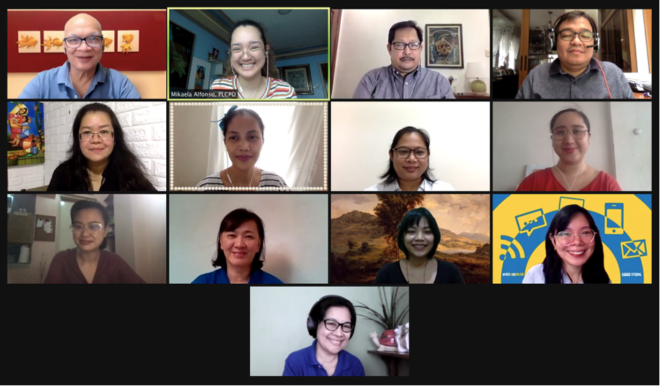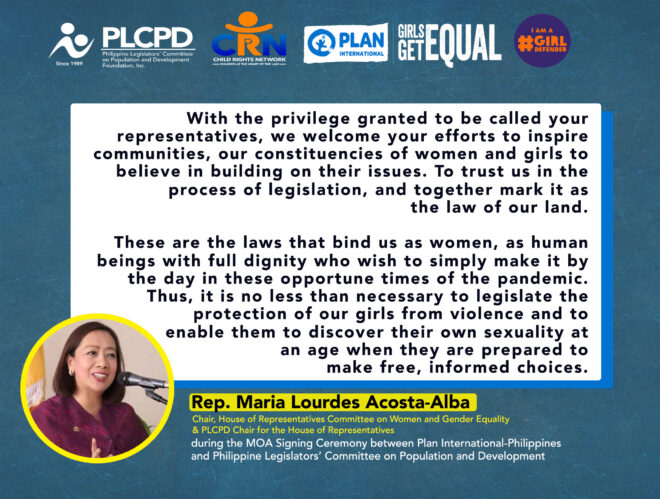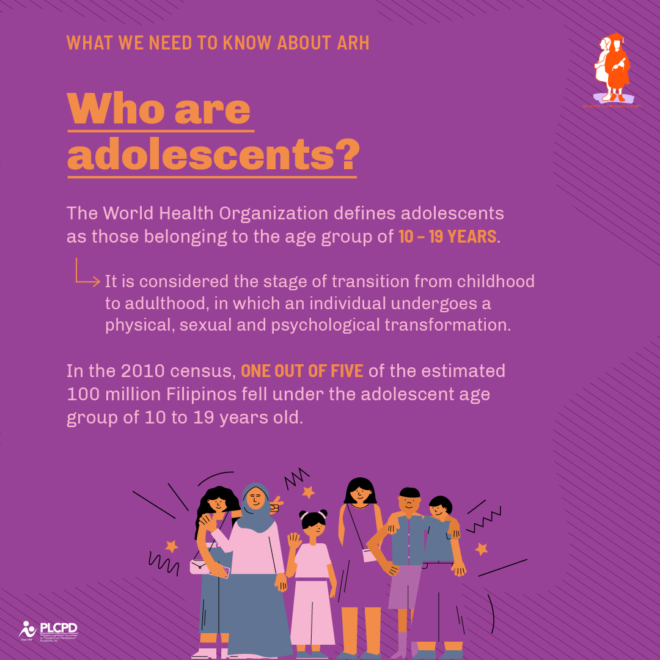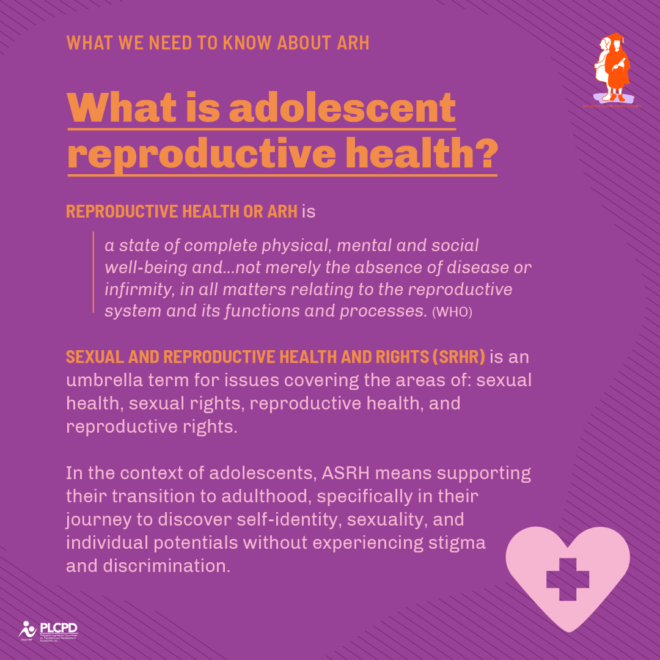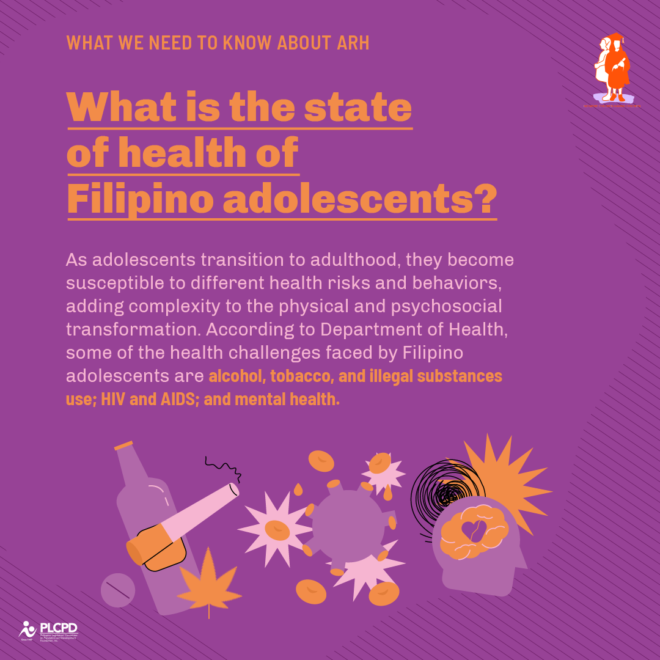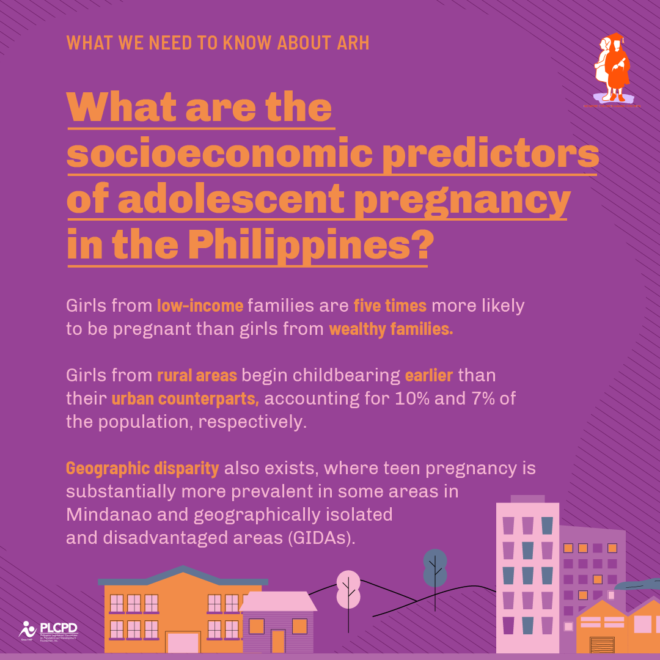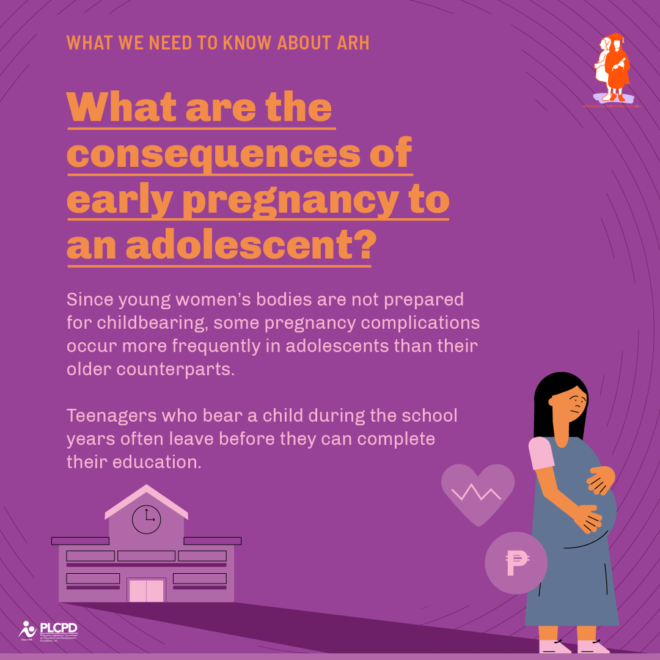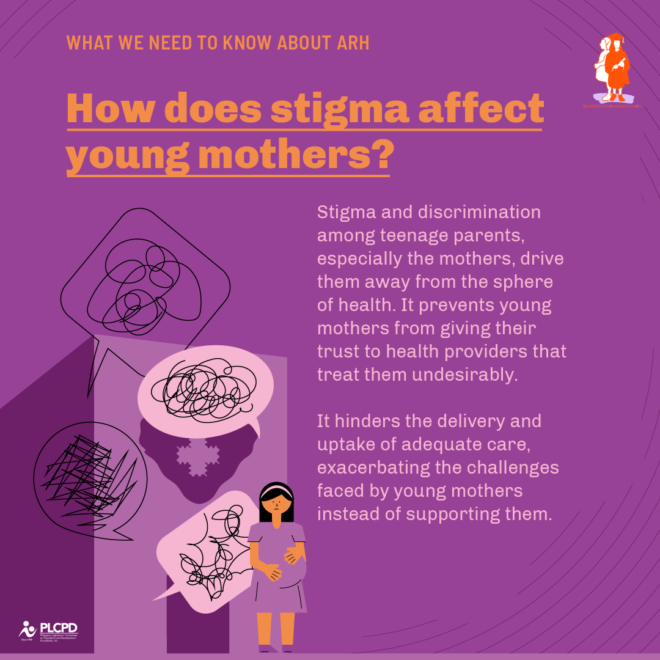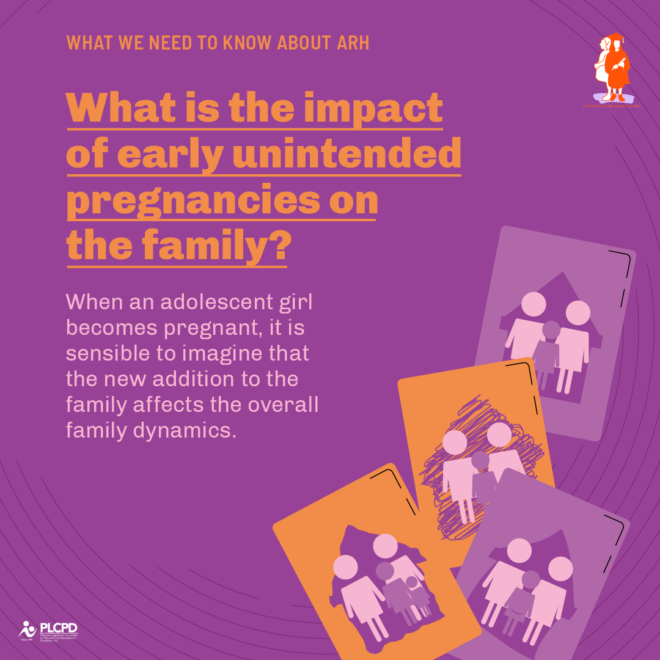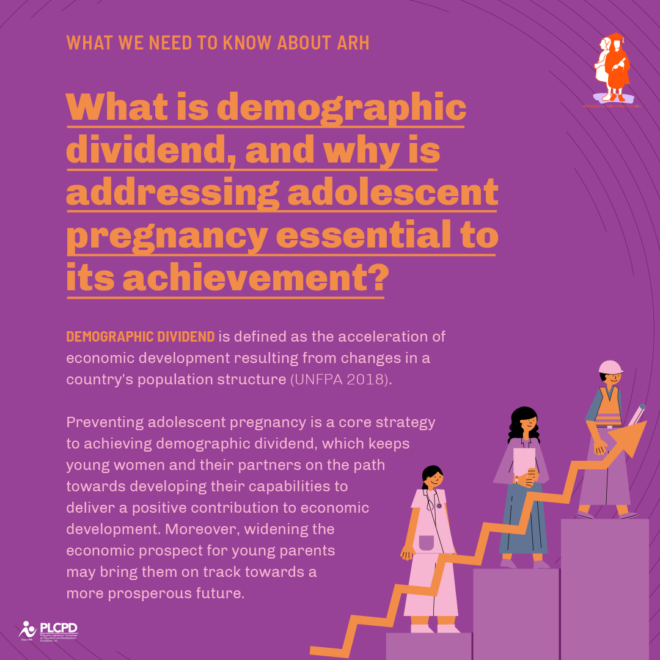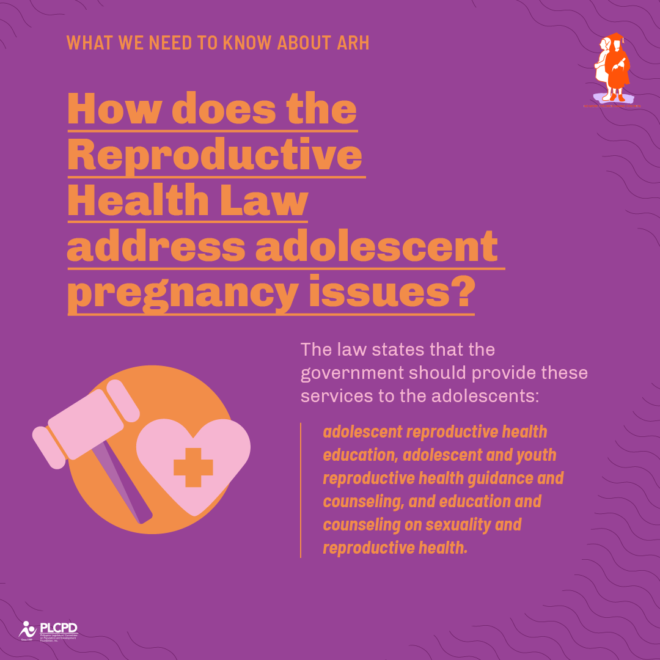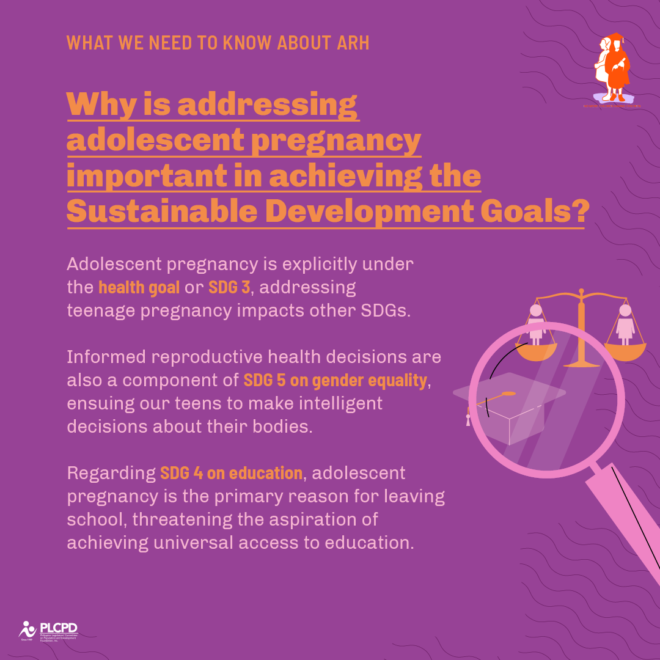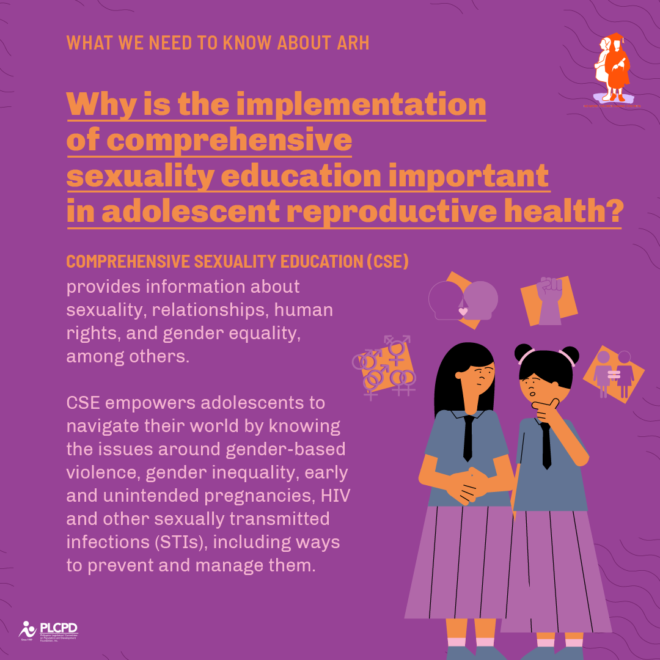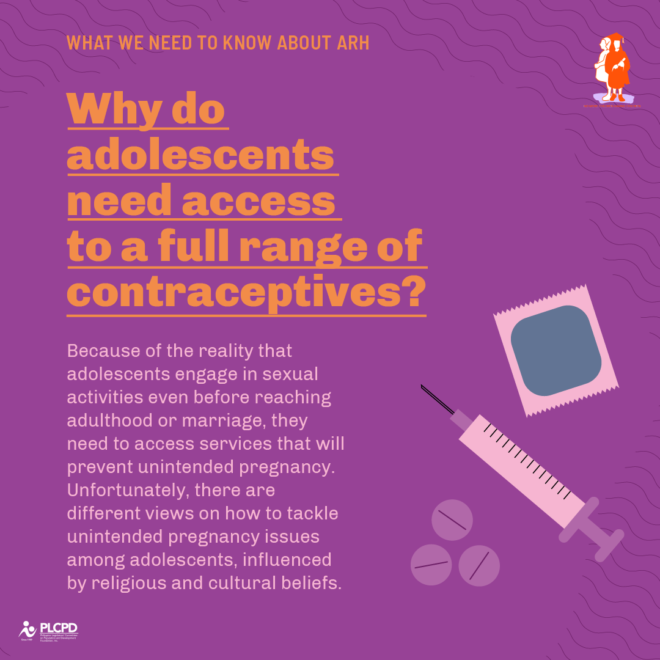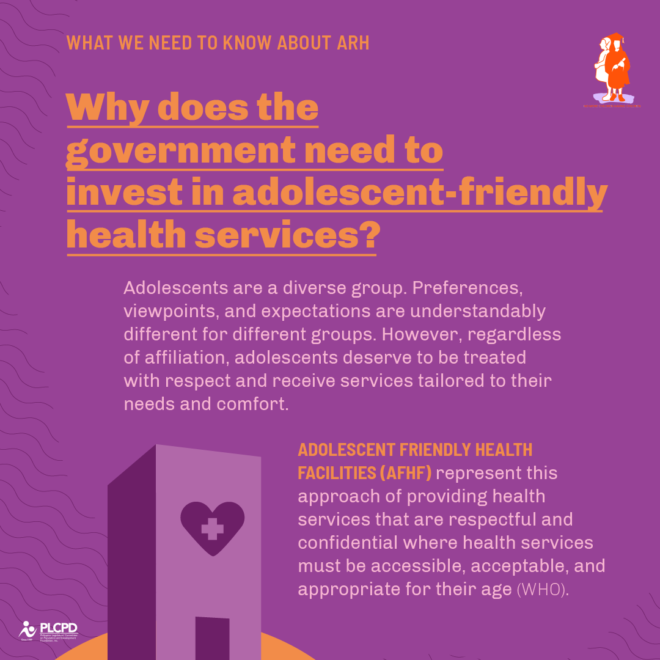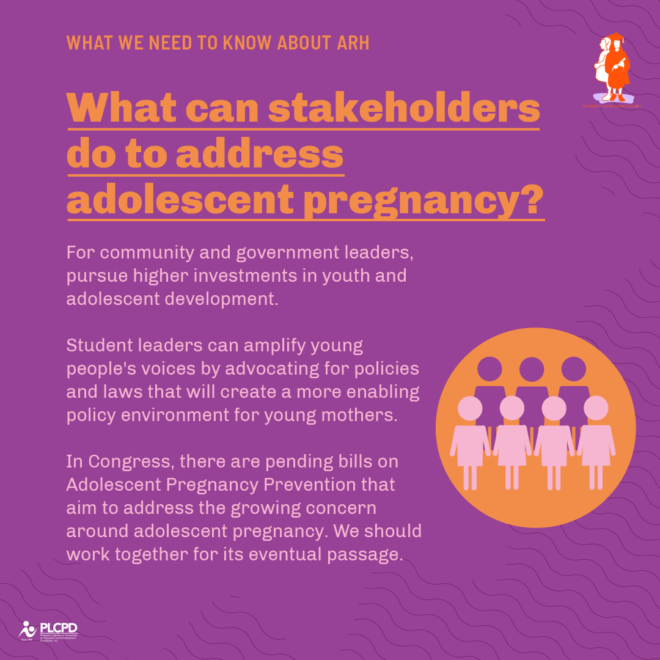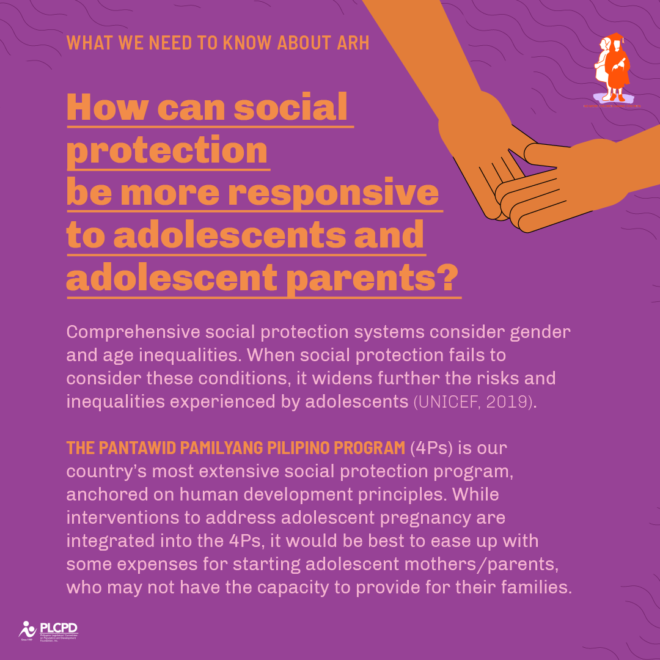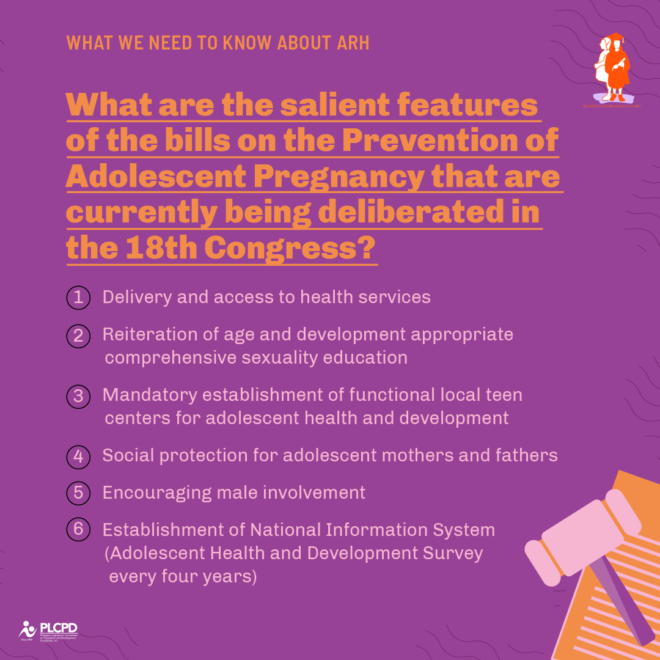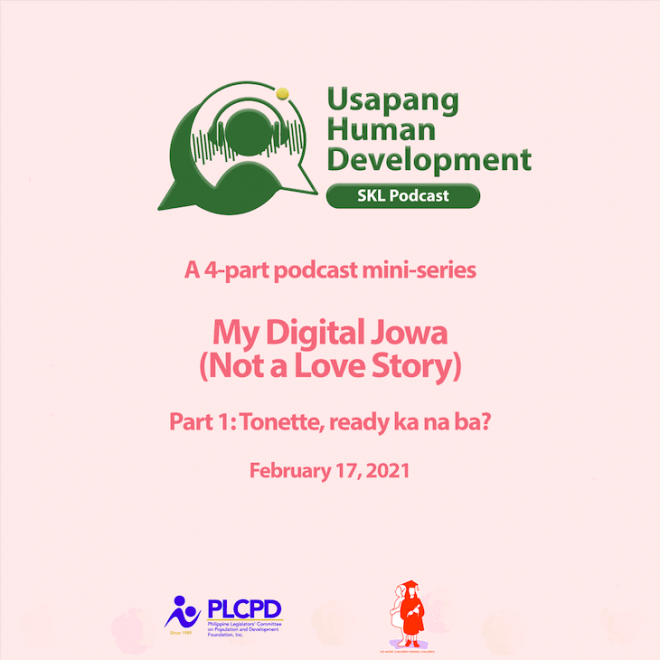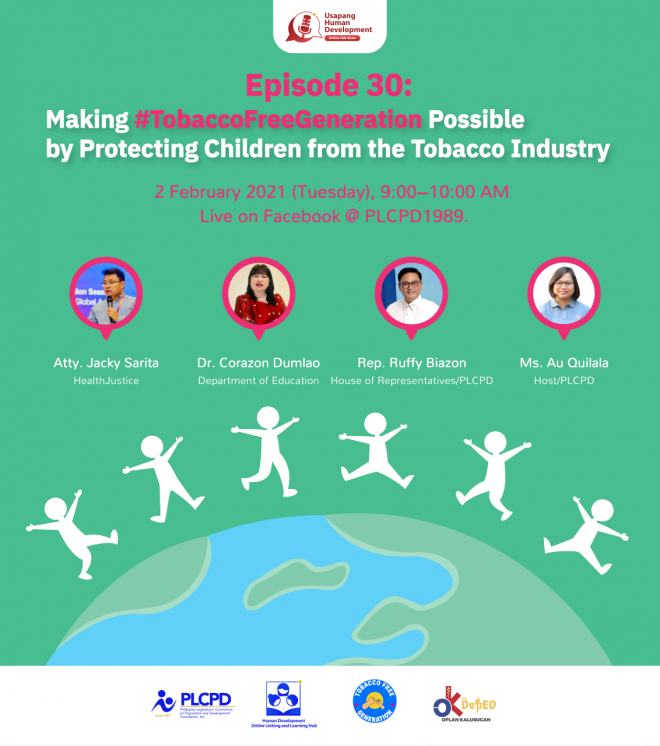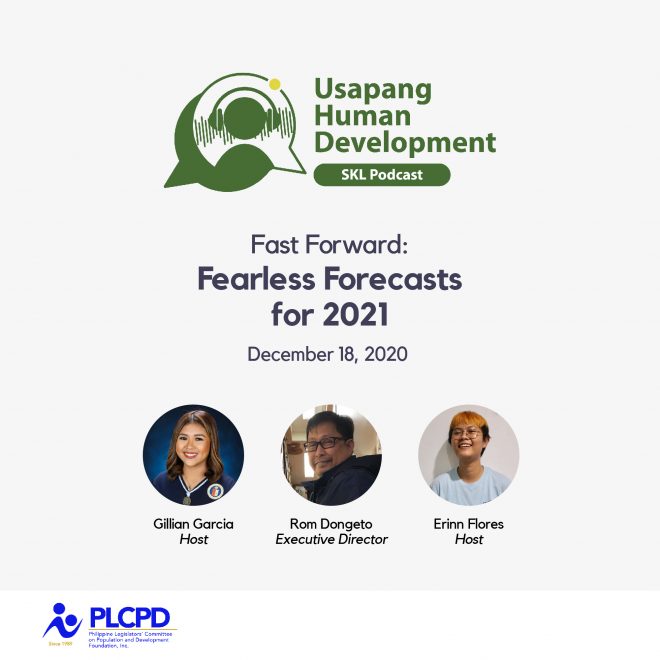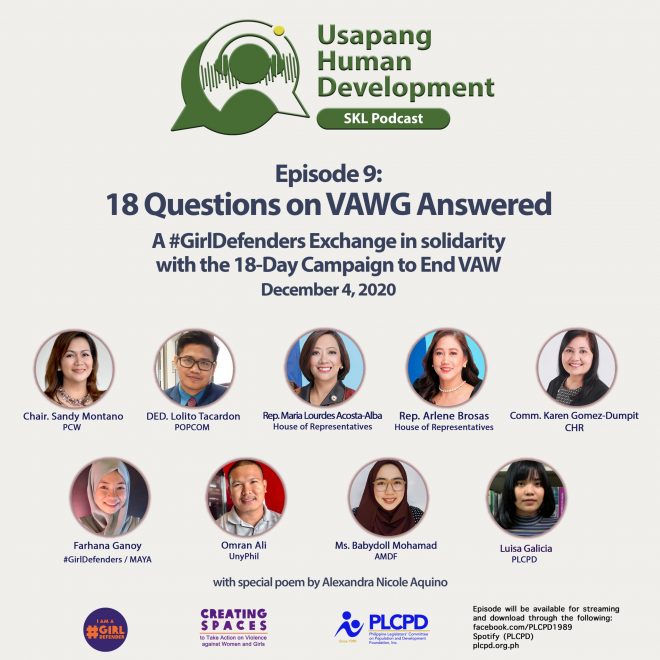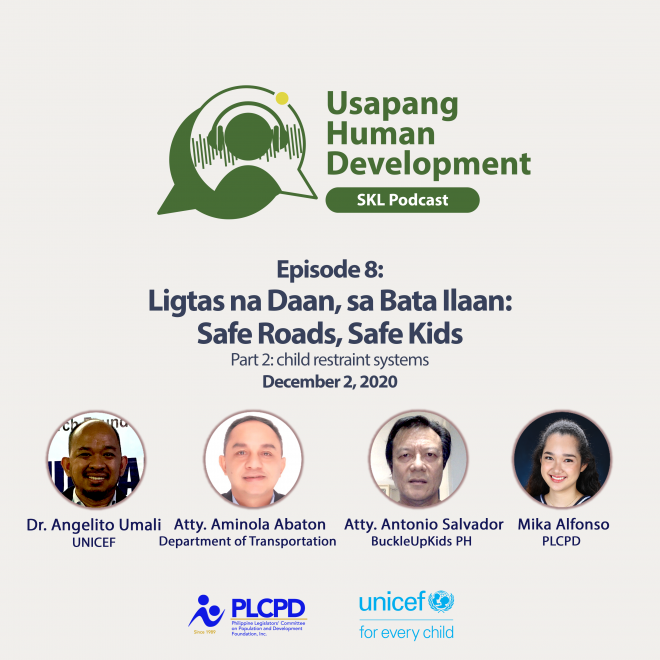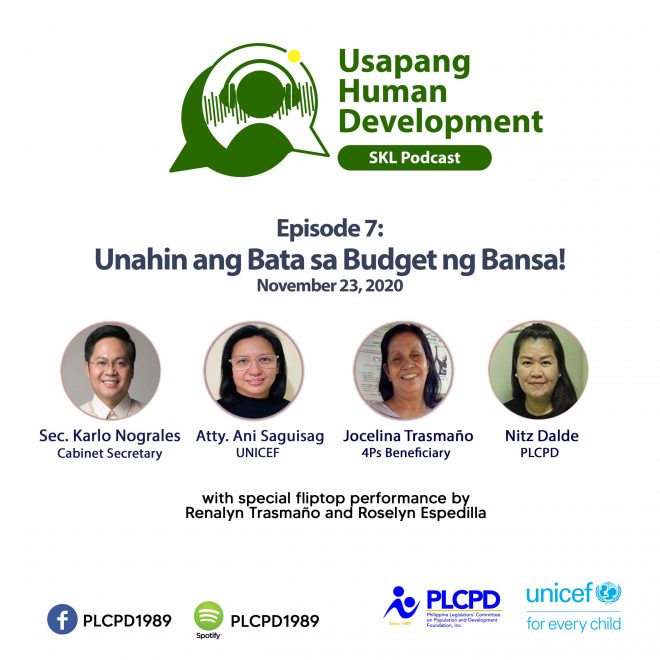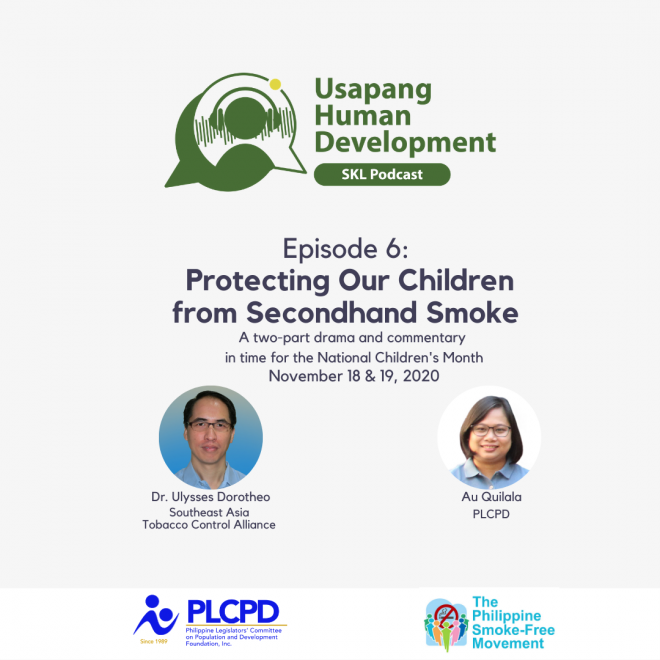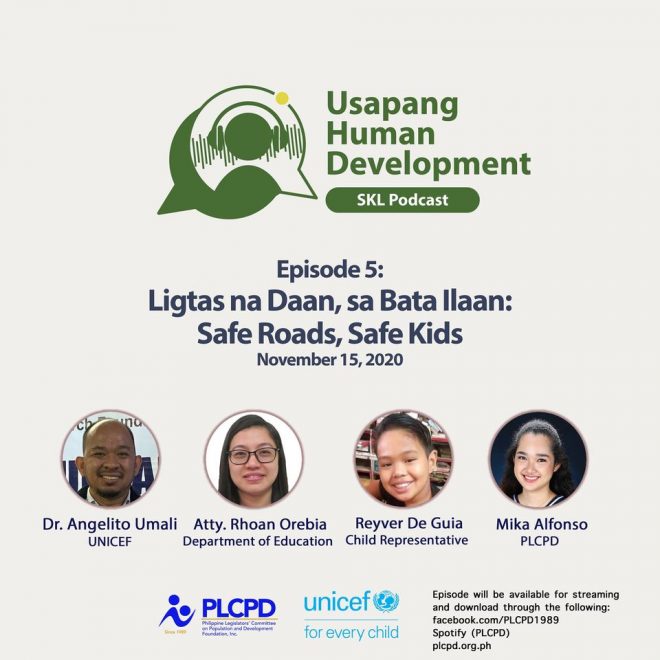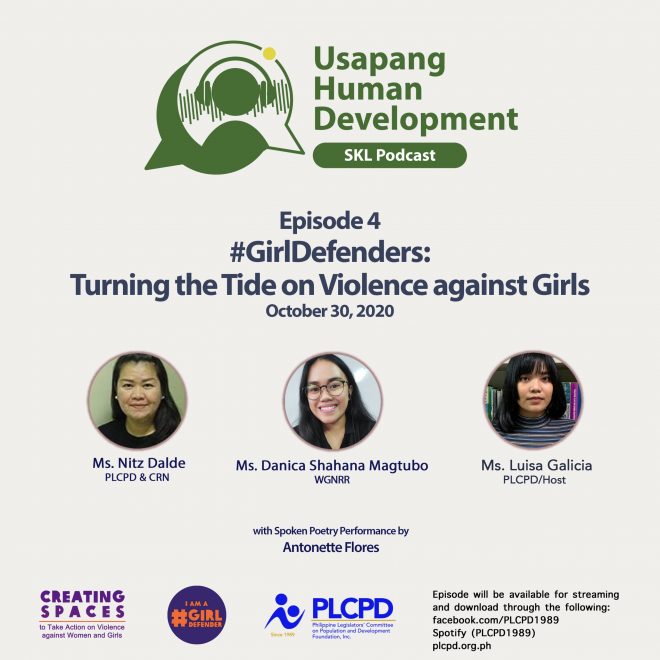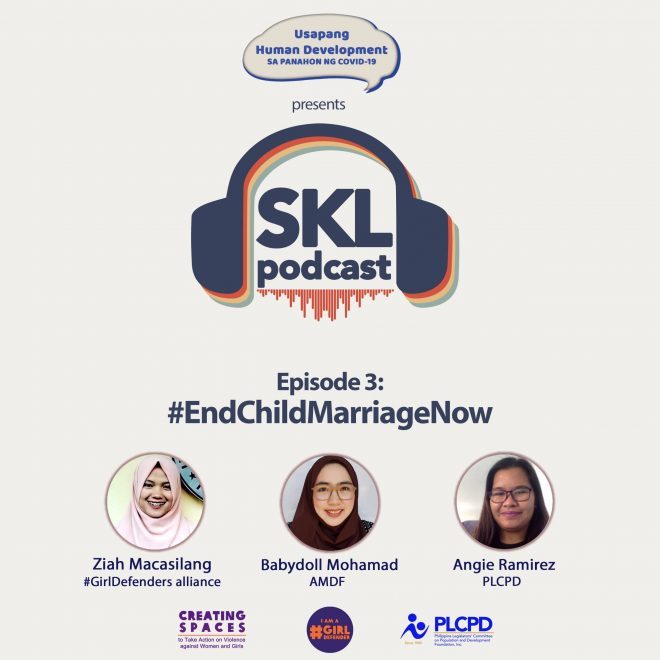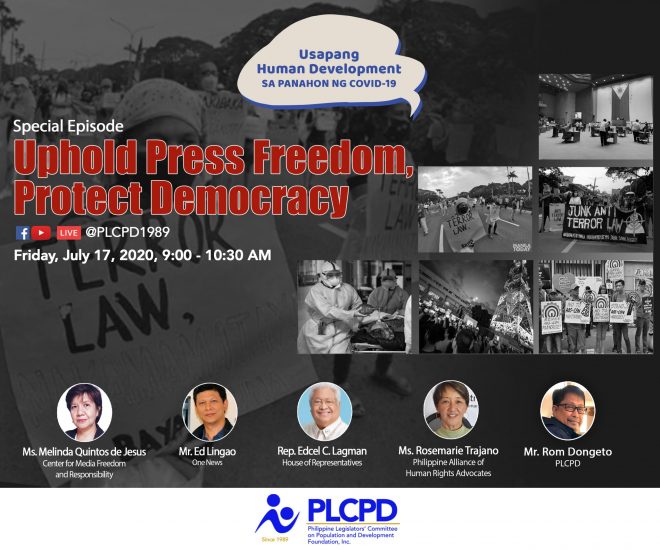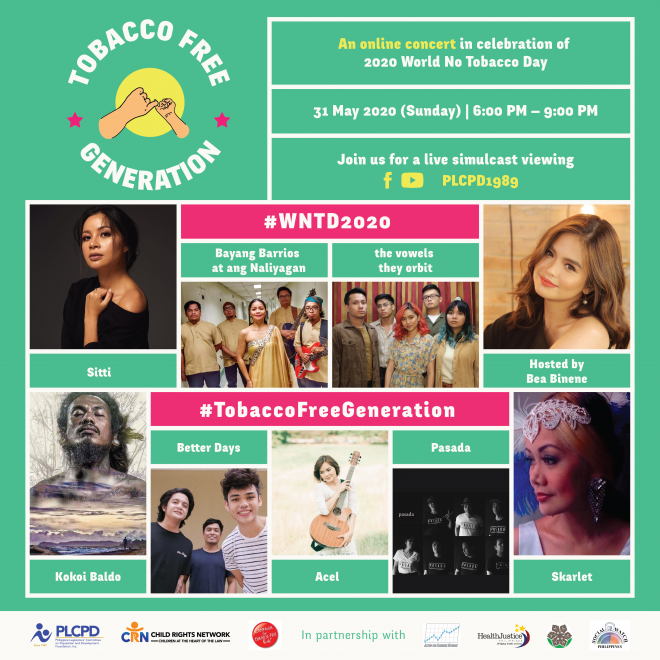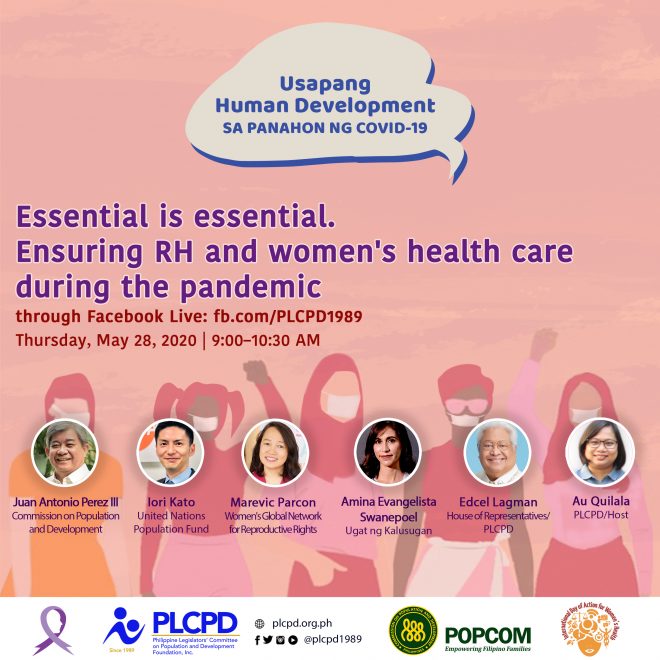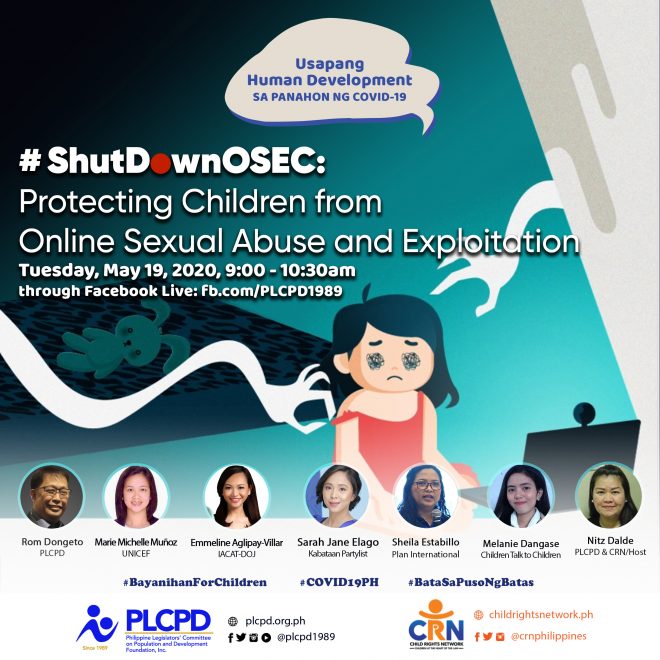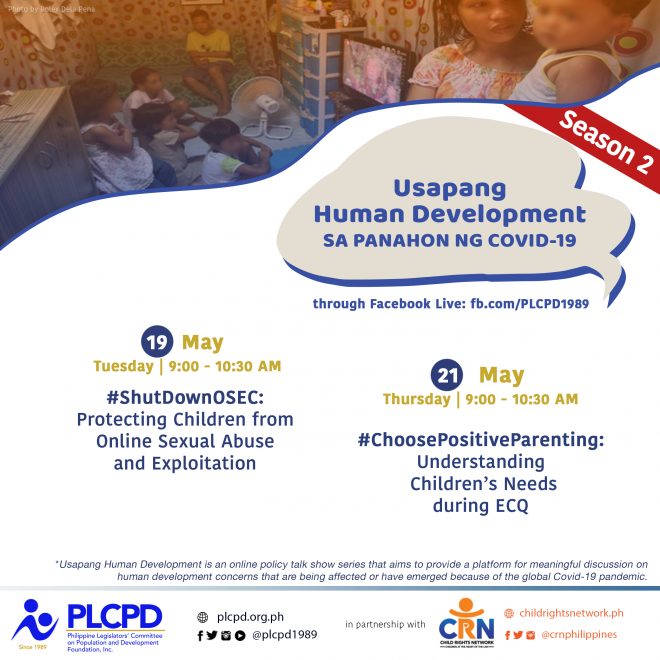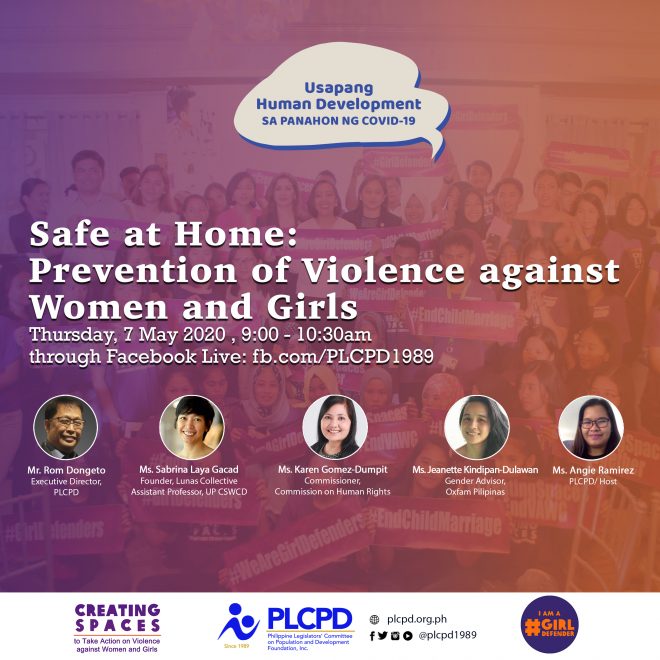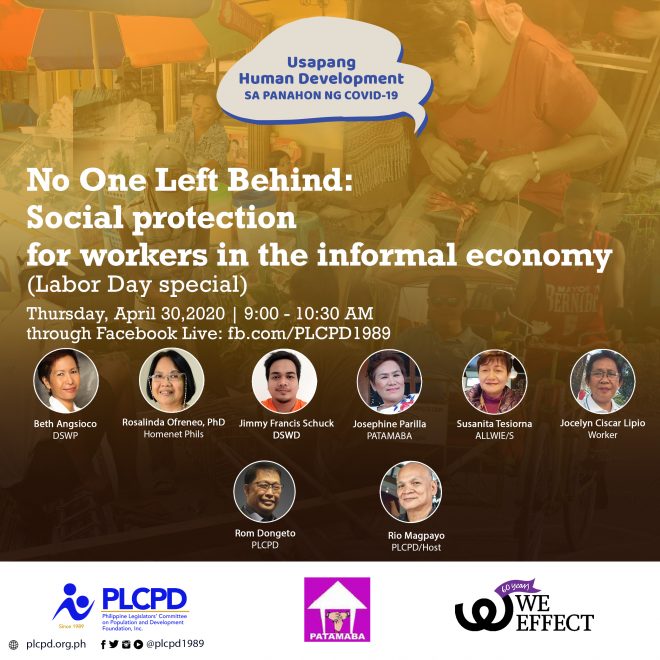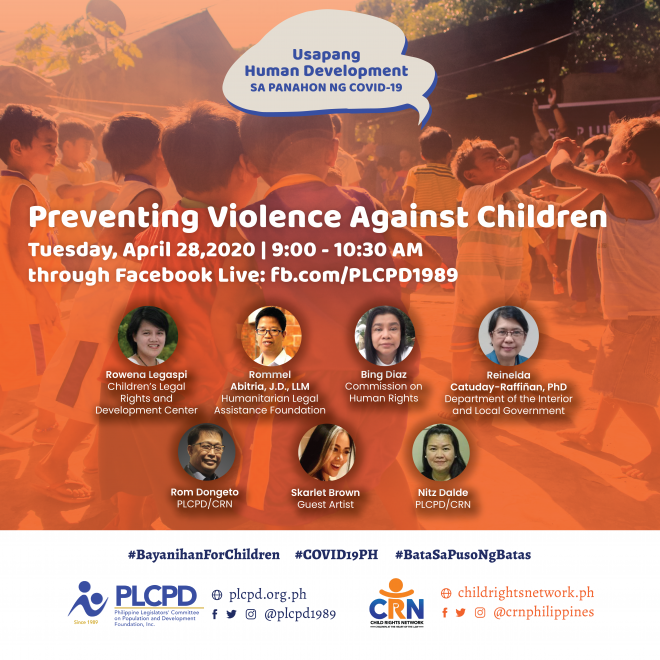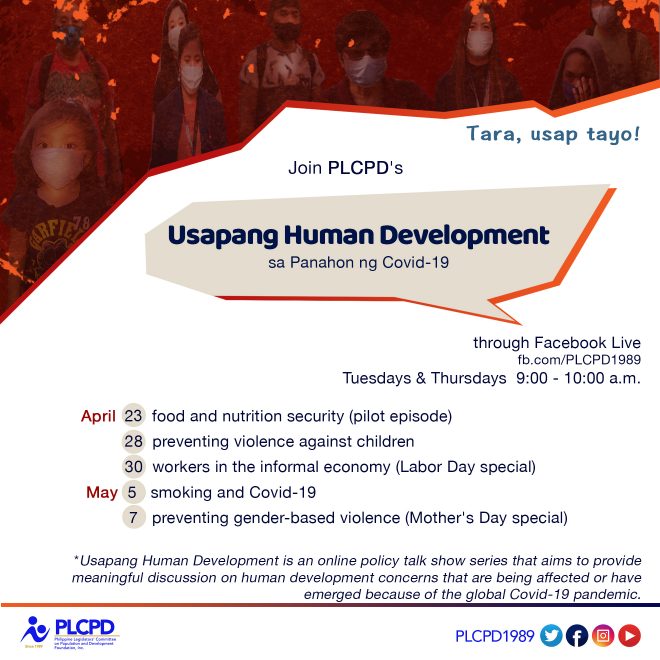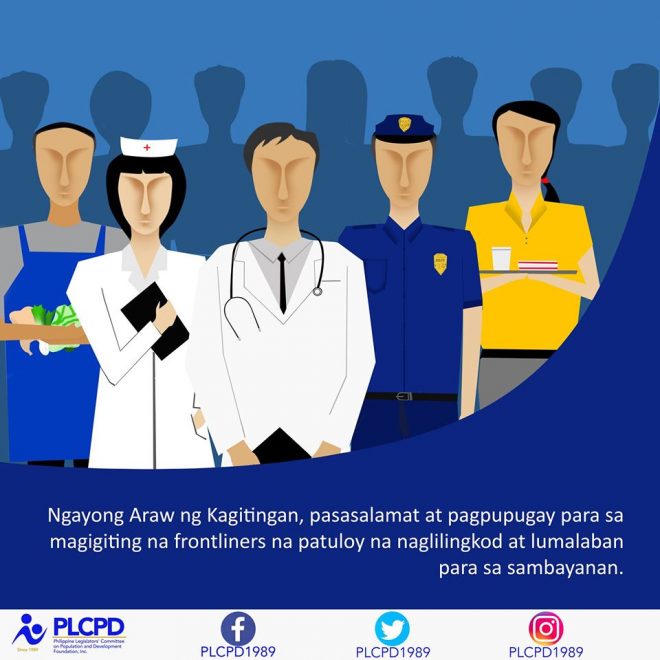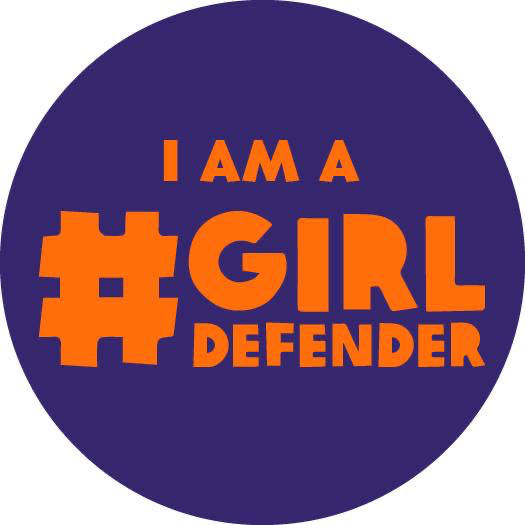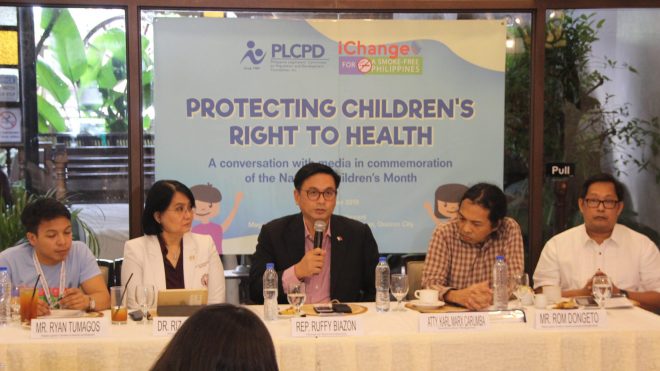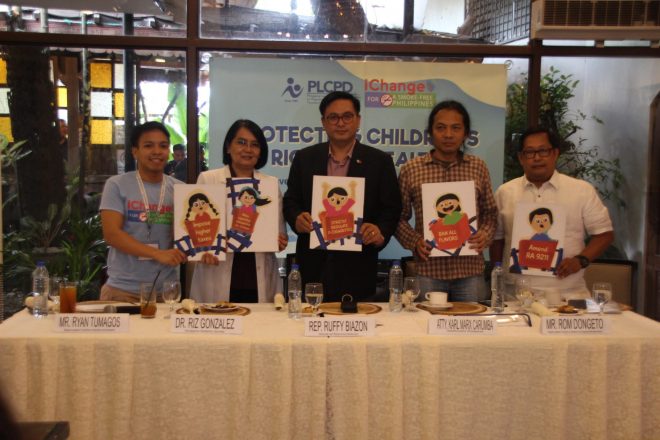Home
[toggle title=”PLCPD and Plan International – Philippines sustain partnership to ensure that children are #SafeEverywhere ” open=”true”]
The Philippine Legislators’ Committee on Population and Development (PLCPD) and Plan International – Philippines signed a Memorandum of Agreement for their continuing partnership for the protection of children from sexual violence online and offline.
A long-standing partnership for children’s rights
Held on April 15, the ceremonial signing did not only signal a new partnership but also became an opportunity to look back at the 14-year history of PLCPD and Plan’s cooperation toward the promotion and protection of children’s rights through legislative reforms. The two organizations have waged legislative advocacy and campaigns on issues such as banning of corporal punishment of children and promotion of positive discipline, retention of the minimum age of criminal responsibility at 15, increasing the age to determine statutory rape, prevention of online and offline sexual abuse and exploitation of children, and recently, ending child marriages, among others.
This year, the two organizations launched the #SafeEverywhere campaign, which aims to contribute to policy reforms toward ending child marriage and online sexual abuse and exploitation of children (OSAEC) in the Philippines.
Ending child marriage and OSAEC in the Philippines
The Philippines ranks 12th with the highest absolute numbers of child marriage cases globally. This means 726,000 children have been married as a child and 15% of Filipino girls being married before the age of 18 – resulting in school dropout, early childbearing, and increased risks for experience of any form of violence for girls. As such, there is moral imperative for legislators and child rights advocates to prioritize the passage of a national legislation that will penalize acts that allow child marriage. Senate has approved its version of the proposed measure and the House of Representatives (HRep) Committee on Women and Gender Equality is gearing up for the much-awaited deliberations.
Meanwhile, in a growing digital world, the Philippines became a global hotspot for acts of Online Sexual Abuse and Exploitation of Children (OSAEC) where child sexual abuse and exploitation materials are being sold all over the world. In 2019, the Department of Justice received 426,000 reports of OSAEC cases, but when the pandemic started, it increased to 1,297,00 reports. It is projected that there are more unreported cases. Without the policies and services that should protect children during a pandemic where the main drivers of these issues such as poverty is prevalent, these children are left vulnerable in the face of these acts of violence and abuse.
In her message during the ceremonial signing, Rep. Maria Lourdes Acosta-Alba, Chair of House of Representatives Committee on Women and Gender Equality (CWGE) and PLCPD’s Chair for the HRep, assured both organizations of the commitment of (CWGE) and the Committee on the Welfare of Children, which list child marriage and OSAEC among their respective committees’ priority bills in the 18th Congress.
“With the privilege granted to be called your representatives, we welcome your efforts to inspire communities, our constituencies of women and girls to believe in building on their issues. To trust us in the process of legislation, and together mark it as the law of our land.” Rep. Acosta-Alba remarked.
Existing networks and partnerships of both organizations working on the campaigns to end child marriage and OSAEC such as the Child Rights Network, #GirlDefenders Alliance, and the Girls Get Equal campaign are also part of this new cooperation.
PLCPD Executive Director Mr. Romeo Dongeto and PLAN International Philippines Country Director Ms. Ana Maria Locsin shared their hopes and common vision toward a future for children safe from all forms of violence, online and offline.
The #SafeEverywhere campaign was officially launched on March 23 during a special episode of PLCPD’s Usapang Human Development online talk show.
[/toggle]
[toggle title=”What We Need to Know about Adolescent Reproductive Health ” open=”true”]
Who are the Filipino adolescents? What are their specific reproductive health needs? How can we respond to these needs?
A more detailed primer on adolescent pregnancy is also available for download here.
[/toggle]
[toggle title=”SKL Podcast Episode 12: The State and Future of Philippine Aquaculture ” open=”true”]
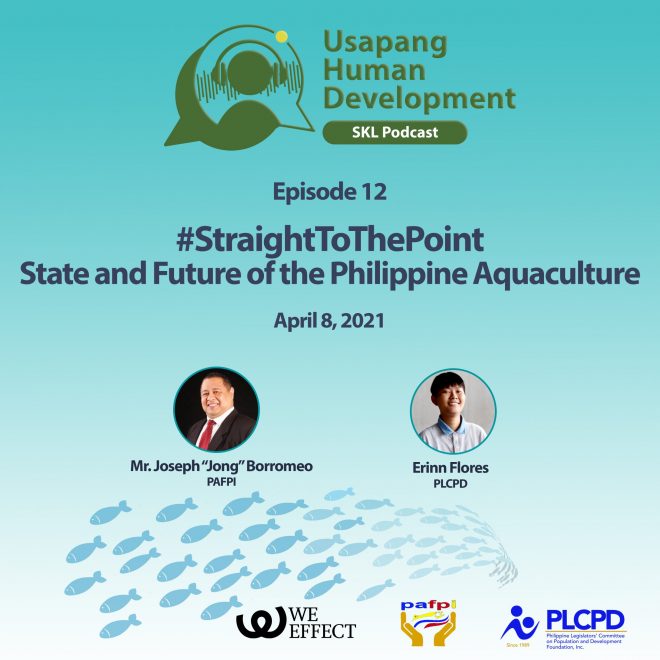 In 2019, the Philippine aquaculture’s production volume was 53.41% of the total fish production. While there is so much potential and competition in our aquaculture, the industry in “underrated,” according to Mr. Joseph “Jong” Borromeo, National President of the Philippine Association of Fish Producers, Inc., who sits down with PLCPD advocacy officer Erinn Flores to discuss the current state of the Philippine aquaculture industry and the future of our blue economy.
In 2019, the Philippine aquaculture’s production volume was 53.41% of the total fish production. While there is so much potential and competition in our aquaculture, the industry in “underrated,” according to Mr. Joseph “Jong” Borromeo, National President of the Philippine Association of Fish Producers, Inc., who sits down with PLCPD advocacy officer Erinn Flores to discuss the current state of the Philippine aquaculture industry and the future of our blue economy.
This episode is available for download here and for streaming on our Spotify channel.
[/toggle]
[toggle title=”Creating Smoke-Free Environments ” open=”true”]
This fact sheet, available for download here, is a condensed version of this primer on creating smoke-free environments.
[/toggle]
[toggle title=”Unahin ang Bata sa Budget ng Bansa ” open=”true”]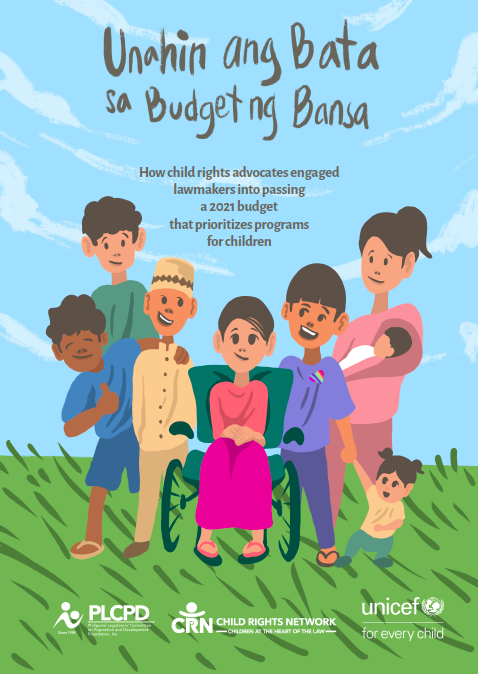 How can every Filipino engage in the budget process? Read this briefing packet, “Unahin ang Bata sa Budget ng Bansa: How child rights advocates engaged lawmakers into passing a 2021 budget that prioritizes programs for children.”
How can every Filipino engage in the budget process? Read this briefing packet, “Unahin ang Bata sa Budget ng Bansa: How child rights advocates engaged lawmakers into passing a 2021 budget that prioritizes programs for children.”
This briefing packet is a documentation of our budget advocacy experience for the 2021 GAA. The simplified graphics shows access points for budget advocacy and how every Filipino can engage in the process. We hope that this material will encourage more children to participate in budget deliberations.
This material is available for download here.
[/toggle]
[toggle title=”Usapang Human Development Episode 31: Empowering women and girls, one law at a time ” open=”true”]
[/toggle]
[toggle title=”National Fisheries Summit on March 26, 2021 ” open=”true”]
It’s time to create the Department of Ocean, Fisheries and Aquatic Resources!
Join us on March 26, 2021 (Friday), 9:00AM – 12:00 NN, as we make history! More than 200 fisherfolk leaders will gather with representatives from the academe, Congress and the executive branch to discuss the most pressing issues of the country’s fishing industries, especially our coastal and marine fisheries.
Register now through this link.
There will also be a livestream of the Summit via @PLCPD1989 Facebook page and Youtube Channel, as well as on @WeEffectPH, @kabayanpartylist, and @HouseofRepsPH Facebook pages. Invite your friends to watch!
#NFS2021 #DOFARNow
[/toggle]
[toggle title=”#GirlDefenders Speak Out to #EndChildMarriage: A Zoomlidarity Rally ” open=”true”]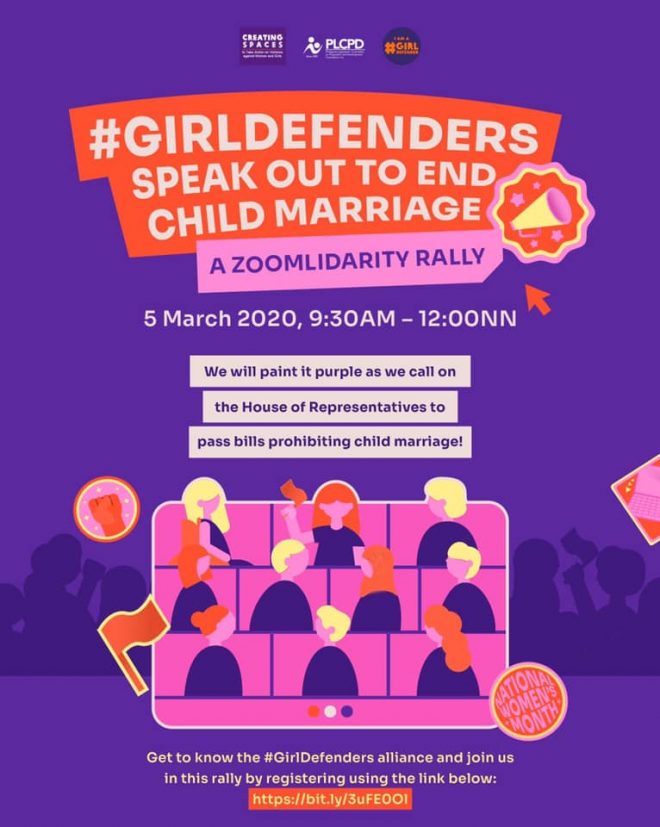
In an impassioned plea to members of the House of Representatives, particularly the members of the Committee on Justice, women’s rights and child rights advocates called for the urgent deliberation and passage of bills that seek to prohibit the practice of child marriage.
The call was delivered during an online ‘zoomlidarity’ rally dubbed #GirlDefenders Speak Out to End Child Marriage, which gathered more than a hundred advocates not only from the National Capital Region but also from the Bangsamoro; government officials including the Department of Social Welfare and Development, Department of Education, Commission on Human Rights, Philippine Commission on Women, and the Commission on Population and Development; and authors and supporters of the bill, namely Deputy Speaker Bernadette Herrera, Rep. Maria Lourdes Acosta-Alba, and Rep. Sarah Elago. Other bill authors, Sen. Risa Hontiveros and Rep. Alfred Vargas, expressed solidarity via recorded video messages.
“Legislators must recognize the urgency of this issue. Every single day that this law is not passed means girls being forced into marriage and risks of a vicious cycle of violence. We call on the House of Representative to begin deliberation on this bill and give it a chance to be heard by the plenary,” said Rom Dongeto, executive director of the Philippine Legislators’ Committee on Population and Development (PLCPD), organizer of the #GirlDefenders Alliance and convenor of the Child Rights Network.
Child marriage in the Philippines
According to UNICEF, the Philippines is ranked 12th in the world in terms of absolute number of child brides. Data from the 2017 National Demographic and Health Survey (NDHS) reveal that one out of six Filipina girls are married before they turn 18.
Child marriage, which is both a health and human rights issue, undermines the development of girls and results in early pregnancy that poses many physical and psychological challenges for young girls’ bodies due to childbirth complications. Child marriage usually happens alongside trafficking in women and girls, especially in regions with high incidence of poverty. In some areas in the Philippines, the practice is accepted as part of cultural tradition.
Although boys are also affected by child marriage, girls are disproportionately and more heavily impacted by this practice. Girls who become pregnant as a result of early marriage are forced to drop out of school which leads to their reduced employability. According to the PSA, “marriage and family matters” is the top reason for girls dropping out of school in the country. Young mothers are ostracized, stigmatized, and are consequently denied of many economic opportunities. Risks of experiencing physical, sexual, and emotional violence– even and especially during pregnancy– are also highest among married women aged 15-19, according to the 2013 and 2017 NDHS.
“Young girls, and boys alike, shouldn’t be forced to marry at a very young age. The fact that this is happening in our country should push us to do our part in ensuring that children are protected from all forms of abuse–physical, sexual, emotional, and psychological, which are all existent in child marriages,” added Dongeto.
Push for legislation to ban child marriage in the country
In November 2020, the Senate approved on Third and Final Reading Senate Bill 1373, which criminalizes the facilitation of child marriage. This bill, authored by Senator Hontiveros, defines child marriage as “any marriage entered into where one or both parties are below 18 years of age.”
In the House of Representatives, there are four versions of the bill: House Bill (HB) 1486 filed by Deputy Speaker Bernadette Herrera and Rep. Edcel Lagman, HB 3899 filed by Rep. Alfred Vargas, HB 5670 filed by Rep. Josephine Veronique Lacson-Noel, and HB 7922 filed by Rep. Myra Joy Tambunting. There has been no action on the bills since they were filed in 2019. In the previous Congress, when the bill was first filed by Deputy Speaker Herrera in 2018, it did not progress in the legislative mill as well.
“We believe that there is an urgent need for a national law explicitly prohibiting child marriage and providing programs and services for prevention and response, to ensure that all Filipino children–boys and especially girls–will have the opportunity to grow and develop to their full potential, and the chance to decide when and with whom to marry,” said Herrera.
Once passed into law, a person who causes, fixes, facilitates, or arranges a child marriage shall be considered as responsible for “acts of neglect, abuse, cruelty, or exploitation, and other conditions prejudicial to the child’s development” and shall be punished under Republic Act 7610, or the Special Protection of Children against Abuse, Exploitation and Discrimination Act.
[/toggle]
[toggle title=”#GirlDefenders commemorate National Women’s Month 2021 ” open=”true”]
[toggle title=”February 26, 2021: Online youth consultation and rally in support of the Adolescent Pregnancy Prevention Bill ” open=”true”]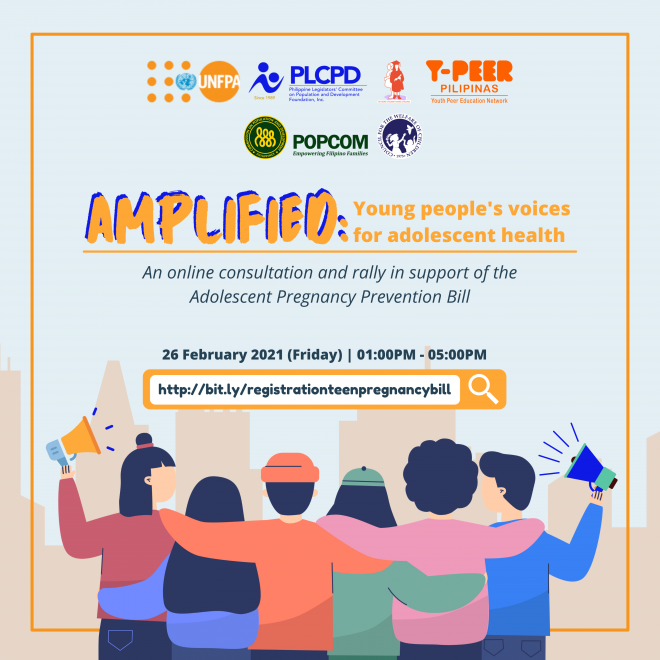
Register here to participate.
[/toggle]
[toggle title=”SKL Podcast: My Digital Jowa (Not a Love Story) ” open=”true”]
What will Tonette tell Joshua? Will she give in pressure or will she stand her ground?
In this series finale, UNFPA Philippines Comprehensive Sexuality Education (CSE) coordinator Lav Oliveros joins PLCPD’s Au Quilala for a discussion on the key takeaways from Tonette’s story.
This episode is available for download here and for streaming on our Spotify channel.
Join the conversation on adolescent reproductive health live by participating in “Amplified: Young Voices for Adolescent Health,” an online youth consultation and rally in support of the Adolescent Pregnancy Prevention Bill. This will be on Friday, February 26, at 1:30 PM. To register, go to bit.ly/registrationteenpregnancybill.
[/toggle]
[toggle title=”SKL Podcast: My Digital Jowa (Not a Love Story) ” open=”true”]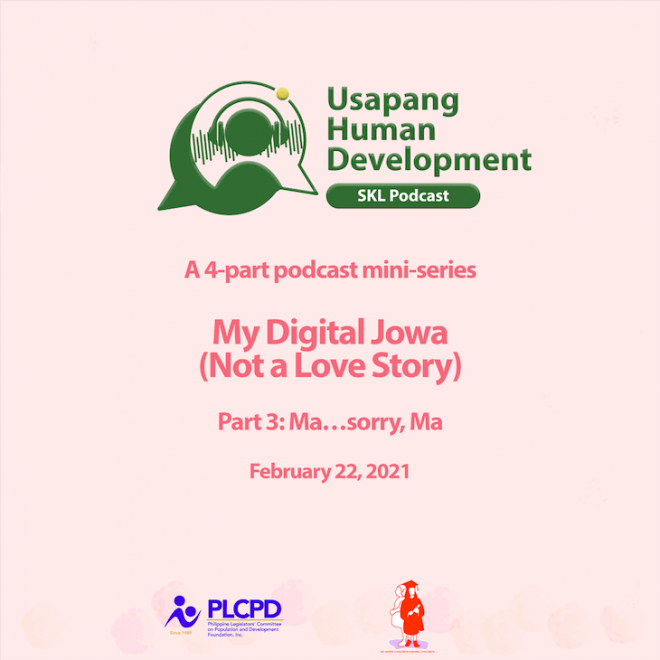 Tonette’s parents discover that she bought condoms and this sparks a conversation… A new character offers her two cents.
Tonette’s parents discover that she bought condoms and this sparks a conversation… A new character offers her two cents.
Join Tonette in My Digital Jowa (Not a Love Story), a four-part series that follows her adventures (and misadventures) as she goes through this tricky, confusing but exciting and transformative stage in her life. This is PLCPD’s Valentine’s Month offering, which we hope will help raise awareness on adolescent sexuality and reproductive health. The episodes will air on February 17, 19, 22, and 24.
This episode is available for download here and for streaming on our Spotify channel.
[/toggle]
[toggle title=”SKL Podcast: My Digital Jowa (Not a Love Story) ” open=”true”]
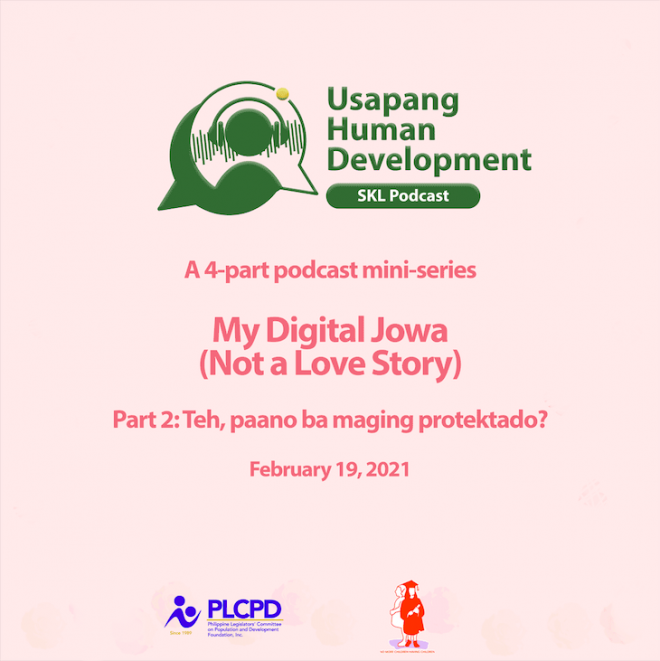 Tonette goes out to buy some condoms while in disguise. In the convenience store, she meets a friend from long ago…
Tonette goes out to buy some condoms while in disguise. In the convenience store, she meets a friend from long ago…
Join Tonette in My Digital Jowa (Not a Love Story), a four-part series that follows her adventures (and misadventures) as she goes through this tricky, confusing but exciting and transformative stage in her life. This is PLCPD’s Valentine’s Month offering, which we hope will help raise awareness on adolescent sexuality and reproductive health. The episodes will air on February 17, 19, 22, and 24.
This episode is available for download here and for streaming on our Spotify channel.
[/toggle]
[toggle title=”PLCPD amplifies calls to address adolescent pregnancies, sexual abuse of children ” open=”true”]
Teenage pregnancy, unintended births, and physical violence are among the top concerns of women during the pandemic, according to a survey by the Social Weather Stations (SWS).
In an online press conference on Wednesday, SWS presented the results of the survey commissioned by the Commission on Population and Development (POPCOM) and conducted in November 2020 among adults. The results of the nationwide survey reveal that 59% of the respondents said teenage pregnancy is the most pressing problem of women today, followed by physical violence (11%), unintended pregnancy (11%), and sexual violence (7%).
Data from the civil registry on pregnancy of very young adolescents in 2019 were released last week. According to the Philippine Statistics Authority through POPCOM, 62,510 children gave birth in 2019. Of these, seven very young adolescents or those between 10-14 years gave birth per day, or a total of 2,411 for the year.
“This should be a wake-up call to the government. The recent data force us to examine and ask the government to explain why children in the Philippines are having children. Looking closely, we know that it is not simply because these children, particularly the very young adolescents, have chosen to have consensual sex,” said Romeo Dongeto, executive director of the Philippine Legislators’ Committee on Population and Development (PLCPD).
“The government itself, through the NEDA [National Economic and Development Authority], has called teenage pregnancy a national social emergency. We call on our lawmakers and concerned government agencies to respond to it as such. This is compounded by the Covid-19 pandemic, which increases the vulnerabilities of everyone, especially women and children,” added Dongeto.
According to a study by the University of the Philippines Population Institute and UNFPA, teenage pregnancy in the country could increase by an additional 18,000 last year as a result of barriers to services because of Covid-19 restrictions. The study also projected that intimate partner violence – physical or sexual – could also increase by 20%, although many cases of gender-based violence remain unreported.
PLCPD, POPCOM, and other partners in the government and civil society launched the No More Children Having Children campaign in 2019 to call on Congress to pass the Adolescent Pregnancy Prevention Act. Currently under the Period of Interpellation in the Senate and awaiting committee action at the House of Representatives, the bill provides access of minors to reproductive health services including modern family planning methods, comprehensive sexuality education, establishment of adolescent-friendly health facilities, and social protection for adolescent mothers and fathers.
The No More Children Having Children campaign also calls for the full implementation of the Reproductive Health Law (Republic Act 10354), which mandates comprehensive sexuality education.
PLCPD and its partners also support the movement of related legislation in both houses of Congress, including the prohibition of child marriage in the country, and raising the age to determine statutory rape from below 12 to below 16.
[/toggle]
[toggle title=”SKL Podcast: My Digital Jowa (Not a Love Story) ” open=”true”]
Tonette, a 16-year-old girl, faces a dilemma as her anniversary with online boyfriend Joshua approaches. Is she ready to do it with Joshua? How can she be prepared for it…and its consequences?
Join Tonette in My Digital Jowa (Not a Love Story), a four-part series that follows her adventures (and misadventures) as she goes through the tricky, confusing but exciting and transformative stage in her life. This is PLCPD’s Valentine’s Month offering, which we hope will help raise awareness on adolescent sexuality and reproductive health. The episodes will air on February 17, 19, 22, and 24.
This episode is available for download here and for streaming on our Spotify channel.
[/toggle]
[toggle title=”Urgent action is needed as the number of very young adolescents getting pregnant increases ” open=”true”]
Seven young adolescent girls aged 10-14 years old gave birth per day in 2019.
The Philippine Statistics Authority has announced that births among young adolescent girls below 15 years old went up by 7% compared to 2018. While the total number of Filipino children who became mothers in 2019 increased slightly to 62,510 from 62,341 in 2018.
The Commission on Population and Development (POPCOM) has also warned that this is the ninth year since 2011 that this figure has continued to rise.
This alarming rate would be unchanged and could even increase during the pandemic.
According to the University of the Philippines Population Institute and UNFPA, teenage pregnancy in the country may increase by an additional 18,000 as a result of barriers to services because of COVID-19 restrictions. In addition, the unmet need for family planning can increase to 2.07 million by the end of 2020, having a 67% increase compared to 2019.
Sen. Risa Hontiveros, author of Senate Bill 1334 or the Prevention of Adolescent Pregnancy Bill, calls for an immediate action on the issue. “If the increase of the teenage pregnancies cases will not be resolved, it will add more burden to our healthcare system, our economy and in the long-run, our plans for the next generation,“ Hontiveros said in a separate statement.
With the enactment of SB 1334, young people, especially women, will have greater access to services and programs to educate and motivate them to pursue safe, progressive and healthy lifestyles. “Let our children be children and to allow them to grow and fulfill their full potential,” she added
“Teenage pregnancy takes away the future of our young girls and restricts them to reach their full potential and make decisions that affect their own lives. Moreover, challenges like this are made more stark in times of crisis like the present pandemic. We owe it to our young girls to give them a better future, to give them a life with dignity where their choices are respected,” said Rep. Maria Lourdes Acosta-Alba, author of House Bill 6528, the counterpart bill at the House of Representatives.
“PLCPD calls on both houses of Congress for urgent action on this issue by deliberating and voting on the bill. We cannot leave young people in the dark. We have to ensure that they have both the correct information and appropriate services on reproductive health. In addition, we also call for the full implementation of the Reproductive Health Law, particularly the comprehensive sexuality education, to guide our young people to make informed decisions,” added Rom Dongeto, PLCPD executive director.
Currently, there are seven bills awaiting committee action at the House of Representatives while the bill in the Senate is already under the Period of Interpellation. The salient features of the different bills include:
- Development of an age-appropriate comprehensive sexuality education responding to the information needed about sexuality, relationships, human rights and gender equality.
- Accessibility to a full range of family planning services, including modern contraception
- Promotion and establishment of adolescent friendly health facilities
- Inclusion of adolescent mothers and fathers in social protection schemes.
Acosta-Alba and Hontiveros, PLCPD co-chairpersons, chair the respective Committees on Women and Gender Equality in the House of Representatives and in the Senate. PLCPD is an advocacy group pushing for laws on reproductive health, women’s rights, and children’s rights, among others.
[/toggle]
[toggle title=”#GirlDefenders #ChooseToChallenge Digital Poster-Making Contest ” open=”true”]
Check our Facebook page for more details.
[/toggle]
[toggle title=”Talkpoint: Fact Sheet on Electronic Nicotine Delivery Systems or E-Cigarettes ” open=”true”]
What are electronic nicotine delivery systems (ENDS) or electronic cigarettes? Why should they be heavily regulated? Read this fact sheet to know more about ENDS. The fact sheet is also available for download here.
[/toggle]
[toggle title=”Usapang Human Development Episode 30: Making #TobaccoFreeGeneration Possible by Protecting Children from the Tobacco Industry ” open=”true”]
This episode, featuring Atty. Jacky Sarita, Managing Director of Health Justice Philippines, Dr. Maria Corazon Dumlao of the Department of Education, and Rep. Ruffy Biazon of the Lone District of Muntinlupa City, discussed in-depth how the vision of a tobacco-free generation can be fulfilled.
The episode started with the presentation of numerous studies and data that detail how smoking poses major threats to the health and well-being of the country’s children and youth.
The World Health Organization (WHO) considers the Philippines as a high burden tobacco use country, with 16.6 M adults who use different tobacco products, and a significant number of Filipinos die every year due to diseases caused by smoking. This backdrop serves as a reminder that the youth are not spared from smoking. A global youth survey in 2015 mentioned that 16% of students 13-15 years old use tobacco products; 17.6 % of boys and 7% of girls, or 12% of students, use traditional cigarettes. Additionally, a study by the Food and Research Institute mentions that 1 in 5 vape users are adolescents below 20 years old.
On the ill effects of tobacco use on children and how it affects children’s school performance
DepEd’s Dr. Maria Corazon Dumlao stressed that tobacco use in children is alarming and challenging. She enumerated the harmful effects of smoking because of the toxic ingredients and thousands of chemicals present in cigarettes. She stated that DepEd in particular does not want our children and youth to be exposed to smoking, especially that children’s brains are still developing, and emphasized that nicotine leads to long-term brain changes resulting in addiction. Smoking also disrupts children’s brain functions because of the psychoactive substances in cigarettes. She added that there are numerous factors that may drive our youth to smoking like peer influence.
Addiction to other substances
Atty. Jak Sarita also emphasized the effects of tobacco use not only to the smokers but on those surrounding the smokers. He stressed that the health risks to those exposed to second-hand smoke are almost the same as the smoker. Children will suffer bronchitis, pneumonia, asthma attacks, and other respiratory discomforts just by being exposed to second-hand smoke. A study in 2000, he said, mentioned that smoking is a gateway to use illegal drugs: 65% of whoever smoked are more likely to use illegal drugs.
Social effects, effects on productivity
Rep. Ruffy Biazon for his part underscored the fact that smoking also affects the country’s productivity. A healthy population, he said, is a productive population, and health challenges translate to productivity issues.
Reforming the Tobacco Regulation Act of 2003
Rep. Biazon mentioned that the Tobacco Regulation Act of 2003 or Republic Act 9211 is a big leap to addressing issues on tobacco regulation. There are provisions, though, that are difficult to enforce, like ‘no sale to minors’. Atty. Jack added that restriction to minors is hard to monitor for LGUs. It’s a rather difficult task, he said. But he acknowledged the fact that RA 9211 provides for a considerable ban on tobacco advertisements, promotions, and sponsorships. He added that while we don’t see advertisements on billboards anymore generally because we have good outdoor advertising bans, we still see these advertisements in sari-sari stores, convenient stores, and malls. And that despite the ban, these stores are still allowed to advertise in point-of-sales. He said that pending the amendment of RA 9211, we have to consistently push for strong monitoring and enforcement of the advertisement ban at the local level.
For the conclusion part, Dr. Dumlao stressed the importance of sustained monitoring of initiatives that were carried out by field personnel. We should continue capacity building amidst evolving marketing strategies, she said.
Rep. Biazon encouraged all Filipinos to voice their opposition to the ill effects of tobacco. It is important, he said, that lawmakers are made aware of the people’s sentiments and demands.
Atty. Sarita ended his talk with a challenge to set a date to ending tobacco, emphasizing that when we say #TobaccoFreeGeneration, we have to set a target date to ensure this, and that although it may take a bit more time to fully realize this vision, we can teach our children to stay away from these products, and push for a generation who will stay away from tobacco products through effective communications strategy to counter the efforts of the tobacco industry to normalize smoking
Watch this episode on the Facebook pages of PLCPD and the Department of Education.
[/toggle]
[toggle title=”#TobaccoFreeGeneration slogan making contest on PLCPD’s Facebook page ” open=”true”]
[/toggle]
[toggle title=”Talkpoint: Fact sheet on the Bangsamoro Budget Process ” open=”true”]
What are the phases of the budget process in the Bangsamoro Autonomous Region in Muslim Mindanao (BARMM)? How does a budget proposal become a General Appropriations Act? Do citizens have a voice in where the money goes? This fact sheet is available for download here.
[/toggle]
[toggle title=”Every minute counts: An urgent call for the passage of the Adolescent Pregnancy Prevention bill ” open=”true”]
January 19, 2021
As Congress resumes its Second Regular Session this month, the Philippine Legislators’ Committee on Population and Development (PLCPD) calls on our lawmakers for the urgent movement and passage of the Adolescent Pregnancy Prevention Bills.
The National Economic and Development Authority (NEDA) has declared adolescent pregnancy as a national emergency. One in every 10 young women aged 15-19 years old is already a mother or pregnant with her first child. Among those aged 19 years old, one out of five are already mothers. The Commission on Population and Development also reported that 40 girls aged 10-14 give birth every week.
The impact of the limitations in reproductive health services as a result of lockdowns imposed during the Covid-19 pandemic is far-reaching. According to projections by UNFPA and the University of the Philippines Population Institute, there would be 18,000 more adolescent pregnancies in addition to the figures mentioned above as a result of the lockdowns last year.
With the current restrictions still being implemented, more girls and young women will be left behind with no access to appropriate services and protection. All these can be prevented with the passage of the Adolescent Pregnancy Prevention bills filed in both houses of Congress. The proposed measures provide the following:
- development of an age-appropriate comprehensive sexuality education responding to the information needed about sexuality, relationships, human rights and gender equality;
- accessibility to a full range of family planning services, including modern contraception;
- promotion and establishment of adolescent friendly health facilities;
- inclusion of adolescent mothers and fathers in social protection schemes.
We have to protect the rights, the lives, and the future of girls and young women. With the resumption of the session of Congress this 2021, we urge legislators to act on the bills with urgency. We urge the Senate to resume its plenary deliberation of the bill until it is finally approved on Second and Third Readings. For the House of Representatives, we call on the Committee on Youth and Sports to prioritize the consolidation of the bills filed and ensure that an ideal version will be passed at the soonest possible time.
We can no longer delay our response to this national emergency. Every minute counts.
[/toggle]
[toggle title=”skl: the UHD Podcast Episode 10: Fearless Forecasts for 2021 ” open=”true”]
In this year-end introspection, PLCPD’s Executive Director Rom Dongeto reflects on lessons from advocating policy reforms during the pandemic and shares his hopes for the organization and its campaigns—in tobacco control, children’s rights, women’s rights and gender equality, reproductive health, and rural development—for 2021 and beyond.
The audio-only version of this episode may be downloaded here. The episodes may also be streamed through our Spotify channel: PLCPD1989.
[/toggle]
[toggle title=”skl: the UHD Podcast Episode 9: 18 Questions on VAWG Answered: A #GirlDefenders Exchange ” open=”true”]
As the commemoration of the 18-Day Campaign to End VAW nears its conclusion, we ask: what will help end all forms of violence against women and girls? #GirlDefender issue experts, advocates, government officials, and legislators will give us answers on we can amplify the call to eliminate all forms of violence against women and girls.
In this episode, let’s discover how our synergy and collective action will help us find answers toward VAWG-free societies and a better and safer future for all women and girls.
The audio-only version of this episode may be downloaded here. The episodes may also be streamed through our Spotify channel: PLCPD1989.
[/toggle]
[toggle title=”skl: the UHD Podcast Episode 8: Ligtas na Daan, sa Bata Ilaan: Safe Roads, Safe Kids, part 2 (child restraint systems) ” open=”true”]
[/toggle]
[toggle title=”Mira and the Purple Butterfly ” open=”true”]
The .pdf version of this storybook is available for download here.
Mira and the Purple Butterfly (Si Mira at ang Paruparong Lila) is about a young girl Mira and her friend, the butterfly Lila. The story symbolizes the journey of every girl towards finding her voice and using it wisely to choose a life she deserves – free from violence and free to pursue dreams. This story creatively helps girls and young people realize their full capacity to create and take up spaces they rightfully deserve and work towards a generation that is free from violence against women and girls.
This digital storybook puts a spotlight on girls and the importance of consent, their power to decide and make choices on matters affecting their daily lives, to help end violence.
PLCPD created this digital storybook in partnership with MAYA and Linding Ko Kalombayan of theUnited Youth of the Philippines-Women (UnYPhil-Women) and Al-Mujadilah Development Foundation, Inc. (AMDF).
[/toggle]
[toggle title=”10 Reasons Why We Need a Department of Fisheries and Aquatic Resources ” open=”true”]
[/toggle]
[toggle title=”skl: the UHD Podcast Episode 7: Unahin ang Bata sa Budget ng Bansa! ” open=”true”]
As Senate continues its deliberations on the budget for 2021, it is important to know how the government will prioritize spending for programs that will contribute to children’s well-being. In this episode, Cabinet Secretary Karlo Nograles, UNICEF Social Policy and Advocacy Chief Anjanette Saguisag, and 4Ps beneficiary Jocelina Trasmaño sit down with PLCPD Advocacy Manager Nitz Dalde in a conversation on what it means to prioritize children in the national budget.
The audio-only version of this episode may be downloaded here. The episodes may also be streamed through our Spotify channel: PLCPD1989.
[/toggle]
[toggle title=”skl: the UHD Podcast Episode 6: Protecting Our Children from Secondhand Smoke ” open=”true”]
Listen to the story of 11-year-old Pamela as she braves through online classes at home and her struggles with family members who smoke.
In the second part of this two-episode special, PLCPD Advocacy Manager sits down with Dr. Ulysses Dorotheo, Executive Director of Southeast Asia Tobacco Control Alliance, in a conversation on how and why children and youth should be protected from the tobacco and the industry behind all the manipulation and deception that addicts generations to these harmful products.
This podcast special is part of our online series in time for the celebration of National Children’s Month: Making #TobaccoFreeGeneration Possible for Our Children.
The audio-only version of this two-episode series may be downloaded here: part 1, part 2. The episodes may also be streamed through our Spotify channel: PLCPD1989.
[/toggle]
[toggle title=”skl: the UHD Podcast Episode 5: Ligtas na Daan, sa Bata Ilaan: Safe Roads, Safe Kids ” open=”true”]
November 15 is World Day of Remembrance for Road Traffic Victims. In this episode, Dr. Angelito Umali of UNICEF, Atty. Rhoan Orebia of the Department of Education, and Reyver De Guia, child representative, talk about the importance of road safety in protecting the children from road traffic injuries and fatalities.This episode also features the song “Save More Lives” by Monica Fernandez and Eugene Montenero.
The audio-only version of this episode is available for download here.
[/toggle]
[toggle title=”UHD Online Talk Show S05E04 Building More Resilient Homes: Rental and Affordable Housing ” open=”true or false”]
Usapang Human Development Working TOGETHER Series Episode 4 reveals the perennial and current issues in socialized housing (particularly in cases of eviction and demolition in Vitas Tenement located in Tondo, Manila), financing housing programs, and the role of cooperatives, such as those involved in the 1 Million Housing project by We Effect’s housing cluster.
Hosted by Rio Magpayo, Advocacy and Partnerships Manager of PLCPD, and Jessica Soto, Country Director of We Effect Phils., the panelists for the talk show—Dr. Billy Tusalem of J.F. Ledesma Foundation; Carlos Aquino, a policy analyst; Meth Jimenez of IPSCED; and Roderick Ibañez of the National Housing Authority—agreed that there is a need to work together in terms of securing the marginalized sectors’ right to accessible and affordable housing, to increase public funding for housing projects, and to streamline requirements and the entire application process for availing housing programs.
Check out the last episode of Working TOGETHER Series next Tuesday – a forum entitled “Oh My GAD! in Cooperatives” via PLCPD Facebook Page at 9:00-11:00 AM.
[/toggle]
[toggle title=”skl: the UHD Podcast Episode 4: #GirlDefenders: Turning the Tide on Violence against Girls ” open=”true or false”]
In this episode, we bridge a difficult yet crucial conversation on how girls are at the intersection of vulnerabilities to sexual violence, adolescent pregnancy, and child marriage, and talk about what everyone can to do turn the tide on violence against girls by amplifying their voices, recognizing their agency, and helping them have a fuller understanding of consent. Hosted by PLCPD advocacy officer Luisa Galicia, this episode’s panelists are Nitz Dalde of PLCPD and Child Rights Network Philippines and Danica Shahana Magtubo of Women’s Global Network for Reproductive Rights, and features a special spoken poetry performance by Toni Flores.
The audio-only version of this episode is available for download here.
[/toggle]
[toggle title=”October 16 is World Food Day ” open=”true or false”]
PLCPD is in solidarity with rest of the world in paying tribute to farmers and fisherfolk, our food heroes, as we commemorate World Food Day.
[/toggle]
[toggle title=”Senate approves bill prohibiting child marriage in the Philippines ” open=”true or false”]
October 12—In a historic move in time for the celebration of the International Day of the Girl, the Senate approved on Second Reading the bill prohibiting child marriage in the Philippines authored by Senator Risa Hontiveros. To date, this is the farthest step this bill has reached in the history of Philippine Congress.
Senate Bill (SB) 1373 seeks to provide equal protection for all girls in the country by explicitly prohibiting child marriage and criminalizing its facilitation and solemnization. The bill defines child marriage as an act of child abuse punishable under Republic Act 7610 or the Special Protection of Children Against Child Abuse, Exploitation and Discrimination. Affirming that marriage shall be entered into only with free and full consent of intending spouses, the bill declares that betrothal and child marriages shall have no legal effect. Aside from these, the bill enjoins national government agencies and local government units to launch programs that will help prevent the practice of child marriage.
Child marriage a shadow pandemic
The bill will address the prevalence of child marriage in the Philippines, where one in six Filipino girls get married before reaching the age of 18. Despite laws setting the minimum age for marriage at 18 years old, child marriage happens in the country for various reasons: the Code of Muslim Personal Laws allowing parents to marry off their children at puberty, cultural tradition among communities, and poverty and lack of education, among others. On the other hand, co-habitation among children is also often practiced as a result of early pregnancy.
Child marriage exposes children, particularly girls, to many and sometimes life-long and irreversible negative health and development impacts. According to the Philippine Statistics Authority, marriage and family matters is the top reason for girls dropping out of school, while pregnancy- and childbirth-related complications among young mothers account for 22% of all maternal deaths in the country. Early pregnancy also has negative consequences for the health and survival of the child of the young mother.
One step closer to final approval in the Senate
In the Senate session this afternoon, the Senators—in a symbolic gesture in solidarity with the rest of the world for the International Day of the Girl—closed the bill’s Period of Interpellation and Period of Amendments, and with an overwhelming vote, approved the bill on 2nd Reading.
Advocates have hailed this as a historic win; this is the farthest the bill has gone since it was first filed in the 17th Congress. Meanwhile, the counterpart bills in the House of Representatives have been referred to the Committee on the Welfare of Children and are awaiting committee deliberation.
#GirlDefenders unite behind the approval of the bill
On Friday, #GirlDefenders across the country, together with Senator Hontiveros staged a Zoomlidarity rally to speak out and call on Congress to discuss and approve the bills that will prohibit child marriage in the country. The #GirlDefenders, a loose alliance of organizations and individuals, was launched by the Philippine Legislators’ Committee on Population and Development and the partners of Creating Spaces to Take Action on Violence against Women and Girls during the celebration of International Day of the Girl in 2019. The alliance was specifically organized to support the campaign for the enactment of the bill, recognizing that child marriage is one of the gravest forms of violence against women and girls.
Since the filing of the bill in the 17th Congress, the #GirlDefenders have expressed support behind the authors of the bill, particularly Senator Hontiveros, a staunch women’s rights champion and PLCPD’s Chair for the Senate, who has successfully ushered not only this bill but also recent landmark laws protecting and promoting women’s rights, including the Safe Spaces Act and the Expanded Maternity Leave Law. This 18th Congress, she is also the author of bills on the prevention of adolescent pregnancy prevention and increasing the age of sexual consent in the Philippines.
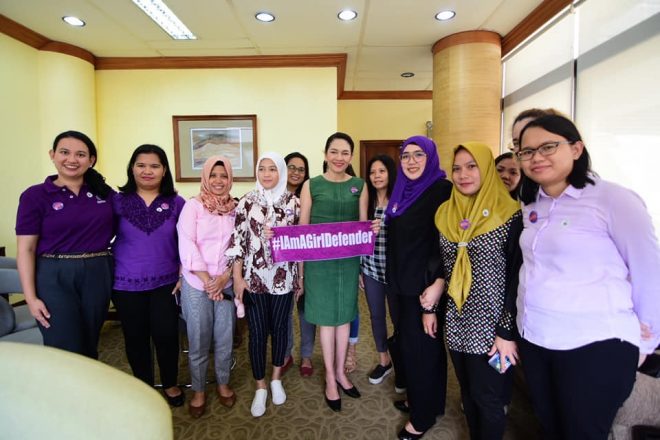
[/toggle]
[toggle title=”No More Children Having Children campaign goes to Albay ” open=”true or false”]
Successfully addressing adolescent reproductive health (ARH) concerns in the country requires local government units (LGUs) to step as frontliners in the delivery of critical information and services to young people.
For the second session of the LGU Forum Series on ARH, stakeholders of the province and municipalities of Albay led by Vice Governor Edcel “Grex” Lagman sat down with PLCPD, UNFPA Philippines, and Rep. Maria Lourdes Acosta-Alba on September 30 to talk about the current ARH situation – both at the national level and in the province, recommendations for addressing adolescent pregnancy, and concrete steps to improve services such as better data collection at the grassroots level.
With the shared vision of #NoMoreChildrenHavingChildren, the participants expressed their commitment to continue working to advance reproductive health in the province, even and especially during the Covid-19 pandemic.
[/toggle]
[toggle title=”skl: the UHD Podcast Episode 3: #EndChildMarriageNow ” open=”true or false”]
September 30, 2020
The Philippines ranks 12th worldwide in terms of absolute number of child marriages where 1 out of 6 Filipino girls are married before reaching the age of 18. Child marriage not only happens in our own backyard, it is in fact prevalent.
Listen in and get involved in our third episode of skl: the UHD Podcast as #GirlDefenders Ziah Macasilang and Babydoll Mohamad from Al-Mujadilah Development Foundation, Inc. (AMDF) join our very own Angie Ramirez in an important conversation on the imperatives measures needed to end child marriage now.
The audio-only version (.mp3 format) of this episode is downloadable here.
[toggle title=”Ifugao and Benguet express commitment to reducing adolescent pregnancies in their provinces ” open=”true or false”]
Local government units have a crucial role to play in addressing adolescent reproductive health (ARH) concerns in the country.
PLCPD, with the support of UNFPA, organized a forum with the local government units of Ifugao and Benguet, in which both provinces shared their current ARH situation as well as successes in the efforts to reduce adolescent pregnancy. UNFPA RH Programme Analyst DJ Ong Calla provided an overview of the national situation and recommendations for duty-bearers, and Atty. Jaye Bekema talked about the bill filed by Senator Risa Hontiveros seeking to prevent adolescent pregnancies in the country.
During the forum, Ifugao shared that the Sangguniang Panlalawigan recently enacted an ordinance on the reduction of teenage pregnancy while the Sangguniang Panlalawigan of Benguet gave a nod to a recently enacted comprehensive municipal ordinance on RH.
Both LGUs of Ifugao and Benguet expressed their commitment to pursue the work on ARH until there are #NoMoreChildrenHavingChildren.
[/toggle]
[toggle title=”Usapang Human Development Season returns for a fourth season ” open=”true or false”]
[/toggle]
[toggle title=”No More Children Having Children: Advocates, artists call on Congress to act on adolescent pregnancy, child marriage in online concert-rally ” open=”true or false”]
11 September 2020—In an urgent plea to lawmakers and concerned government agencies for action on pending bills in Congress and the implementation of comprehensive sexuality education as mandated by the Reproductive Health Law, the Philippine Legislators’ Committee on Population and Development (PLCPD), the United Nations Population Fund (UNFPA), and 27 other organizations including government offices, civil society groups, and youth-based and student-based organizations came together for an online concert-rally in support of adolescent reproductive health under the campaign No More Children Having Children.
Called “Isang Tinig,” the online-concert rally to be premiered at PLCPD and UNFPA’s Facebook pages aims to push for decisive action on adolescent pregnancies in the Philippines by urging legislators to support the passage of laws addressing teenage pregnancies and prohibiting child marriage in the country, and press Congress to exercise its oversight powers, particularly on the implementation of the provision for the mandatory comprehensive sexuality education (CSE) and the budget allocation for the implementation of Reproductive Health (RH) Law.
A national emergency
Authorities, particularly the Commission on Population and Development (POPCOM) and the National Economic and Development Authority (NEDA) have described adolescent pregnancy in the Philippines as a “national emergency.”
Data from the 2017 National Demographic and Health Survey (NDHS) show that one in every 10 young women aged 15-19 years old in the country is already a mother or pregnant with her first child. According to the Philippine Statistics Authority (PSA), 24 babies are born to teen mothers every hour. This means more than 500 per day or more than 200,000 babies delivered by teen mothers annually. The 2017 NDHS also reveals that women 15-19 years old is the only age group that continues to register an increase in fertility rate, the lowest contraceptive prevalence rate, and the highest unmet need for family planning.
With the RH Law barring access of minors to family planning without written parental consent and the non-implementation of the mandatory CSE, young people are highly susceptible to various complications and consequences brought about by engaging in unprotected sex and other risky sexual behavior as well as by risks of sexual and gender-based violence.
Data from the civil registry also suggest that majority of adolescent pregnancies may be a result of exploitative relationship, sexual violence, child marriage, or a combination of these.
A looming crisis
The Philippines ranks 12th globally in terms of absolute number of child marriages. According to the 2017 NDHS, 15% of women aged 20 to 24 years were first married or in union by age 18. 2% of women aged 20-24 years were first married by age 15. One out of six Filipino girls marry before 18. According to 2013 data from the PSA, marriages involving teenage brides account for 12.2% of all registered marriages in the Philippines.
Girls are disproportionately affected by the practice of child marriage. For every boy, four girls are married before they reach their 18th birthday. 75% of child brides are married off to adult men.
The issues of child marriage and adolescent pregnancy are intertwined because one can cause the other. In communities where child marriage is allowed, it is usually practiced to prevent pregnancy and childbirth out of wedlock. On the other hand, early marriage often leads to early pregnancy. These twin issues have multiple negative and sometimes irreversible effects on the social status, health outcomes, and development prospects of a girl and her child.
With the Covid-19 pandemic that increases risks of unplanned pregnancy and violence against women and girls, UNFPA and the University of the Philippine Population Institute have estimated that there will be 18,000 more adolescent pregnancies resulting from the lockdowns and disrupted services.
Pending bills in Congress
Versions of the Prevention of Adolescent Pregnancy Bill have been filed in both houses of Congress, with seven similar versions in the House of Representatives pending in the Committee on the Welfare of Children and Senate Bill 1334 filed by Sen. Risa Hontiveros now in the Period of Interpellation in the Senate plenary.
The bills seek for the development of a national program of action and investment plan for the prevention of adolescent pregnancy, the organization and mobilization of regional and local information service delivery network for adolescent health and development, the development and promotion of age and development-appropriate comprehensive sexuality education, the establishment of functional local teen centers for adolescent health and development, and social protection for teenage mothers or parents.
Three versions of the bill prohibiting child marriage and declaring its facilitation a criminal act are also pending the Committee on the Welfare of Children in the House of Representatives while the Senate version filed by Senator Hontiveros has been sponsored in the plenary.
With this campaign, advocates hope to call on the attention of lawmakers, particularly in the House of Representatives to act on the bills with urgency.
A multi-sectoral campaign
Artists to perform in the concert are Pordalab, Bita and the Botflies, Clara Benin, Syd Hartha, Yumi Lacsamana, Johnoy Danao, Ebe Dancel, and Yeng Constantino.
Meanwhile, legislators who have expressed support for the campaign include Senator Hontiveros, Rep. Toff De Venecia of Pangasinan, Rep. Geraldine Roman of Bataan, Rep. Jesus “Bong” Suntay of Quezon City, Rep. Sol Aragones of Laguna, Rep. Janette Garin of Iloilo, Rep. Maria Lourdes Acosta-Alba of Bukidnon, Rep. Irene Saulog of KALINGA Party-list, Rep. Sarah Elago of KABATAAN Party-list, Rep. Bernadette Herrera-Dy of BAGONG HENERASYON Party-list, and Rep. Amihilda Sangcopan of AMIN Party-list.
Aside from PLCPD and UNFPA, the other partner organizations in the campaign are POPCOM; the Office of Rep. Maria Lourdes Acosta-Alba; the Local Government Unit of Brgy. Culiat, Quezon City; Al-Mujadilah Development Foundation; Catholics for Reproductive Health; Child Rights Network; Democratic Socialist Women of the Philippines; Forum for Family Planning and Development; Health Sciences Society; Ina ng Bayan sa Sais; Kaisa Ka; Oxfam Pilipinas; Pambansang Koalisyon ng Kababaihan sa Kanayunan; Partido Manggagawa (PM), PM Kabataan, Philippine Business for Social Progress; Project LAAN, Philippine Center for Population and Development, Roots of Health, SheDecides Philippines; UN Sustainable Development Solutions Network-Youth Philippines, United Youth of the Philippines-Women; University of the Philippines Speech Communication Association; WomanHealth Philippines; Women’s Global Network for Reproductive Rights; Y-PEER Pilipinas, Young Advocates for SRHR; and Zone One Tondo Organization.
An online petition to lawmakers at change.org/NoMoreChildrenHavingChildren is also launched in the concert.
[toggle title=”skl: the UHD Podcast Episode 2: #NoMoreChildrenHavingChildren ” open=”true or false”]
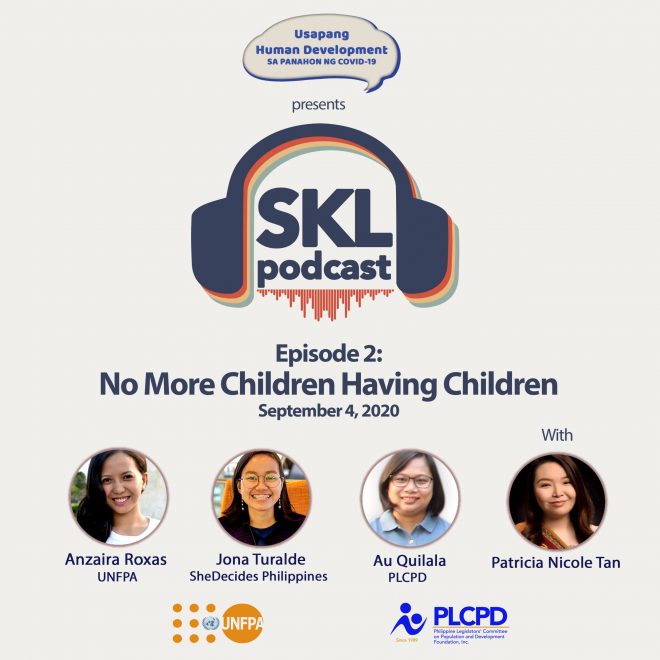
[toggle title=”STATEMENT: A call for transparency and the protection of children in the regulation of new tobacco products ” open=”true or false”]
On Thursday, August 27, the members of the House of Representatives Joint Committees on Trade and Industry and Health approved behind closed doors a substitute bill on the regulation of the use, sale, and distribution of electronic cigarettes and heated tobacco products. The substitute bill was an output of a series of technical working group (TWG) discussions that had been concluded on August 18.
This schedule was announced and agreed on during the last TWG meeting and posted on the calendar of the House of Representatives website with the note that the meeting will be broadcast via the House of Representatives’ Facebook page. A few days after, the schedule was deleted from the calendar, but the joint committees proceeded with the meeting and approved the substitute bill without amendments.
The Philippine Legislators’ Committee on Population and Development and the Child Rights Network decry how the joint committees chose to deliberate on an important bill: behind closed doors, and without giving stakeholders—including public health experts and advocates—a chance to state their position for the members of the two committees to hear before they make their decision.
Unfortunately, the version that was put forward by the TWG and that was approved by the joint committees without amendments reverses gains for the protection of health and protection of children and young people that were made possible by recent legislation (Republic Act 11467) that has introduced some form of regulation on electronic cigarettes and heated tobacco products. These include the following:
- FDA as the lead for the regulation of these products. The recently approved version puts regulation in the care of the Department of Trade and Industry, where it will be regulated as a regular consumer product.
- Age restriction for sale and use at 21 years old and non-smokers. The recently approved version retrogresses at age 18, even though all health authorities and experts who spoke before the TWG recommend a higher age restriction.
- Ban on flavors except conventional tobacco and menthol. The recently approved version allows flavors, including ones that are attractive to children and youth.
We lament that the TWG, and subsequently the joint committees, voted to reverse these gains—ignoring scientific evidence and the voice of public health, children’s rights advocates, and health authorities in the course of the deliberation of the bills and instead choosing to protect the interest of the tobacco industry.
As the substitute bill is sponsored in the plenary, the Philippine Legislators’ Committee on Population and Development and the Child Rights Network appeal to all members of the House of Representatives to reject the current version with these retrogressive provisions and to protect the mandate of the existing law. We will remain vigilant of the actions of legislators and continue to remind them to put children and the health of the Filipinos above the commercial interests of the industry.
[/toggle]
[toggle title=”skl: the UHD Podcast pilot episode: #HijaAko ” open=”true or false”]
[toggle title=”PLCPD and POPCOM present Amplified: Young Voices for Adolescent Health tiny-concert series ” open=”true or false”]
PLCPD and the Commission on Population and Development present “Amplified: Young Voices for Adolescent Health,” a tiny-concert series in support of the #NoMoreChildrenHavingChildren campaign.
Every Thursday at 4:00 PM from August 13 to September 3, we will upload a tiny concert featuring a special performance by our featured artist for the week, and a brief issue discussion on a specific topic related to adolescent reproductive health with the artist and a #GirlDefender youth advocate.
Our inaugural episode on August 13 was especially prepared in celebration of International Youth Day.
Catch these tiny concerts on our Facebook pages and PLCPD’s YouTube channel.
PLCPD: facebook.com/PLCPD1989, bit.ly/plcpd1989youtube
POPCOM: Commission on Population and Development
[/toggle]
[toggle title=”#UsapangHumanDevelopment Special Episode: Uphold Press Freedom, Protect Democracy ” open=”true or false”]
[/toggle]
[toggle title=”#UsapangHumanDevelopment returns for a third season! ” open=”true or false”]
#UsapangHumanDevelopment will return for a third season on Tuesday, June 9. The third season, called Working TOGETHER series, will feature six episodes under the theme of sustainable rural development and will discuss issues such as agrarian reform, protecting the fisheries sector, adequate housing, climate change, and food security.
Working TOGETHER stands for “working toward gender equality, transformative housing, and empowerment of the ruralfolk.”
#UsapangHumanDevelopment season 3 is being organized in partnership with We Effect and its partners in the Philippines.
Episodes will air live every Tuesday, 9:00 a.m. at PLCPD’s Facebook page and YouTube channel.
[/toggle]
[toggle title=”#UsapangHumanDevelopment Season 2 Episode 5: No More Children Having Children ” open=”true or false”]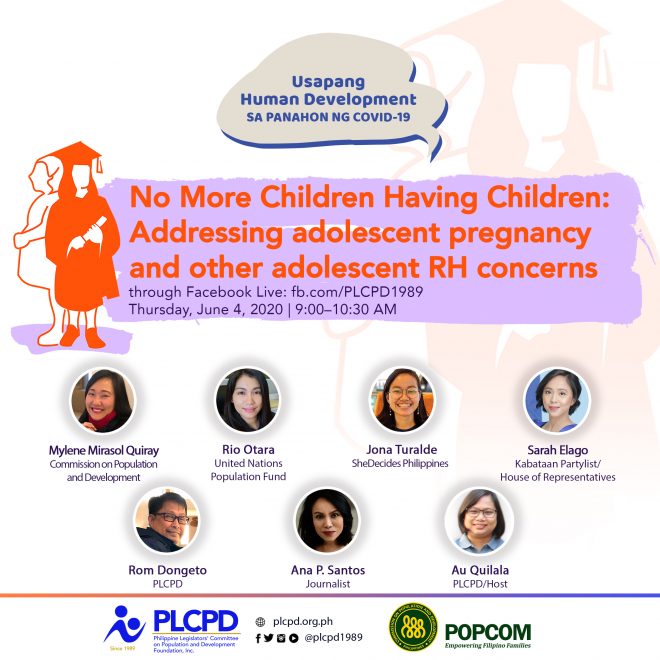 [/toggle]
[/toggle]
[toggle title=”#TobaccoFreeGeneration Now! concert on World No Tobacco Day, May 31 ” open=”true or false”]
In celebration of the World No Tobacco Day 2020, the Philippine Legislators’ Committee on Population and Development (PLCPD), the Child Rights Network (CRN), and the Campaign for Tobacco-Free Kids (CTFK) and their partners in public health, tobacco control, and children’s rights advocacies will host an online concert on May 31 called #TobaccoFreeGeneration in line with the theme of this year’s World No Tobacco Day, “protecting youth from industry manipulation and preventing them from tobacco and nicotine use.”
Tobacco epidemic in the Philippines
In the Philippines, which is considered a high-burden tobacco use country, there are 16.6 million adult smokers and 87,000 Filipinos die annually from tobacco-related diseases. The average monthly expenditure for cigarettes in 2015 was 687.4 pesos, while 188 billion pesos are lost yearly from healthcare expenditure and lost productivity from only top four of more than 40 known diseases caused by tobacco use.
Protecting children from the ills of tobacco
According to the 2015 Global Youth Tobacco Survey 2015, 16% of students 13-15 years old in the Philippines use any tobacco products, while 12% of students smoke cigarettes.
Currently, Republic Act 9211 or the Tobacco Regulation Act of 2003 stands as the primary regulatory law for tobacco products in the Philippines. For advocates, the provisions under this law are not enough to protect children from being targeted by the marketing and manipulation of the tobacco industry. Aside from weak enforcement, including that of the provision on age restriction on sale of cigarettes to those below 18 years old, there are other gaps in the law that need to be addressed. These include advertising in points of sale or where cigarettes are being sold.
Aside from these, new products like electronic cigarettes–being deceptively marketed as a smoking cessation tools–have also attracted young people because of their packaging and flavors. According to a survey by the Food and Nutrition Research Institute, one in five vapers in the country is an adolescent.
Currently, there are more than 20 bills being deliberated at the House of Representatives on regulation of electronic cigarettes. According to advocates, in order for the bills to be truly protective of children and of the health of all Filipinos, there should be ban on sale to young people below age 25 and ban on all flavors. More importantly, it is recommended that the Food and Drug Administration will be the regulator for these products.
The bills are pending with the joint House of Representatives Committees on Trade and Industry and Health.
#TobaccoFreeGeneration concert
The concert will feature performances from progressive and some up-and-coming artist-advocates, including Skarlet Brown, Sitti, the vowels they orbit, Better Days, Pasada, Acel van Ommen, Kokoi Baldo, and Bayang Barrios at ang Bandang Naliyagan. Department of Finance Assistant Secretary Tony Lambino, who is also a champion for tobacco control, will have a special performance during the show. Actress Bea Binene will host the event.
The concert will be simulcast live at 6:00 PM on PLCPD’s Facebook page and YouTube channel.
PLCPD, CRN, and CTFK are organizing the concert in partnership with Action for Economic Reforms, HealthJustice Philippines, RIGHTS, Inc., and Social Watch Philippines.
[/toggle]
[toggle title=”UsapangHumanDevelopment Season 2 Episode 4: RH care as essential service during the pandemic ” open=”true or false”]
[toggle title=”UsapangHumanDevelopment Season 2 Episode 3: #TobaccoFreeGeneration ” open=”true or false”]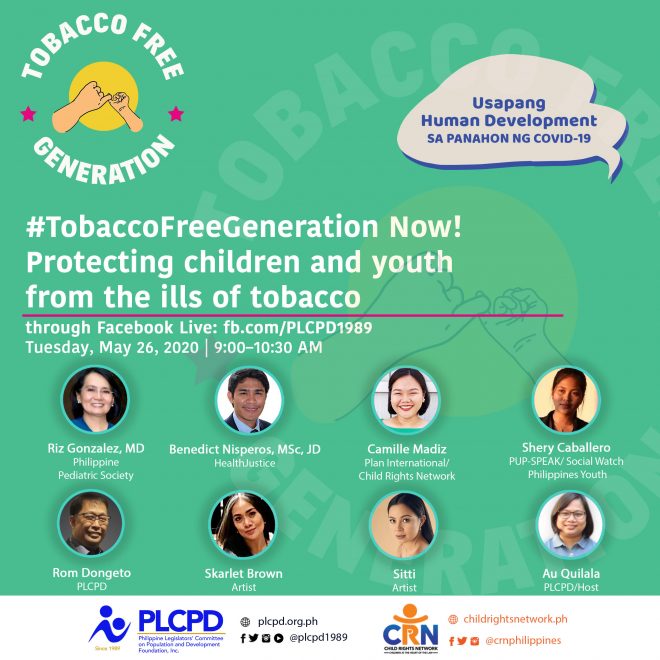 [/toggle]
[/toggle]
[toggle title=”UsapangHumanDevelopment Season 2 Episode 2: #ChoosePositiveParenting ” open=”true or false”]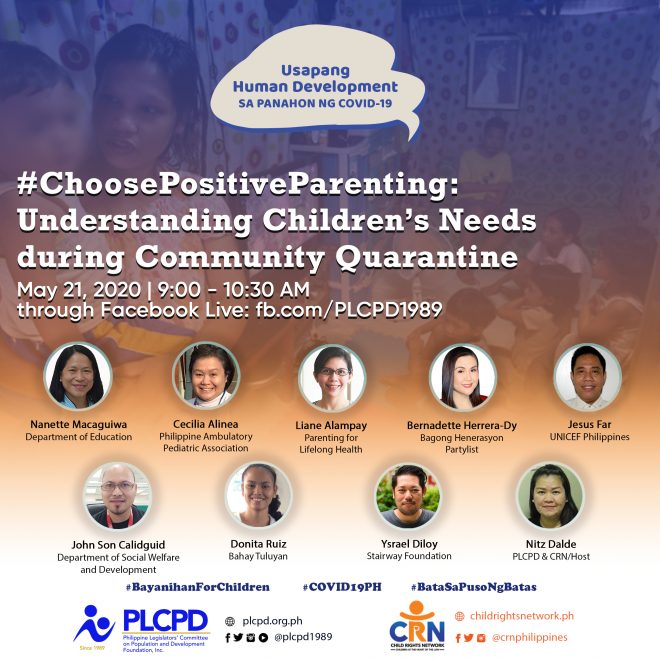 [/toggle]
[/toggle]
[toggle title=”UsapangHumanDevelopment Season 2 Episode 1: #ShutDownOSEC ” open=”true or false”]
[/toggle]
[toggle title=”UsapangHumanDevelopment is back for a second season ” open=”true or false”]
[/toggle]
[toggle title=”Usapang Human Development episode 5: Safe at Home: Preventing Violence against Women and Girls ” open=”true or false”]
[/toggle]
[toggle title=”Usapang Human Development episode 4: Smoking and Covid-19: Now Is the Best Time to Quit ” open=”true or false”]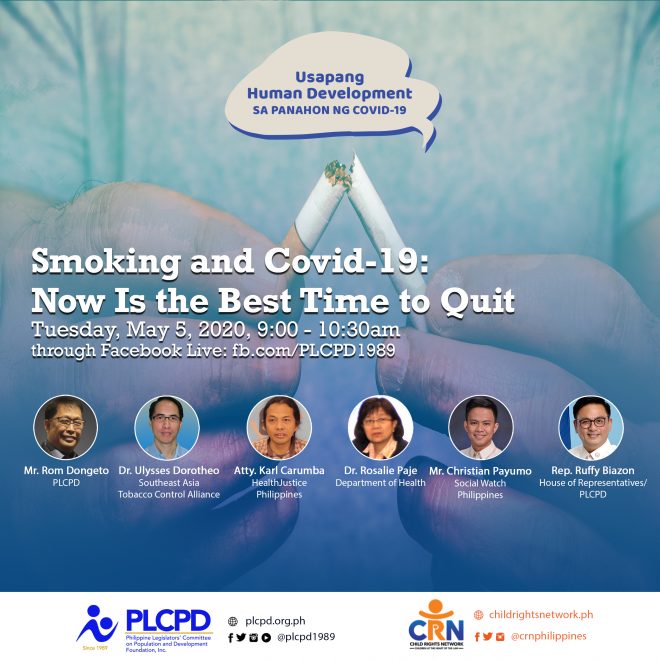
[/toggle]
[toggle title=”PLCPD raises crucial human development concerns during the Covid-19 pandemic through online talk show series” open=”true or false”]
With the aim of providing a platform for meaningful discussion about human development issues that are being affected by or have emerged as a result of the Covid-19 pandemic or the attendant preventive and response measures being implemented in the country, PLCPD launched its Usapang Human Development Series with its first three episodes, which aired through Facebook live starting April 23.
The first three episodes of Usapang Human Development featured food and nutrition security, the prevention of violence against children, and social protection for workers in the informal economy, respectively.
PLCPD Executive Director Rom Dongeto, who introduced the series and served as panelist in all episodes, highlighted the need to discuss these issues – stressing that everyone has a role in alleviating the situation and highlighting the need for all actions to be inclusive and particularly responsive to the needs of the marginalized and vulnerable.
Recommendations for addressing policy and program gaps will be compiled and transmitted to policymakers as input for policymaking during the recovery phase.
The first run of the series has aired every Tuesday and Thursday from April 23. PLCPD will continue airing Usapang Human Development Series live through its Facebook page: fb.com/PLCPD1989. Upcoming episodes in the pilot run of the series include:
- Smoking and Covid-19: Now Is the Best Time to Quit
- Safe at Home: Prevention of Violence against Women and Girls
[/toggle]
[toggle title=”Usapang Human Development episode 3: Social protection for workers in the informal economy ” open=”true or false”]
[/toggle]
[toggle title=”Usapang Human Development episode 2: Preventing Violence against Children ” open=”true or false”]
Watch the episode live on Tuesday, April 28, 9:00 a.m. (PST) at fb.com/PLCPD1989.
[/toggle]
[toggle title=”Usapang Human Development pilot episode: Food and Nutrition Security ” open=”true or false”]
Watch the episode live on Thursday, April 23, 9:00 a.m. (PST) at fb.com/PLCPD1989. 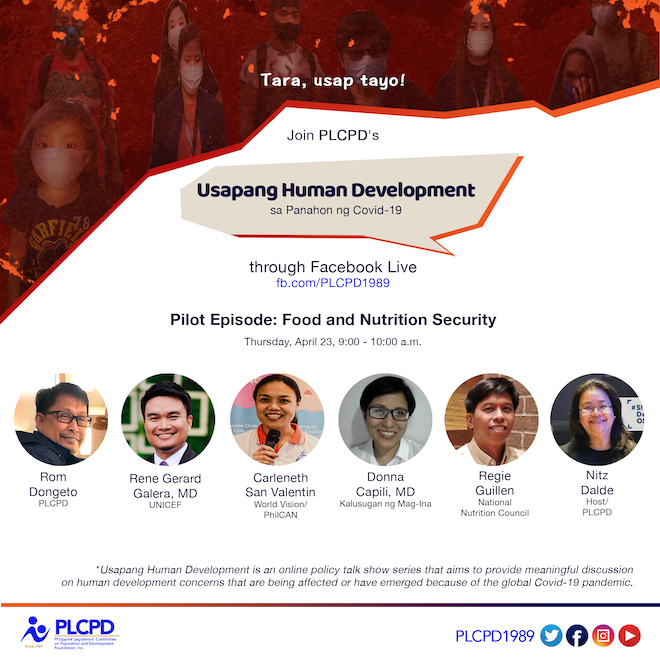
[/toggle]
[toggle title=”PLCPD launches Usapang Human Development sa Panahon ng Covid-19 ” open=”true or false”]
[/toggle]
[toggle title=”Pagpupugay sa frontliners sa laban sa Covid-19 ” open=”true or false”]
[/toggle]
[toggle title=”A 100% smoke-free environment will reduce people’s vulnerability to Covid-19” open=”true or false”]
April 8, 2020
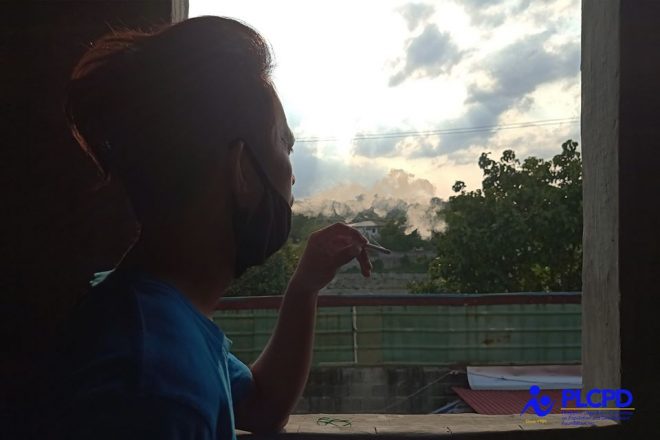 The Philippine Legislators’ Committee on Population and Development (PLCPD) joins health authorities in urging smokers and vapers to quit now, commends local government units (LGUs) who have banned and are moving to ban the sale and use of tobacco products during the Luzon-wide enhanced community quarantine that was prompted by the Covid-19 pandemic, and urges other LGUs to do the same.
The Philippine Legislators’ Committee on Population and Development (PLCPD) joins health authorities in urging smokers and vapers to quit now, commends local government units (LGUs) who have banned and are moving to ban the sale and use of tobacco products during the Luzon-wide enhanced community quarantine that was prompted by the Covid-19 pandemic, and urges other LGUs to do the same.
One in four Filipino adults smoke. One in three Filipinos die due to the four most fatal non-communicable diseases related to tobacco use before reaching the age of 70. The country loses 314 billion pesos each year due to the top four smoking-related diseases. This burden of tobacco use on people’s health is exacerbated by the Covid-19 pandemic.
Another emerging concern is the use of electronic cigarettes, which, a growing body of evidence suggests, poses equally serious risks to lung health.
The novel coronavirus does not discriminate on its targets. Nonetheless, the toll of the disease on the person depends on one’s health and immunity. The virus attacks the respiratory system. Smoking, which weakens the lungs and causes serious illnesses, puts smokers and those who are exposed to second- and third-hand smoke at greater risk of experiencing severe complications from the disease. The same goes for other activities that compromise lung health, including vaping.
In addition, smoking and vaping entail frequent hand-to-mouth contact, which is contrary to established preventive measures against the coronavirus.
Simply put, smokers and vapers are pre-disposed to severe suffering from Covid-19.
On the other hand, studies have shown that lung health improves even within days after quitting smoking. Thus, it is never too late to quit smoking and vaping. In fact, this may be the best time to quit because it immediately reduces one’s risk of severe illness from Covid-19.
PLCPD believes that a truly smoke-free environment will help decrease vulnerabilities of the people to Covid-19 and similar pandemics in the future. With this, it is our hope that lessons from this Covid-19 pandemic will guide legislators in crafting strong tobacco control and regulatory laws with public health in mind.
[/toggle]
[toggle title=”Addressing women’s needs in Covid-19 response is imperative” open=”true or false”]
March 31, 2020
As National Women’s Month comes to an end, let us reflect on our commitment to ensure that women’s rights are respected at all times, especially now that the world is battling the Covid-19 pandemic. This public health crisis has exposed staggering inequalities in society. Among these is gender equality, which places women and girls at a disadvantage.
Unfortunately, crises disproportionately affect women and girls.
- In the Philippines, two in five wage and salary workers are women. 88% of entrepreneurs who are engaged in the retail and wholesale industry are women. This means that women have huge contribution to the Philippine economy. In the aftermath of the pandemic that has brought prolonged economic inactivity, it will therefore be a challenge for many Filipino women to recover their livelihood and sources of income.
- The number of female-headed households and solo parents in the Philippines has been increasing over the years. In the context of a pandemic where community quarantine is imposed, women, who usually perform care work, are more likely to experience increased hardship as their responsibilities become heavier.
- Emergency situations cause psychological distress. According to studies, depression brought about by crises tends to affect women more than men.
- At a time when access to healthcare is limited, essential health services including reproductive health and family planning may be neglected. The Commission on Population and Development has reminded stakeholders of the importance of these essential services in maintaining overall health and well-being during the crisis.
- According to studies, majority of women all over the world experience gender-based violence during crises like armed conflicts and disasters. The impact of the Covid-19 pandemic on women’s safety remains to be seen.
These are some measures that can be done to address these difficult but not insurmountable challenges:
- ensuring women’s access to social protection and financial and other forms of assistance for the poor and near-poor, informal workers, wage earners, and those employed by MSMEs;
- recognition of care work provided by women and the promotion of the importance of shared domestic responsibilities among women and men;
- round-the-clock availability of mental health services, including counseling and care
- access to essential healthcare services, including family planning; and
- integration of women’s rights and GBV prevention-related initiatives in all response-related interventions and efforts.
Inequality has never been more pronounced as now. But what we do today becomes instrumental in shaping future actions toward the achievement of gender equality
[/toggle]
[toggle title=”Don’t overlook the needs of the elderly, children during the enhanced community quarantine” open=”true or false”]
March 30, 2020
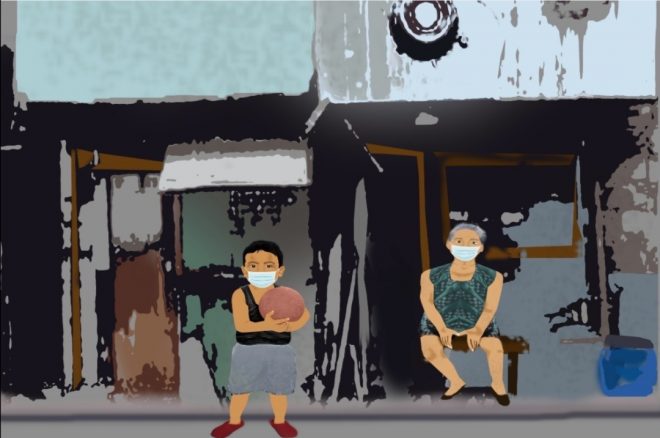 It has been two weeks since the imposition of an enhanced community quarantine (ECQ) in Luzon, with some local government units (LGUs) declaring extreme ECQ in some areas. Work, school, and public transportation have been suspended in an effort to keep people safe inside their homes. Within this period, the public observed and initiated efforts to help fight the Covid-19 pandemic, including the practice of social distancing to slow down if not halt the spread of the novel coronavirus.
It has been two weeks since the imposition of an enhanced community quarantine (ECQ) in Luzon, with some local government units (LGUs) declaring extreme ECQ in some areas. Work, school, and public transportation have been suspended in an effort to keep people safe inside their homes. Within this period, the public observed and initiated efforts to help fight the Covid-19 pandemic, including the practice of social distancing to slow down if not halt the spread of the novel coronavirus.
While the majority can probably endure the ECQ with the most basic necessities met, other sectors like the elderly and the children will need more help.
The trend, not just in the Philippines but also in other countries, shows that that elderly – because of pre-existing health conditions – are most at risk of suffering from the disease. However, having them stay home with little regard for their special needs will not protect them.
According to the Philippine Statistics Authority, the country has about 7.5 million senior citizens. 1.2 million of them are “income poor.” While LGUs implement the ECQ more strictly with the elderly, it is not clear whether the LGUs have taken their situation into consideration. Some may live with their children, but there are many who live alone with no source of food and income during the lockdown. Most will probably need to go out to buy their maintenance medication and will have no one to do this for them.
Another concern that we need to look at is mental health, especially of children. With classes disrupted, being unable to do recreational activities and to interact with other children may affect their development. School closure and home quarantine could eventually cause a psychological distress that will have a lifelong impact, if not properly managed. The fear and panic surrounding the pandemic may be too much for a child.
We are also seeing the decline of food supplies in households and increasing dependence on food packs from the government mostly consisting of processed food and canned goods. One can only imagine the effect of this on the nutritional status of children. While this is happening, there are stories of food wastage in some parts of the country. Tons of vegetables are being thrown away by farmers who worked hard to produce these, only because no one has helped them to transport these vegetables to Metro Manila. Fresh produce as part of food packs distributed to residents of Mandaluyong City as well as mobile markets organized by the LGUs of Pasig City and Valenzuela City are among good practices that can be replicated by other LGUs.
Beyond monitoring the growing number of cases day by day and telling people to stay home, the government must look with a keener perspective at the specific needs of different sectors of society and create a definitive action that will help address these needs.
The Philippine Legislator’s Committee on Population and Development calls the attention of the national government and LGUs to not only think of solutions in terms of general needs. We implore LGUs to have an in-depth assessment of sectoral and age-disaggregated data. If an elderly is not provided a quarantine pass, sustained provision of food, medicines, and other essentials must be assured at all times during this ECQ.
For the children, parents must be guided on how to address their needs for survival, development, protection, and participation during these difficult times. While their formal education has been disrupted, there are other activities that can be done – both online and offline – to maintain good physical and mental health.
We also urge LGUs to strengthen their effort to communicate better with their constituents, especially the vulnerable, in determining their needs, as well as to relay these more effectively to national government agencies and other organizations.
Several LGUs have managed to adapt to the situation and come out with good ideas. This demonstrates that with good governance, needs-based and people-centered solutions are possible.
[/toggle]
[toggle title=”Covid-19 pandemic a reminder that closing the gap should be a priority” open=”true or false”]
March 17, 2020
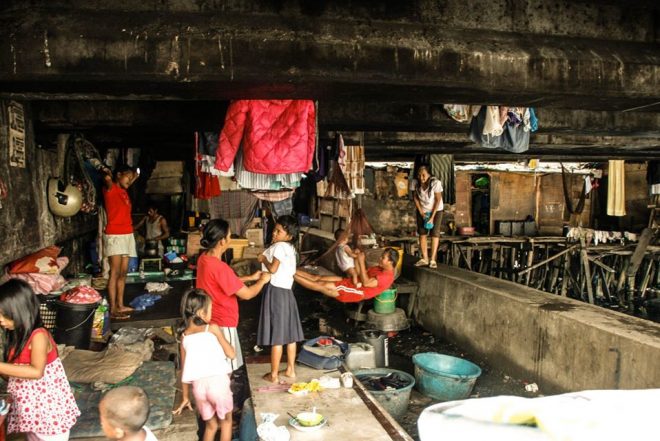 In the current public health emergency of Covid-19 outbreak marked by an atmosphere of fear, panic, and confusion, there is one reality that becomes clearer, more visible, and more real every day: there is a wide gap between the rich and the poor. In a time of crisis, when everyone is vulnerable, the poor is far more vulnerable to the immediate and attendant threats to public health and their economic impact.
In the current public health emergency of Covid-19 outbreak marked by an atmosphere of fear, panic, and confusion, there is one reality that becomes clearer, more visible, and more real every day: there is a wide gap between the rich and the poor. In a time of crisis, when everyone is vulnerable, the poor is far more vulnerable to the immediate and attendant threats to public health and their economic impact.
Yesterday, the president declared that a Luzon-wide enhanced community quarantine would be implemented as the reported number of Covid-19 cases and deaths continues to rise. The declaration means suspension of mass transportation, restricted movement of people, closure of business establishments – leaving only the essential sectors of banking and retail for the provision of food and health essentials, and increased presence of uniformed personnel to maintain peace and order.
The declarations of community quarantine for Metro Manila, and subsequently, of enhanced community quarantine for the whole of Luzon resulted in the huddling of people in key entry and exit points throughout Metro Manila, virtually rendering the guidelines to observe social distancing and to restrict forming in large crowds ineffective.
This picture is an indication of a deeper national problem: the lack of safety nets for the poor and the vulnerable.
The ones who have enough resources can properly observe the prescribed precautionary measures and have access to basic necessities that will allow them to survive for weeks to come while on community quarantine.
For the poor, it is altogether a different story. For the poor, the daily wage earners, those who are part of the informal economy, or those who are employed by small businesses who could not survive prolonged inactivity, suspension of work, suspension of mass transportation, and social distancing could mean hunger. Social distancing may not even be imaginable, let alone observable, for those who live in poor communities where the requirements of proper hygiene, space, and access to healthcare are a luxury. For many Filipinos, precautionary measures like staying at home and social distancing are another privilege they cannot afford.
This unprecedented public health emergency calls for fast and meaningful action from stakeholders. The Philippine Legislators’ Committee on Population and Development (PLCPD) urges all to follow precautionary measures if they can, and for key government agencies and local government units to prioritize the marginalized and most vulnerable, particularly in the provision of health services and financial assistance. We also call for the dutiful observance of the rule of law in the enforcement of enhanced community quarantine.
The current predicament also reminds us of the need to enact long overdue laws that will uplift the quality of life of Filipinos so that they will not be helpless in times of crisis. Security of Tenure and Magna Carta of Workers in the Informal Economy, for instance, are bills that seek to protect the rights of workers and provide social protection for those who are informally employed. This situation also calls for a review of laws that protect small and medium enterprises from the shocks of unexpected crises.
In the wake of this public health emergency, may legislators set their eyes on the crafting of laws that will improve governance and strengthen the government’s response to possible similar health crises in the future – providing safety nets for the public, especially for the vulnerable and marginalized populations.
[/toggle]
[toggle title=”Job announcement: Advocacy and Partnerships Officer” open=”true or false”]
Closing date: 30 April 2020
The Philippine Legislators’ Committee on Population and Development Foundation, Inc. (PLCPD) is looking for individuals who are interested to work full-time as advocacy and partnerships officer. The advocacy and partnerships officer will be assigned to handle advocacy for multiple issues related to human development, particularly on children’s rights, gender equality, reproductive health, rural development, and tobacco control and public health. Passion for and experience in advocacy work are required.
Interested applicants may send their CV and letter of application to plcpdfound@plcpd.org.ph. Address your communication to Mr. Romeo Dongeto, executive director.
Main Functions
- develops and implements a legislative advocacy plan for the assigned issues
- implements advocacy activities and ensures completion of project deliverables
- develops and builds issue champions among PLCPD and non-PLCPD members
- provides technical support to and mobilizes legislators in advocacy activities
- builds and sustains partnerships with various policy stakeholders
- monitors the movement and support for the assigned bills
- develops advocacy messages and writes press releases, position papers, and policy memos for legislators
- generates activity and project reports
Qualifications
- at least two years of experience in advocacy work
- strong interpersonal and networking skills
- excellent written and verbal communication skills
[/toggle]
[toggle title=”STATEMENT: Be #GirlDefenders, end the cycle of violence against women and girls” open=”true or false”]
March 8 marks the celebration of International Women’s Day. Although there have been many improvements since the day was first commemorated, there are still a lot of gaps that need to be addressed. In the Philippines, one such important gap is violence against women and girls, a largely unheard of or neglected problem.
The country boasts of a vibrant policy environment for women and gender equality. But the situation of young women and girls demonstrates the opposite:
- One in 10 young women 15-19 years old have begun childbearing. Twenty-four babies are born to teen mothers every hour. There are 183,000 adolescents giving birth in the country annually. And although the birth rate among 15-19-year-olds has been decreasing, there has been a 63%-increase in births among 10-14 year-olds since 2011. Yet, minors have limited access to critical reproductive health information and services.
- Globally, the Philippines ranks 12th in terms of absolute number of child marriages and unions. There were approximately 700,000 of cases of child marriages in the country as of 2013. Although the minimum legal age for marriage is 18, marriage of children is allowed in many parts of the country.
- One in four children in the Philippines experience sexual violence. The Philippines has one of the youngest age for determining statutory rape.
- The Philippines is the global epicenter of online sexual exploitation of children. In 2018, there were more than 600,000 sexualized photos and videos of children coming from the country, making it the top source of child sexual exploitation materials.
Girls are too young to have children. It is too soon for them to marry. They deserve a safe environment. They are not for sale.
This Women’s Day, the Philippine Legislators’ Committee on Population and Development urges lawmakers to take meaningful legislative action that will put an end to violence against women and girls. As laws have a critical role in shaping policies and practices, and even in addressing cultural and attitudinal transformation, we enjoin members of Congress to act on the following legislative measures:
- prevention of adolescent pregnancy bill, which institutionalizes a national program to address the concern and provides social protection for adolescents who are already parents, as well as the full implementation of Reproductive Health Law, which mandates the Department of Education to ensure comprehensive sexuality education throughout the country;
- prohibiting child marriage, declaring its facilitation as a criminal act, and providing social protection for those who have experienced it;
- raising the age for determining statutory rape from below 12 to below 16; and
- ensuring protection of children from online sexual abuse and exploitation.
The roots of violence against women and girls run deep. But we have been marching toward ending this cycle and addressing this issue with conviction. If we are successful in protecting girls and creating a society where their rights are respected, we will achieve an equal and just society.
We end the cycle by being #GirlDefenders.
#NoMoreChildrenHavingChildren
#EndChildMarriage
#EndChildRape
#ShutDownOSEC
[/toggle]
[toggle title=”Bill seeking to end child marriage sponsored in the Senate” open=”true or false”]
For the first time in the history of Congress, a bill seeking to end child marriage in the Philippines was sponsored in the Senate on the third day of the observance of National Women’s Month. Senator Risa Hontiveros, author of Senate Bill No. 1373 delivered her sponsorship of the bill seeking to prohibit child marriage and declare it as illegal, penalizing parties who cause, fix, and facilitate or arrange the marriage of children or those below 18 years old.
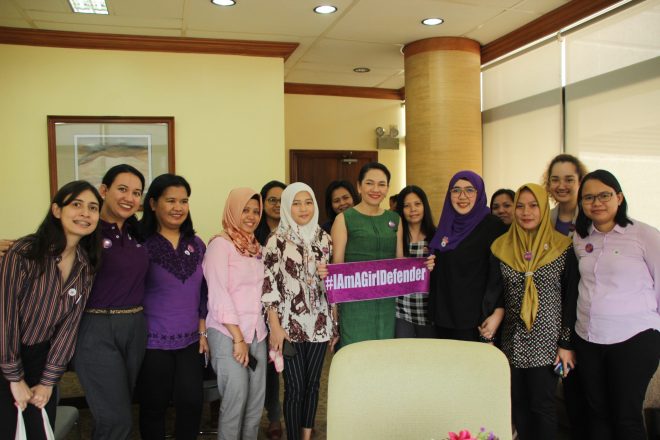 In the afternoon before the sponsorship, PLCPD, along with other #GirlDefenders from Lanao del Sur, Maguindanao, and National Capital Region, had an audience with the senator, declaring their gratitude and support and expressing their commitment to contribute to ending child marriage in the country. The advocates shared the struggles of girls in their own communities who went through the experience of forced marriages and the sad reality that many duty bearers have been silent about this problem.
In the afternoon before the sponsorship, PLCPD, along with other #GirlDefenders from Lanao del Sur, Maguindanao, and National Capital Region, had an audience with the senator, declaring their gratitude and support and expressing their commitment to contribute to ending child marriage in the country. The advocates shared the struggles of girls in their own communities who went through the experience of forced marriages and the sad reality that many duty bearers have been silent about this problem.
According to UNICEF, there are 750 million women today who were married before reaching 18 years old, 2% of them were married off before reaching their 15th birthday.
Despite a national law that sets the minimum age for marriage at 18, the Philippines is currently the 12th country in the world with the highest number of child brides.
Senator Hontiveros – who also chairs the Senate Committee on Women, Children, Family Relations and Gender Equality as well as PLCPD – recognizes that the proposed law may cause an anxiety for some sectors that may have held child marriage as an established practice. But “…culture continues to evolve, to grow with us human beings who are fully aware of present realities and necessities, accepting of new knowledge and belated realizations…[a]nd among the learnings that we are duty-bound to acknowledge is that our children are our future, and all that we do must be in their best interest,” she said in her speech.
Ending child marriage is one of Senator Hontiveros and PLCPD’s priority legislative agenda under women’s rights, gender equality, sexual and reproductive health and rights, and the prevention of violence against women and girls. At the House of Representatives, a counterpart bill was jointly filed by Rep. Bernadette Herrera-Dy and Rep. Edcel Lagman. The bill was first filed in the 17th Congress, during the International Day of the Girl in 2018. This is the farthest that any bill attempting to address this issue has reached in the history of Congress.
#GirlDefenders #EndChildMarriage
[toggle title=”An Appeal of Public Health Advocates to the Joint Committees on Trade and Health of the House of Representatives on Regulating E-Cigarettes and Heated Tobacco Products” open=”true or false”]
We, public health advocates, call on the Joint Committees on Trade and Health of the House of Representatives to uphold public health interest in the deliberation of the current bills that seek to regulate e-cigarettes and heated tobacco products.
Republic Act Nos. 11346 and 11467 are aligned with the policy pronouncements of President Rodrigo R. Duterte who warned against the public health impact and danger of these toxic products. To reiterate, there is categorical evidence of the adverse health effects of these products, especially in terms of respiratory and cardiovascular cytotoxicity and the permanent neurobehavioral effects of youth nicotine use. These products are harmful and are dangerous to health.
Specifically, we maintain that the Food and Drug Administration (FDA) is the government agency that should have the jurisdiction over these toxic products. The FDA’s power to determine and regulate the manufacture, importation, sale, packaging, advertising, promotion, and distribution, and even ban on flavorings of vapor products and heated tobacco products should be upheld.
The FDA and the Department of Health are the agencies which have the mandate and the expertise to ensure that regulations are consistent with our public health goals. If we, as a nation, truly wish to prevent an epidemic that has targeted the youth, the mandate of FDA should be upheld.
We likewise support existing regulations that: set the age restriction to 21; regulate on health claims; ban on the use of these products in public places and apply the Graphic Health Warning law. These are policies which support the State’s public health goals.
We will remain vigilant on any move to undermine or weaken the health regulations adopted in the recently passed laws designed to safeguard the public, especially the youth. We will hold accountable and expose those who seek to weaken public health initiatives in favor of the interests of an industry that have profited and continues to profit from the addiction of our youth.
HealthJustice Philippines (www.healthjustice.ph)
Philippine Pediatric Society (www.pps.org.ph)
Philippine Legislators’ Committee on Population and Development (PLCPD) (http://www.plcpd.org.ph)
WomanHealth Philippines, Inc. (www.facebook.com/WomanHealthPH)
Philippine Cancer Society (www.philcancer.org.ph)
Children International (www.childreninternational.ph)
Rural Poor Institute for Land and Human Rights Services (RIGHTS) (www.rightsnetphils.org)
Action for Economic Reforms (www.aer.ph)
Southeast Asia Tobacco Control Alliance (https://seatca.org/)
Vital Strategies (https://www.vitalstrategies.org/)
Social Watch Philippines (http://www.socialwatch.org/node/689)
Child Rights Network (https://childrightsnetwork.ph/)
Parents against Vape
JCI Lakambini – Davao
Philippine Society of Private Midwife Clinic Owners
Millennials PH (https://web.facebook.com/MillennialsforPH/)
[/toggle]
[toggle title=”Advocates to Congress: Vape not safe, strictly regulate” open=”true or false”]
Quezon City, March 5—Public health and tobacco control advocates come together and urge legislators to pursue pro-health regulation and protect the gains of Republic Act (RA) 11467, a landmark legislation that imposes higher excise taxes on alcohol and electronic cigarettes or vapes, and heated tobacco products (HTPs) and introduced regulatory provisions for these harmful products.
The key regulatory provisions introduced by RA 11467 include the mandate for the Food and Drug Administration (FDA) to regulate e-cigarettes and HTPs, ban on sale to young people below 21 years old, and ban on flavors .
Currently, a technical working group (TWG) created by the House of Representatives Joint Committees on Trade and Industry and Health are consolidating 20 bills seeking to regulate e-cigarettes. During the series of meetings, the TWG members have voted to reduce the role of FDA in regulation, lower the age restriction from 21 to 18, and allow flavors – decisions that weaken the pro-health stance introduced by RA 11467.
Regulation primarily a health issue
“RA 11467 has just recently been enacted. We await the the implementing rules and regulations for it, particularly the regulatory provisions for e-cigarettes. The FDA’s power to determine and regulate the manufacture, importation, sale, packaging, advertising, promotion, and distribution, and even ban on flavorings of vapor products and heated tobacco products should be upheld. We urge our lawmakers to respect the FDA’s mandate in regulating vape and e-cigarettes,” said Atty. Benedict Nisperos, legal consultant of HealthJustice Philippines.
Protecting Filipino children and youth
“The age restriction at 21 and ban on flavors are crucial provisions that will protecting children and young people from addiction to nicotine,” highlighted Dr. Riz Gonzalez of the Philippine Pediatric Society. The brain, particularly the prefrontal cortex, responsible for executive functions, continues to develop until the age of 25, Dr. Gonzalez explained. Flavors, meanwhile, are what attract young people to e-cigarettes, she added.
EO 106 expands smoke-free environments
Members of the panel also welcomed President Duterte’s issuance of of Executive Order (EO) No. 106, which strictly regulates the sale, manufacturing, and use of vape and e-cigarettes in public places. Signed in February, EO 106 expands the mandate of EO No. 26 that establishes smoke-free public and enclosed spaces, to include e-cigarettes and HTPs.
“The use of vape and e-cigarettes is a major public health concern. We welcome the commitment of the President to smoke-free spaces, which now includes the prohibition of vaping in public spaces,” said Mr. General Franco, representative of Parents against Vape and the Parents-Teachers Associations Federation of Davao Region.
Public health over private interests
“We will remain vigilant of any move to undermine or weaken the health regulations adopted in the recently passed laws designed to safeguard the public, especially the youth. We will hold accountable and expose those who seek to weaken public health initiatives in favor of the interests of an industry that have profited and continues to profit from the addiction of our youth,” the groups commit in a unity statement.
[/toggle]
[toggle title=”STATEMENT: EO 106 Establishes ENDS/ENNDS/Vapes Regulation as a Health Issue” open=”true or false”]
By Rep. Ruffy Biazon
[/toggle]
[toggle title=”STATEMENT: This Valentine’s Day, think about the children” open=”true or false”]
This Valentine’s Day, the Philippine Legislators’ Committee on Population and Development (PLCPD) calls on legislators for meaningful legislative action to address many serious sexual and reproductive health concerns of adolescent, including addressing gender-based violence.
- 1 in 10 young women 15-19 years old have begun childbearing; 24 babies are born to teen mothers every hour. There are 183,000 adolescents giving birth in the country annually. Birth rate among 15-19-year-olds has been decreasing but there has been a 63%-increase in births among 10-14 year-olds since 2011.
- Globally, the Philippines ranks 12th in terms of absolute number of child marriages and unions. There are approximately 700,000 of cases of child marriages in the country as of 2013.
- 1 in 5 children in the Philippines experience sexual violence.
- The Philippines is the global epicenter of online sexual exploitation of children. In 2018, there were more than 600,000 sexualized photos and videos of children coming from the country, making it the top source of child sexual exploitation materials (CSEM).
Thus, our call for the enactment of the following bills:
- prevention of adolescent pregnancy bill, which institutionalizes a national program to address the concern and provides social protection for adolescents who are already parents
- prohibiting child marriage, declaring its facilitation as a criminal act
- raising the age for determining statutory rape, from below 12 to below 16
We also call on Congress to exercise its oversight function on the implementation of the Reproductive Health Law, particularly the mandatory comprehensive sexuality education, as well as on child protection and related laws that will address online sexual exploitation of children.
[/toggle]
[toggle title=”STATEMENT: Protect children, retain minimum age for buying and using vapes —Child Rights Network” open=”true or false”]
Quezon City, February 14—The Child Rights Network (CRN) expresses grave concern over how the deliberations of the Technical Working Group (TWG), created jointly by the House of Representatives Committee on Trade and Industry and Committee on Health for the consolidation of bills seeking to regulate electronic cigarettes, are regressing.
In an 8-1 vote in favor of a lower minimum age, the TWG voted yesterday to revert the minimum age for the purchase and use of electronic cigarettes from 21 to 18, with Representative Joet Garcia of the 2nd District of Bataan as the only member fighting for a higher minimum age of 25.
CRN and health advocates see this as a retrogressive move that endangers the health and future of Filipino children. The recently enacted law imposing additional taxes on alcohol and electronic cigarettes (Republic Act 11467) has already introduced regulatory provisions, which include the minimum age for purchase and use of these devices at 21 years old.
In the Philippines, where one in five users of e-cigarettes are adolescents (10-19 years old), this regulatory provision that restricts the sale and use of the device to at least 21 years old is crucial and can save children from developing an addiction to nicotine.
CRN, the largest alliance of organizations and agencies pushing for children’s rights legislation in the Philippines, is firm in its position that regulation on electronic cigarettes must first and foremost protect the health and the future of the Filipinos, especially children. We call on the members of the two committees to retain the minimum age at 21 or vote for even a higher minimum age for purchase and use of these harmful devices.
The members of the TWG who were present during the voting were Representatives Sharon Garin, Rufus Rodriguez, Ace Barbers, Alfredo Garbin, Kristine Singson-Meehan, Ciriaco Gato, Cheryl P. Deloso-Montalla, Ria Vergara, and Jericho Nograles. The TWG was co-chaired by Rep. Weslie Gatchalian, chair of the Committee on Trade and Industry, and Rep. Joet Garcia, vice chair of the Committee on Health.
[/toggle]
[toggle title=”Strong regulation of e-cigarettes sought” open=”true or false”]
November 27, 2019
With the House Committee on Trade and Industry and the Committee on Health starting the deliberations on various bills seeking to regulate the manufacture, importation, packaging, sale, distribution, use, and advertisement of electronic nicotine delivery systems and electronic non-nicotine delivery systems (ENDS/ENNDS), advocates call on legislators to immediately pass a strong regulatory law on these products to specifically protect children and the youth.
“The Philippines has made great strides in enforcing tobacco control, with both the national and local governments now slowly but steadily enforcing smoking bans in public places, and stronger restrictions on the sale and promotion of cigarettes, especially for minors. Yet an elephant in the room remains – the influx and rising prevalence of the use of e-cigarettes. This is an issue that Congress indeed needs to face head-on,” said Romeo Dongeto, executive director of the Philippine Legislators’ Committee on Population and Development (PLCPD).
1 in 5 vapers are children or young Pinoys
According to the Department of Health (DOH), around 1 million Filipinos use e-cigarettes. Of this figure, about one in every five are young people between the ages of 10 to 19.
“There is a false belief that e-cigarettes are safer than customary tobacco products. A lot of scientific data have already shown how ENDS/ENNDS can at times be more harmful, and inflict detrimental effects especially on young users,” Dongeto stressed.
The World Health Organization has already repeatedly warned that e-cigarettes are harmful to health since they contain addictive liquids with big doses of nicotine and other toxic substances.
The DOH has also cautioned the public regarding harmful chemicals in these devices such as nicotine, ultra-fine particles, carcinogens, heavy metals, and volatile organic compounds. Results generated from peer-reviewed studies show that e-cigarette juices contain high levels of addictive nicotine, which can result in acute or even fatal poisoning through ingestion and other means.
Studies have also shown that using nicotine in adolescence can harm parts of the brain that control attention, learning, mood, and impulse control. Using nicotine in adolescence may also increase risk for future addiction to other drugs. Accidental ingestion of nicotine is also poisonous to children. Accidental explosion of devices can also cause physical harm.
Only recently, DOH has announced that it has received official report on the first case of e-cigarette or Vape-Associated Lung Injury (EVALI) from a private pediatric pulmonologist based in the Visayas.
Pinoys are for stronger regulation
PLCPD reminded legislators that there is actually strong public support for more stringent tobacco regulation.
Results of a national survey on smoking conducted by Pulse Asia from January 26 to 31, 2019 show that nine out of 10 Filipinos agree that the minimum age of those allowed to buy and use tobacco products should be increased from 18 to 25 years old.
“The results of this survey show that the Filipino public is very open and receptive to essential legislative reforms that can be done as regards tobacco control. There can be nefarious forces lurking in the halls of Congress stating that e-cigarette legislation goes against public opinion, but this survey says otherwise. Let these figures embolden Congress to pass stronger laws,” Dongeto said.
“With the e-cigarette industry left unchecked for so long, the government needs a lot of catching up, before the use of these devices become more prevalent. Let us not wait until reports of its detrimental effects on children and the youth proliferate. Before the use of e-cigarettes become a full-blown public crisis, may this pressing public health issue deeply penetrate into the national conversation and compel our legislators and government officials to act decisively,” Dongeto concluded.
[/toggle]
[toggle title=”No More Children Having Children Campaign goes to Culiat:
PLCPD kicks off concert tour on the prevention of adolescent pregnancy
” open=”true or false”]
Recognizing the power of music in imparting messages to young people and to solicit public support for the calls to implement the Comprehensive Sexual Education (CSE) under the Reproductive Health Law and to support the Prevention of Adolescent Pregnancy Act, the Philippine Legislators’ Committee on Population and Development (PLCPD) kicked off a concert tour for the “No More Children Having Children” campaign on October 25 at Brgy. Culiat, Quezon City.
The event was opened by talents from Brgy. Culiat called Pinang dela Cruz: Batang Babae who performed a play, and featured performances Skarlet Brown, Jug Honeyluv, KE, The Vowels They Orbit, Noel Cabangon, and Tropical Depression. Between their performances, these artists also engaged the audience and talked about the societal issue of adolescent pregnancy.
The activity also featured the screening of a short film produced by PLCPD titled “Paano na ‘yan?” about adolescent reproductive health, emphasizing the health, development, and social dimensions of adolescent pregnancy.
Present during the concert were Councilor Marivic Co-Pilar of the 6th District of Quezon City and Barangay Captain Vic Bernardo who expressed their support for the prevention of adolescent pregnancy. “Isa sa ating adbokasiya ay magbigay ng proteksyon ang ating kabataan,” said Barangay Captain Vic Bernardo, remarking how education is a right that children must attain in order to gain better security for their future and how education and access to opportunities are compromised by a mistimed pregnancy.
The cost of teenage pregnancy in the Philippines
According to the United Nations Population Fund, the Philippines has the highest rate of teenage pregnancies among the six major economies of the Association of Southeast Asian Nations and loses P33 billion annually in lost productivity due to adolescent pregnancy. The Commission on Population and Development (POPCOM) reports that there is an estimated 200,000 births to teen mothers every year and an executive order declaring adolescent pregnancy a national emergency in the Philippines is being drafted for the President’s signature. Pregnancy- and childbirth-related deaths among young mothers 15-24 years old account for 22% of all maternal deaths in the country.
At present, there are bills filed in both houses of Congress for a national policy preventing adolescent pregnancies and institutionalizing protection for teenage parents. At the House of Representatives, the bill was filed by Representatives Sol Aragones and Edcel Lagman while Senator Risa Hontiveros filed the Senate counterpart.
No More Children Having Children
Earlier last week, PLCPD and its partners in the ARCHES project, POPCOM, and eight non-government organizations launched the No More Children Having Children Campaign, a ramped up crusade for the passage of a law seeking to address adolescent pregnancy in the Philippines and calling on the Department of Education to implement comprehensive sexuality education, a key provision of the Reproductive Health Law. Aside from the concert tour and a short film, the campaign will also have activities inside Congress and plans to have a campus tour to involve students and young people in the advocacy.
[/toggle]
[toggle title=”Legislators commit to ending child marriage in PH through policy reform” open=”true or false”]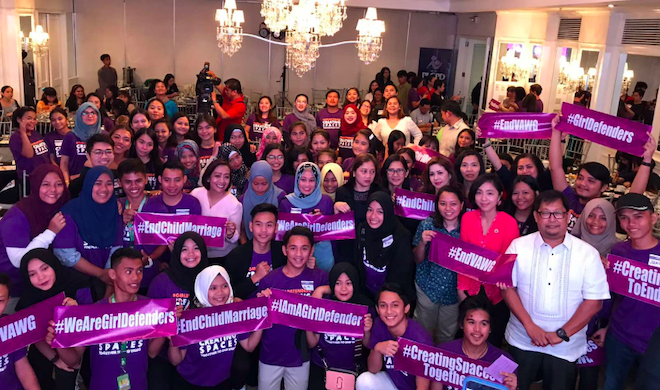
Quezon City, October 1—Women legislators committed to support the bill seeking to protect children, especially girls, from child, early, and forced marriage during the launch of the Alliance of #GirlDefenders: Creating Spaces Together to End Violence against Women and Girls at Sulo Hotel.
Among the legislators who supported the campaign were Rep. Malou Acosta-Alba of 1st District of Bukidnon, who also chairs the House of Representatives Committee on Women and Gender Equality; Kalinga party-list representative Irene Gay Saulog; Gabriela Women’s Party representative Arlene Brosas; and Kabataan party-list representative Sarah Elago.
“As warriors and Girl Defenders, we will prioritize this bill in the 18th Congress. We owe it to young people and children to have this bill enacted,” said Representative Malou Acosta-Alba, who also chairs the House of Representatives Committee on Women and Gender Equality.
The alliance of #GirlDefenders, composed of multisectoral representatives from the government – both executive and Congress – and civil society organizations was launched in time for the celebration of International Day of the Girl on October 11. This alliance serves to safeguard and defend the rights of girls to have a violence-free future by advocating for policy reforms that will prohibit child marriage.
Advocates from Maguindanao and Lanao del Sur shared that changing social norms is the most challenging space to create. “While I find it very challenging as a Muslim woman to be advocating to end child marriage which is culturally acceptable in Maranao culture, I am proud to be a #GirlDefender creating spaces at the level of the community by making young people aware of their rights” said Sittie Nur Dayhannah Mohamad, project officer of Al-Mujadilah Development Foundation, a Lanao del Sur-based civil society organization advocating women’s rights and empowerment.
Youth advocates from Maguindanao and Lanao del Sur appealed to legislators to push for a policy that will “back girls up and allow them to say no when they are forced to get married.”
Child marriage in the Philippines
The Philippines ranks 12th in terms of absolute numbers of child marriages globally. In developing countries, 1 in 4 girls will get married before reaching the age of 18, according to the United Nations Population Fund. While the Family Code of the Philippines sets 18 years old as the legal age of marriage, Muslim communities and some indigenous groups allow the practice of child marriage at as early as puberty based on written and unwritten laws and as a cultural practice. Child marriage has serious negative impacts on the health and development of girls.
Prohibition of child marriage pushed
Legislators in attendance committed to become #GirlDefenders in the policy arena and collectively pledged to support the bill prohibiting and criminalizing child marriage. Currently, there are bills filed in both houses of Congress prohibiting the facilitation and solemnization of child marriage, making it a criminal offense. In the House of Representatives, two versions were filed by Representatives Bernadetter Herrera-Dy and Edcel Lagman as well as Alfred Vargas while Senator Risa Hontiveros filed the Senate version. Aside from prohibiting the facilitation of child marriage, the bill institutionalizes social protection for those who have experienced child marriage.
[/toggle]
[toggle title=”Policy conference highlights urgency of amendments to Tobacco Regulation Act, restriction of electronic cigarettes ” open=”true or false”]
The Philippine Legislators’ Committee on Population and Development (PLCPD) organized a policy conference on tobacco control on August 23. Called “Fulfilling Filipinos’ right to health,” the policy conference was anchored on the interconnection between health and human rights in the hopes that right to health, which is universal and inalienable nature, will take primacy over business interests in the crafting of tobacco control laws that fulfill the State’s duty to protect its people and its obligations to the World Health Organization Framework Convention on Tobacco Control (WHO FCTC).
The event gathered representatives from different government agencies, the legislature, civil society and people’s organizations, and other stakeholders to discuss and consolidate advocacy plans and to come up with a comprehensive policy agenda that will be pushed for in the 18th Congress, 2019-2022.
In his opening remarks, Mr. Rom Dongeto, executive director of PLCPD, emphasized the importance of rights-based and health-oriented approach in policymaking and how this results in laws that genuinely cater to the needs of the people. He further emphasized in the context of huge development in health-related laws in the recent years, the importance of maximizing these gains as an opportunity to push for further health measures despite all the challenges that the advocates may face in the 18th Congress.
During the morning session, Dr. Rosalie Paje from the Department of Health discussed the prevalence of tobacco use in the Philippines and provided a brief discussion on current efforts by the government to address this burden of tobacco.
Atty. Jacky Sarita, managing director of HealthJustice, provided a survey of current tobacco regulations and the reforms needed in each area to make our country’s policies more compliant with Framework Convention on Tobacco Control. These include expansion of smoke-free environment, absolute ban on tobacco advertisement, promotion and sponsorship, and graphics health warning.
“Corporate Social Responsibility activities of tobacco companies tend to humanize them even though they sell products that kill,” warned Atty. Sarita.
Other reforms, according to him, must include increasing of the age of access to cigarettes from 18 to 21 years old, removal of the tobacco industry in the Inter-Agency Committee-Tobacco, prohibition of sale of tobacco products online, and prohibition of single-stick sale (tingi).
Mr. Filomeno Sta. Ana III, coordinator of Action for Economic Reforms talked about tobacco taxation as one of the most the effective ways to deter smoking, especially among the poor. The main message of his presentation on how tobacco taxation is good for revenue, health, and the poor.
“Tobacco is not just an issue of health, but an issue of the poor. The main consumers of tobacco and alcohol are the poor. It’s clear that the poor benefit from the taxation the most because they have the highest drop in smoking prevalence according to the data,” said Mr. Sta Ana.
Dr. Yul Dorotheo, executive director of theSoutheast Asia Tobacco Control Alliance, situated the Philippines in relation to its neighboring countries in Southeast Asia in terms of tobacco control regulations. According to him, the country is not lagging behind that much but there is still much to be done. For instance, the Philippines is the only country in Asia whose graphic health warnings are printed on the lower portion of the cigarette pack impinging its effectivity to deter smoking. Nevertheless, in the context of the recently enacted Universal Health Care Law and the additional tax on tobacco, Dr. Dorotheo sees a silver lining in what he considers as an emerging good practice in the Philippines.
“While this practice is more common in Europe, not many countries in Asia use excise taxes on tobacco for health expenditure. This is one of the best practices the Philippines has on tobacco,” said Dr. Dorotheo.
He also discussed the emerging concern on the use of new products, such as heated tobacco products and electronic nicotine delivery systems/electronic non-nicotine delivery systems (ENDS/ENNDS) or electronic cigarettes, which are currently unregulated. Several deaths and more than a hundred cases of lung diseases that can be attributed to the use of electronic cigarettes have been reported in the United States recently.
In the afternoon session, Dr. Loida Alzona of the Metropolitan Manila Development Authority (MMDA) discussed the vital role of local government units (LGUs) in creating 100% smoke-free environments whose activities receive full support of MMDA.
After the plenary discussion, a workshop was held to identify priority measures in the 18th Congress and points of cooperation among advocates. Outputs centered on proposed revisions to the Tobacco Regulation Act, including regulation of heated tobacco products, strict regulation of electronic cigarettes, further tax measures on electronic cigarettes, and creation of mechanisms for monitoring of implementation and enforcement of the Executive Order no 26.
At the end of the activity, Ms. Au Quilala of PLCPD ensured the participants that the outputs of the workshops will be presented to the legislators and will be used as basis in engagements with PLCPD members and legislators on tobacco control advocacy.
The policy conference on tobacco control is part of a series of policy discussions for the 18th Congress that seek to identify priority human development agenda for the 18th Congress. The other themes in the series are: rural development and reproductive health.
[/toggle]
[toggle title=”PLCPD hosts European parliamentary study tour to the Philippines on RMNCA health” open=”true or false”]
Seven European parliamentarians from various European countries and the European parliament visited the Philippines for a week-long study tour to learn about the country’s reproductive, maternal, newborn, child, and adolescent or RMNCA health on August 5-10. The study tour was organized by the European Parliamentary Forum on Sexual and Reproductive Rights (EPF) and hosted by the Philippine Legislators’ Committee on Population and Development (PLCPD).
The week-long study visit included exchanges with Senator Risa Hontiveros and Senator Pia Cayetano on legislative efforts in the area of maternal and child health, sexual and reproductive health and rights, and women’s rights and gender equality, among others.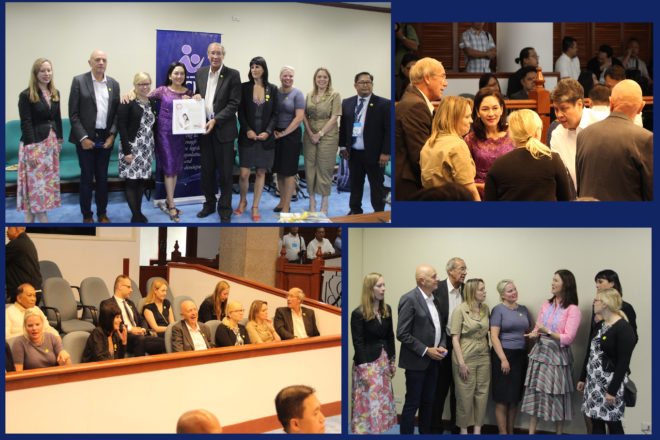
The study visit also featured dialogues with national government agencies, civil society organizations, young people, and development partners, in which serious concerns such as adolescent reproductive health, particularly adolescent pregnancies, and the prevalence of unsafe abortions were emphasized.
In a meeting with the United Nations Population Fund in the Philippines hosted by Mr. Iori Kato, the parliamentarians learned about the country’s priorities and relationship with development partners in the pursuit of SRHR vis-à-vis its current development efforts and talked about priorities of European countries the European parliament in terms of aid for SRHR.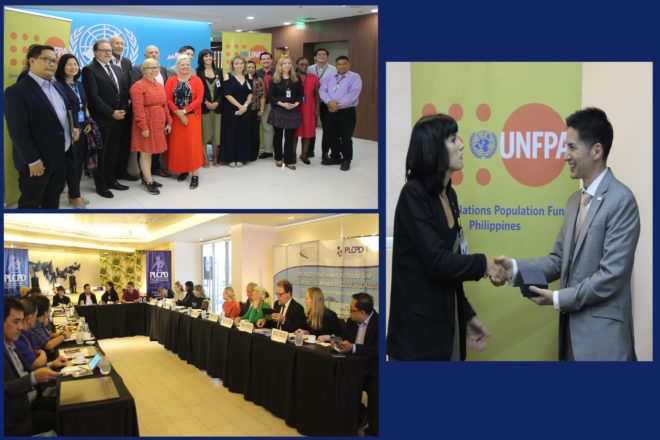
In an interaction with an urban community in Navotas City hosted by Zone One Tondo Organization (ZOTO), the parliamentarians had a heart-to-heart conversation with young people on matters that concern them, particularly on specific issues such as access to healthcare and education and discrimination on the basis of sexual orientation and gender identity and expression. The group also visited one of the clinics of Family Planning Organization of the Philippines and learned about the services offered by the clinic to community women and young people.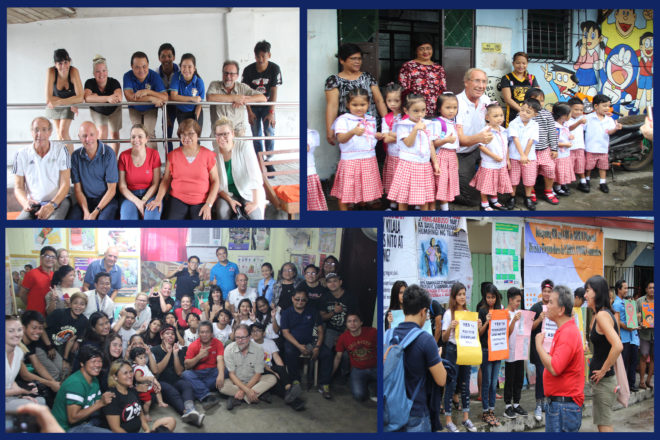
The study visit culminated in a two-day issue orientation with national lawmakers and local policymakers from Benguet, Albay, Palawan, Eastern Samar, Cotabato, and provinces and municipalities in the Bangsamoro Autonomous Region in Muslim Mindanao on the Sustainable Development Goals (SDGs) and a discussion with experts on the recently enacted health-related laws including the Universal Health Care Law; how these laws impact the country’s efforts to achieve and commitment to SDG 3 (ensure healthy lives and promote well-being for all at all ages), the Philippine Development Plan, and the International Conference on Population and Development Programme of Action; and the crucial role of local government units in ensuring that these laws truly benefit the Filipino people. In a special session during the issue orientation, PLCPD chair emeritus and Albay 1st District representative Edcel Lagman talked about the policy direction for women and children’s health and rights in the 18th Congress.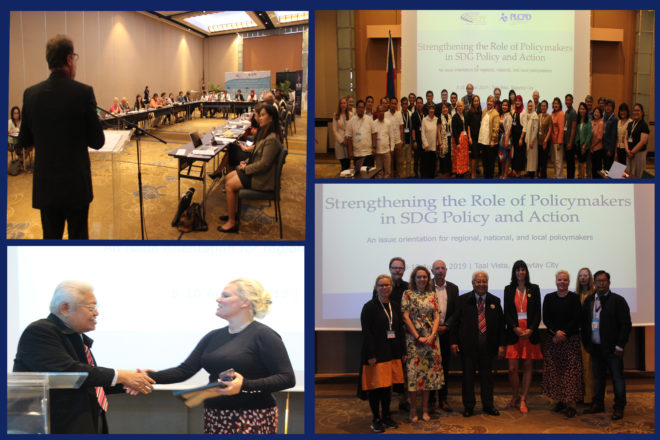
All of the discussions during the week-long study visit highlighted the importance of human rights and gender equality as lens for policymaking and implementation and the urgency of addressing RH concerns of Filipino youth and children, especially in access to healthcare and education.
The European delegation was composed of Mr. Norbert Neuser, member of the European Parliament; Ms. Aurora Madaula, member of the Parliament of Catalonia; Mr. Frank Heinrich, member of the German Bundestag; Mr. George Dallemagne, member of the Federal Parliament of Belgium; Ms. Saara Hyrkkö, member of the Parliament of Finland; Ms. Sandra Pereira, member of the Parliament of Portugal; and Ms. Silje Hjemdal, member of the Parliament of Norway.
PLCPD and EPF organized similar study visits for European parliamentarians in 2012 and in 2016.
*Photos courtesy of EPF and PLCPD.
[/toggle]
[toggle title=”PLCPD joins the call of Asian and African parliamentarians to accomplish the unfinished business of the ICPD Programme of Action” open=”true or false”]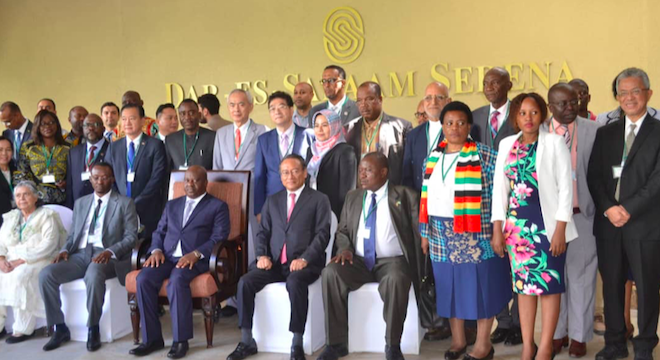
The Philippine Legislators’ Committee on Population and Development (PLCPD) participated in the inter-regional meeting on population and development of parliamentarians from Asia and Africa held in Dar es Salaam, Tanzania on August 5-8.
The meeting was organized by the Asian Population and Development Association (APDA) to gather inputs from policy makers and influencers from civil society in the two regions that would contribute to the discussion in the upcoming International Conference on Population and Development (ICPD)+25 Summit in Nairobi, Kenya in November 2019.
Select members of the parliament from the two regions presented their respective countries’ contributions to the ICPD Programme of Action. The Philippines, through PLCPD, shared its efforts in developing “Business Solutions for Women’s Empowerment and Healthy Society.” In the Philippines, model legislation such as the Reproductive Health Law, Extended Maternity Leave, Breastfeeding in the Workplace, Solo Parents’ Welfare, Women in Nation Building and Development, and the Magna Carta of Women have contributed to a vibrant policy environment for advancing women’s rights and empowering women.
While there remain pockets of challenges in terms of preventing teenage pregnancy, reducing fertility rates, and increasing high contraceptive use, access to reproductive health services is significantly improving in both regions. Some countries are making headway in their policies on food and nutrition security, labor and employment, public finance management, and freedom of information.
Also discussed during the inter-regional meeting were challenges brought about by climate change and political wars resulting in civil unrest, as well as the persistence of harmful cultural practices such as female genital mutilation and child marriages that disproportionately affect women and girls, do not only harm only citizens’ health and individual well-being but also hamper the development.
The ICPD was a landmark meeting in 1994 that transformed governments’ response to population growth from chasing after numerical targets to human rights-based approach. The ICPD and its Programme of Action highlight the centrality of reproductive health and its relationship with women’s empowerment and gender equality in ensuring the security, well-being, and development of societies. The Programme of Action calls for access to reproductive health care, including family planning and maternal and child health.
[/toggle]
[toggle title=”LGUs in BARMM commit to sustain implementation of the RPRH Law” open=”true or false”]
August 1, 2019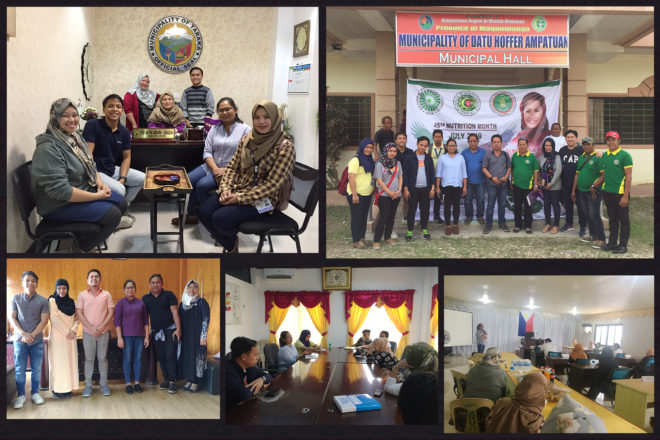
Several municipal government units in the Bangsamoro Autonomous Region in Muslim Mindanao (BARMM) will pursue and sustain the implementation of the Responsible Parenthood and Reproductive Health (RPRH) Law and fulfill their mandate to provide quality healthcare to their constituents.
This was the commitment made by local chief executives and Sangguniang Bayan members of various municipalities in Lanao del Sur, Maguindanao, and Basilan during the visit of Philippine Legislators’ Committee on Population and Development together with partners in the provinces, namely Al-Mujadilah Foundation Inc. (Lanao del Sur), United Youth Philippines-Women (Maguindanao), and Pinay Kilos! (Basilan).
These visits were held in the context of the recently concluded 2019 midterm elections where a new set of local government officials was elected and in light of recently enacted health-related laws, as well as of the issued Executive Order No. 12, which set forth heavy roles on the part of local government units (LGUs) in achieving the country’s sexual and reproductive health (SRH) goals.
The aim of these visits is to support LGUs in strengthening local policies related to sexual and reproductive health that will ensure relevant and effective implementation of SRH programs. This is in recognition of the power of local government units to effect change and to address the SRH needs in their respective communities and recognizes their indispensable role as vital partners in the RH advocacy. Local governments have huge potential to fill in the gaps in the national policy and to achieve its full implementation. This is why it is important to engage them and to help them realize their full potential in terms of policymaking.
During the meetings, PLCPD followed up on the status of the proposed RH-related ordinances filed in their respective local councils, which were the results of a policy development workshop conducted by PLCPD under the ARCHES Project. Fortunately, many of these municipalities were able to pass such ordinance before the end of the term of the previous Sanggunians. They also signified their openness to further collaborations with the ARCHES partner organization in addressing other areas of SRH. Specifically, PLCPD lauds the efforts of the LGUs in the municipalities of Buadipuso-Buntong, Taraka, and Piagapo in Lanao del Sur, of Ampatuan in Maguindanao, and of Maluso in Basilan, among others in adopting the said policy measure.
For those municipalities which were not able to pass the RH-related ordinance, the newly elected officials committed that they will file and pass the ordinance during their term and that they will adopt other necessary measures in prioritizing SRH needs of their constituents.
PLCPD also took this opportunity to discuss the SRH situation in the locality and possible strategies that will contribute to the improvement of the availability of and access to basic SRH services. PLCPD, in this regard, offered its technical assistance in drafting local ordinances in relation to the recently enacted laws and in conducting capacity building activities for the members of the local government and of the community. Furthermore, in the context of the recently concluded elections, it is an opportune moment for advocates to influence the legislative agenda of the local officials and to ensure that they include SRHR of its constituents in its priorities.
[/toggle]
[toggle title=”As 18th Congress opens, PLCPD calls for the enactment of rights-based, pro-people laws” open=”true or false”]
July 23, 2019
On July 22, President Rodrigo Duterte delivered his fourth State of the Nation Address (SONA) to the Filipino people. In this address, the President presented his administration’s achievements in the first three years, and unveiled the administration’s plans and priority agenda, setting its direction in its three remaining years. This SONA is particularly important as it takes place in the beginning of a new Congress with a new set of legislators and a new set of legislative agenda.
As an organization that seeks to uplift the life of every Filipino through legislation, the Philippine Legislators’ Committee on Population and Development (PLCPD) believes that policymaking is still one of the most powerful and effective tools in ensuring that the rights and welfare of the people are respected, protected, and fulfilled – and the President has a vital role in influencing the policymaking process. His signified support on various issues is instrumental in their swift passage. At the same time, the President’s vocal support for any law is an indication of the executive’s commitment to its implementation. It is in this context that PLCPD lauds and supports some of the priority bills forwarded by President Duterte as highlighted in his recent SONA.
Legislative reforms such as the increase in the excise tax on tobacco products, which is seen as an effective measure in curbing the prevalence of tobacco use in the country, are very timely considering the huge burden that tobacco places on health and economy of the country. This tax reform is also an important in ensuring that the Universal Health Care Law will be adequately funded and that its reach will be as universal as it promises to be.
The National Land Use Bill, a proposal that has been languishing in Congress for two decades, was mentioned for the third time by President Duterte. This measure would ensure proper classification of the country’s land according to its use and in turn, would help in avoiding the adverse effects of disasters and conflicts arising from these resources. The President also mentioned the urgency of enacting the coconut levy trust fund, a law that would benefit coconut farmers.
On the other hand, also mentioned in the SONA were some alarming proposed measures, which, if enacted, would reverse the country’s efforts at protecting human rights and advancing human development. In the 17th Congress, human rights advocates in Congress and in civil society successfully blocked the passage of several retrogressive bills that blatantly disregard human rights and renege on the country’s commitment to various international treaties and conventions. These include the reinstatement of the capital punishment and the revival of mandatory Reserve Officers’ Training Corps (ROTC).
However, these measures were again listed as part of this administration’s priority agenda for the next three years. PLCPD vehemently opposes the reimposition of the death penalty as this would only further oppress the already marginalized sectors of the society. PLCPD calls on the government to reform the country’s justice system, address the root causes of criminality, and adopt rehabilitative measures in countering crimes. Likewise, we appeal to the government to adopt a rights-based education; the revival of the mandatory ROTC, under the façade of instilling nationalism and inculcating discipline, will put the children in a vulnerable situation, exposing them to risks of abuse and corruption. We also call on legislators to retain the minimum age of criminal responsibility (MACR) and strengthen the implementation of the Juvenile Justice and Welfare Act. Although lowering the MACR was not mentioned in the SONA, the allies of the President in both houses of Congress have included this in the priority bills of the 18th Congress.
PLCPD believes that not only the issues included in the SONA are worth highlighting but also those that were not mentioned as this would signify their value to the government. We are imploring the government to include in its priority agenda and to champion various human development issues such as children’s rights, gender equality, rural development, adequate housing, prevention of violence against women and girls, and health – particularly reproductive health.
PLCPD remains steadfast in its calls for the government to protect and uphold the human rights of every individual. We urge the 18th Congress and President Duterte to prioritize rights-based and people-centered legislation in the next three years. We also urge the duty bearers that in the crafting of laws, it is best to heed sound reasoning and scientific evidence instead of submitting to pressures coming from powerful groups whose interest are inherently in conflict with that of the people.
Finally, PLCPD enjoins everyone to remain vigilant of any advances being made by policymakers that would run counter to the principles of human rights and human development.
[/toggle]
[toggle title=”World No Tobacco Day a reminder to pursue stricter tobacco control policies” open=”true or false”]
May 31, 2019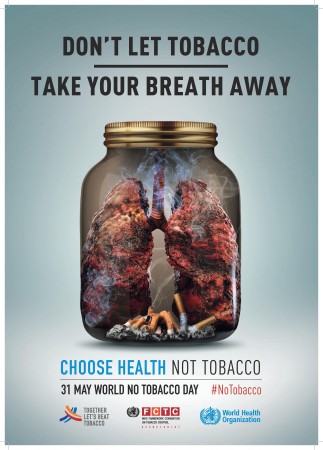
May 31 marks the celebration of World No Tobacco Day.
The Philippines is a signatory to the World Health Organization-Framework Convention on Tobacco Control (WHO-FCTC), ratified in 2005. The Tobacco Regulation Act of 2003 (Republic Act 9211) serves as a framework for controlling and regulating tobacco products in the Philippines, but this needs to be updated to align with the standards of the FCTC. A number of legislative measures were also passed to enhance the country’s tobacco control policies including the Sin Tax Reform Act of 2012 and Graphics Health Warning Act of 2014. These, particularly increase in sin taxes, have resulted in a significant decline in the overall smoking prevalence from 2009 to 2015.
However, despite all these progressive measures, the Philippines remains a high-burden tobacco use country according to the WHO. The Philippines has also been tagged as the second-largest tobacco consumer in Southeast Asia. Recent data shows that 1 in every 4 Filipinos smoke tobacco. Current projections further show that there will be 200 000 more smokers every year, resulting to one million more smokers before the term of President Rodrigo Duterte ends, if stronger efforts to reduce tobacco use will not be put in place. This is equivalent to economic losses of P314 billion due to the health problems caused by smoking.
Moreover, the ill effects of tobacco use extend to non-smokers including children through second-hand smoke – and even third-hand – smoke, endangering their health and well-being.
Currently, there are cessation efforts launched by the Department of Health, like “quitline”, to help smokers initiate or continue quitting tobacco use. The Senate is also deliberating on a proposed law that seeks to further increase the excise tax on tobacco products, which is expected to be passed before the end of the 17th Congress. A great deal of studies has shown that increasing tobacco tax is an effective way of deterring future smokers, which will result to an overall decrease in the prevalence of tobacco use. Bills were also filed in both houses of the Congress to raise the age of access to tobacco and to regulate the use and distribution of e-cigarettes.
PLCPD believes that ensuring the good health of every member of the society is crucial in developing their quality of life and their ability to participate in nation-building. PLCPD also recognizes the power of policymaking in creating lasting solutions to the burden of tobacco in the country.
In line with this, PLCPD joins other countries in celebrating the World No Tobacco day and in calling for the adoption of stricter tobacco control policies. Specifically, PLCPD calls for the immediate passage, in the remaining days of the 17th Congress, of proposed measure to increase the excise tax on tobacco products. The amendments to RA 9211, such as the raising the minimum age of access to cigarettes, removal of the tobacco industry in the IAC-T, and expansion of smoke-free public places, as well as banning or strict regulation of e-cigarettes and other novel tobacco products which are seen as a gateway to smoking addiction must also be pursued by the 18th Congress. These measures enjoy overwhelming public support; recent polls have shown that 9 out of 10 Filipinos support the banning of smoking in public places and raising the minimum age for buying and using cigarettes. The same popular support is shared by the proposal to increase taxes on tobacco products.
PLCPD calls on every legislator to bear in mind the health and well-being of every Filipino who suffers every day due to tobacco smoke and to resist the pressures coming from the tobacco industry.
Finally, PLCPD enjoins all Filipinos to be one with the fight for a smoke-free Philippines. For the future generations, let us build an environment free from tobacco.
Tobacco kills. Don’t let tobacco take your breath away.
[/toggle]
[toggle title=”Passage of 105-Day EML Law a big leap for Filipino mothers and children” open=”true or false”]
May 28, 2019
The Philippine Legislator’s Committee on Population and Development (PLCPD) lauds the enactment of the Expanded Maternity Leave Law (RA 11210), which was signed on February 20. On Labor Day, May 1st, the Department of Labor and Employment (DOLE) , in coordination with the agencies of the Civil Service Commission (CSC) and the Social Security System (SSS), spearheaded the ratification of the Implementing Rules and Regulation (IRR) in San Fernando, Pampanga. The signing of the IRR signals the full implementation of the law.
“Beyond the added number of days, the law is a big leap for Filipino women’s health and nutrition of children. Healthier, well-rested mothers also means healthier babies,” said Romeo Dongeto, Executive Director of PLCPD.
The Expanded Maternity Leave Law or Republic Act 11210 grants 105 days of maternity leave for working mothers and an added 15 days for solo parents. Prior to the law, the Philippines had the lowest number of days of leave for working women in Southeast Asia at 60 days, falling short of the international standard, which is at least 98 days, as prescribed by the World Health Organization and the International Labor Organization.
The Philippines’ Expanded Maternity Leave Law also allocates seven days of transferable leave for fathers or other available relatives until the third degree of consanguinity.
“Our EML law is unique. The effort to include fathers and other members of the family to participate in care work instills that parenting children is everyone’s role,” added Dongeto.
[/toggle]
[toggle title=”PLCPD appeals for issue voting in 2019 mid-term elections” open=”true or false”]
May 9, 2019
Elections are seen as an integral element of a working democracy. They signal not only a change in leadership but also a change in priorities and policy direction that will influence the country’s governance and development in the next several years. This is why it is opportune moment for advocates to discuss and to mainstream pressing issues that may help in setting the agenda of the incoming new set of leaders.
It is in this context that the Philippine Legislators’ Committee on Population and Development (PLCPD), together with its partners in various advocacies, launched an issue-based electoral and voters’ education campaign entitled, “iChange: Vote for our future,” which aimed at elevating different human development issues – particularly policy support for reproductive health (RH), a 100% smoke-free environment, children’s rights, gender equality, and rural development – as important electoral issues in preparation for the coming midterm elections. The campaign consisted of a series of activities in Metro Manila and in the provinces of Ifugao, Benguet, Palawan, Albay, Negros Occidental, Cebu, Davao, Maguindanao, and Lanao del Sur.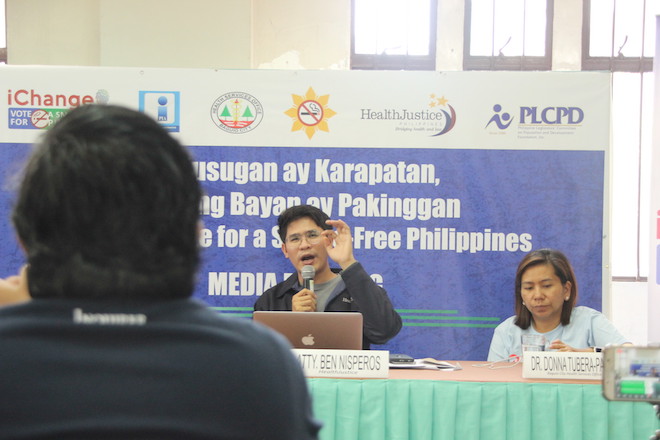
Through this campaign, PLCPD sought to provide a platform where people can discuss with the candidates the possible solutions to the perennial problems of the country. PLCPD believes in the importance of a people-oriented approach in policymaking to arrive at legislations that would genuinely cater their needs. Results of public opinion polls conducted during the election season show that there is an overwhelming support for the full implementation of the RPRH law, for stricter tobacco control policies, and for the adoption of measures to end violence against women and girls (VAWG) – particularly child marriage. These results signal the fact that these issues necessitate urgent action in the upcoming 18th Congress, 2019-2022.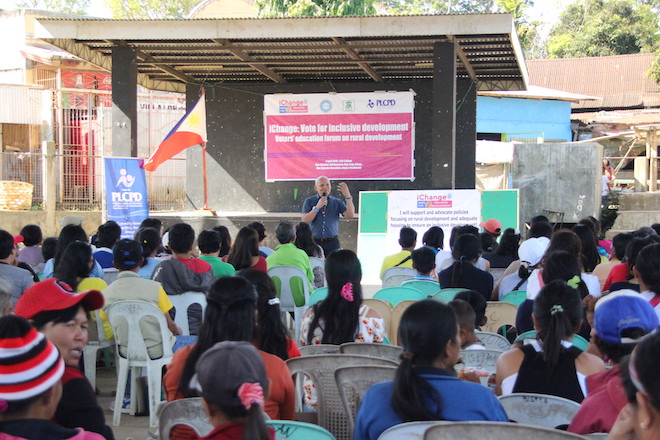
During the campaign, various experts, advocates, and stakeholders further highlighted why the human development issues forwarded in this campaign are important to discuss during the election season. These discussions were backed by timely and relevant data coming from various sources. Representatives from the civil society, on the other hand, forwarded their calls for immediate action and in turn, some national and local candidates were present to register their support for the campaign and to lay out their platforms in addressing these issues. Candidates also signed on a wall of commitment and pledged to aopt measures that will promote and protect people’s health and rights, once elected.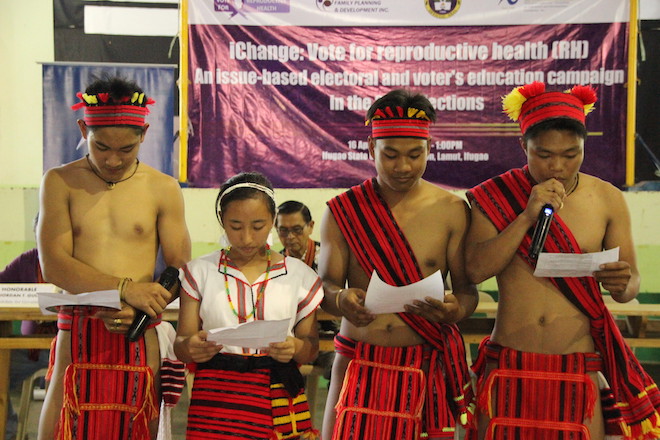
PLCPD also utilized the power of music as an effective platform in mainstreaming the issue of VAWG by holding a concert tour and by producing a music video of the campaign’s official theme song entitled, “Ngayon ang Simula,” written and composed by PLCPD’s executive director Mr. Rom Dongeto.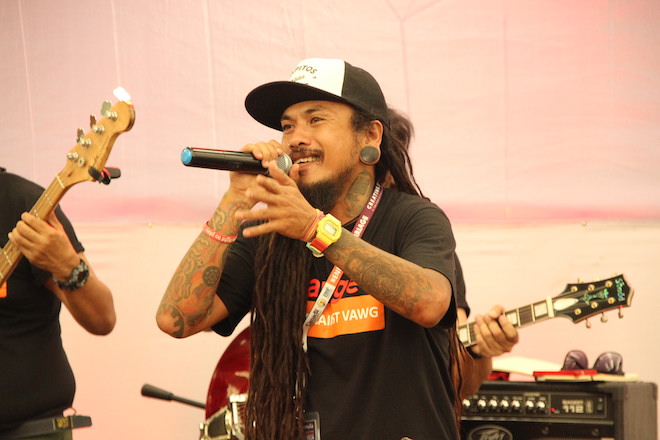
Finally, PLCPD also held various media briefings where members of the national and local press were able to ask questions regarding the campaign. It is hoped that through these media activities, PLCPD was able to reach a wider audience in terms of both the voters and the candidates.
[/toggle]
[toggle title=”PLCPD embarks on iChange: Vote against VAWG concert tour” open=”true or false”]
April 1, 2019
 Despite being one of the best performing countries in the world in terms of gender equality due to the presence of various measures promoting it, violence against women and girls (VAWG) still exists in the Philippines until today. It exists in every space of the society beginning from the community level up to the government level and even in the cyberspace.
Despite being one of the best performing countries in the world in terms of gender equality due to the presence of various measures promoting it, violence against women and girls (VAWG) still exists in the Philippines until today. It exists in every space of the society beginning from the community level up to the government level and even in the cyberspace.
Child marriage is one example of this problem that compromises the security and development of women and girls. A great deal of studies has shown that this phenomenon gravely affects all aspects of a girl’s life including her childhood, education, and employment opportunities, forfeiting her chances at a bright future.
It also exposes her to several health risks such as pregnancy- and childbirth-related complications. Indeed, pregnancy- and childbirth-related complications are the leading causes of death for young women aged 15-19 around the world. Moreover, child marriage also increases her risk of violence and abuse from their husband and in-laws as these girls are often married to older men and live in the house of their husbands.
Child marriage, just like any other forms of VAWG, is a form of grave human rights violation that needs to be stopped.
The Philippine Legislators’ Committee on Population and Development (PLCPD) sees the upcoming 2019 midterm elections as an arena for change. It views the elections as an avenue to magnify, and consequently, to eliminate all forms of violence against women and children that have been prevalent in the country for years now, impeding the right to genuine growth and development of this sector. PLCPD also recognizes the crucial role of policymaking in ensuring that the rights of women are recognized, upheld, and well-respected.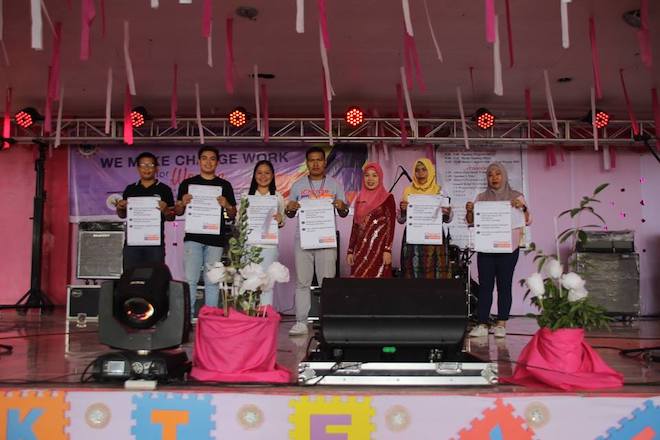
It is in this context that PLCPD, through the project Creating Spaces to Take Action on Violence against Women and Girls, launched the “iChange: vote against VAWG” campaign which aims to raise public awareness on the issue of VAWG in the country and to identify and develop potential policy champions among candidates. In this campaign, PLCPD specifically calls for the enactment of a law that will prohibit and criminalize the facilitation of child marriage in the country. Furthermore, PLCPD calls the attention of the candidates to adopt measures that will protect the rights of the women and girls, when elected.
iChange: Vote against VAWG embarked on a voters’ education series and concert tour. The first part is a voters’ education forum where stakeholders from different sectors discussed the impacts of VAWG and why it is important to end it. They also called on the candidates of the upcoming 2019 midterm elections to be champions of the rights of women and girls and to be one with the fight against all forms of VAWG. In return, some national candidates were present to share their platforms and to give their pledge of commitment in ending VAWG.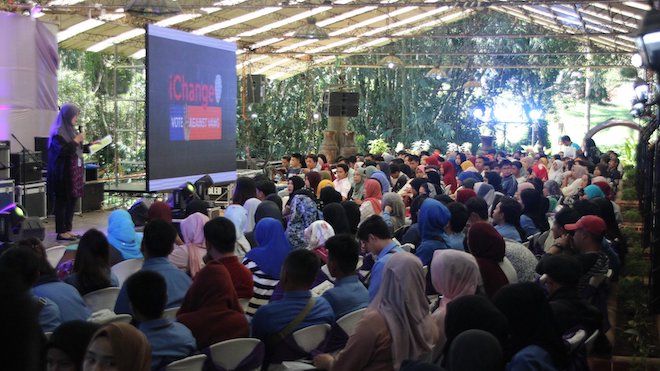
The second part showcases various progressive artists such as Tapati, Ja Quintana, Rom Dongeto, Kokoi Baldo, Jug Honeyluv, and Skarlet Brown who have shared their talents in a concert that aims to utilize the power of music as an effective platform in raising different societal issues. PLCPD also produced a music video for the campaign’s official theme song entitled “Ngayon ang Simula” written and composed by PLCPD’s executive director, Mr. Rom Dongeto..
After its launch in Quezon city, this campaign was brought to the provinces of Maguindanao, and Lanao del sur. This activity is part of a larger campaign entitled “iChange: vote for our future”, an issue-based campaign aimed to mainstream several human development issues and to influence the platforms of the candidates as well as the voting criteria of the voters.
VAWG is real. VAWG is a form of grave human rights violation. VAWG needs to be stopped. This May 2019, PLCPD calls on every voters not to forget to vote and to vote against VAWG! #EndVAWG #EndChildMarriage #iChangePH
[/toggle]
[toggle title=”iChange: Vote for a smoke-free Philippines goes to Albay” open=”true or false”]
March 12, 2019
100% smoke-free policy, higher taxes on cigarettes, regulation of e-cigarettes, and higher minimum age for buying and using cigarettes.
National and local candidates in the upcoming mid-term elections vowed to support the call of advocates for stricter tobacco control legislation during a voters’ education forum called iChange: Vote for a smoke-free Philippines held in Bicol College in Daraga, Albay.
Launched by the Philippine Legislators’ Committee on Population and Development (PLCPD) in time for the campaign season, the iChange: Vote for a smoke-free Philippines campaign aims to mainstream tobacco control as a right-to-health issue and call on both voters and candidates to include health among the primary considerations in the upcoming elections.
During the forum in Albay, Dr. Evy Sarmiento of the Department of Health-Region V discussed the burden of tobacco in the Philippines and in the Bicol Region, while Rep. Joey Salceda discussed local smoke-free policy, and advocates, including Action for Economic Reforms executive director Men Sta. Ana and Smoke-free Action Network founder Ms. Rose Olarte, talked about why tobacco control should be part of the national conversation during the election season.
“There is an overwhelming support for stricter tobacco control policies,” says PLCPD Advocacy Manager Au Quilala. During the campaign launch held in Manila in February, PLCPD and Pulse Asia presented the results of the nationwide survey conducted from January 26 to 31, 2019, which reveal that nine out of 10 adult Filipinos agree that smoking or the use of cigarettes in public places should be prohibited, and nine and out 10 adult Filipinos also agree to raising the minimum age for buying and using cigarettes from 18 to 25 years old.
“The results of this survey show that Filipinos, smokers and non-smokers alike, are aware of the dangers of using tobacco. The results are also an indication that it is time to introduce and discuss policy reforms that will make our tobacco control laws more health-oriented. May this pressing public health issue deeply penetrate into the national conversation and compel our next legislators and government officials to act,” Quilala added.
The iChange campaign calls on 2019 election candidates to support moves to amend the current Tobacco Regulation Act (Republic Act 9211), specifically to expand the definition of places where smoking is banned, raise the minimum age for buying and using cigarettes from 18 to 25 years old, and remove the tobacco industry from the Interagency Committee-Tobacco. Other reforms supported by advocates are the proposed increase in the tax imposed on tobacco products by at least P60 and banning or regulation of electronic cigarettes or vapes.
The iChange: Vote for a smoke-free Philippines campaign features a series of voters’ education forums and media events in vote-rich provinces in the Philippines, including Albay, Laguna, Iloilo, and Cebu. It also solicits commitments of candidates to support stricter tobacco control policies.
[/toggle]
[toggle title=”Advocates celebrate International Women’s Day with dialogue on women’s health, peace and development” open=”true or false”]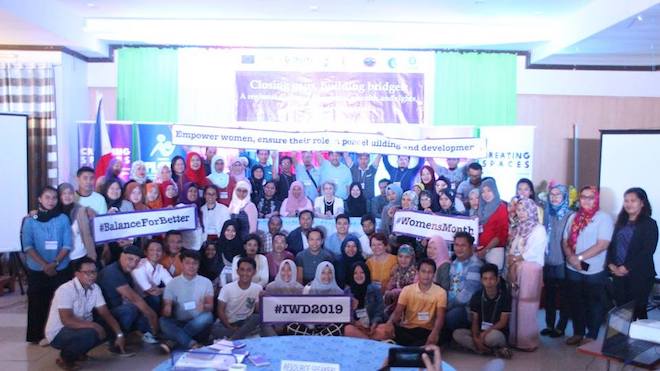
March 11, 2019
Empower women, ensure their participation in peacebuilding and development.
This was the call of the constituents, advocates, stakeholders, and participants from five provinces of ARMM that gathered together in the recently-concluded regional dialogue organized by the Philippine Legislators’ Committee on Population and Development (PLCPD).
The dialogue came after the historic ratification of the Bangsamoro Organic Law, creating the new Bangsamoro region. It is in this context that this dialogue discusses the crucial link between women empowerment and the realization of lasting peace in the region. It is comprised of three plenary sessions and one talk show that explored the interrelatedness on women’s health and rights, peace, and development.
Among the highlights of the dialogue is the discussion on the importance of fulfilling women’s rights in peacebuilding as well as in other issues confronting the region. Resource speakers coming from different groups and government agencies emphasized the need to adopt a gender-sensitive lens whenever tackling peace and security issues and the need to engage women in conflict situations as they are the ones who suffer the most in times of conflict.
“Women are burdened with caring for the rest of the family members, further making their reproductive role more burdensome,” said Ms. Noraida Abo of UNYPhil-Women.
In line with this, partners from the BARMM shared their experiences and best practices in providing sexual and reproductive health (SRH) services in the region especially in times of conflict. Some of these good practices include raising public awareness on issues such as family planning, SRH, and gender-based violence, distributing IEC materials, ensuring public participation, training and capacitating students and Muslim religious leaders as well as local health service providers, providing RH-related services, and establishing hotline numbers.
Moreover, in the context of the new Bangsamoro government, the panelists also touched upon the significance of this new government set-up in providing SRH-related services in the region and the opportunities that advocates can take advantage of in mainstreaming women’s rights and in ensuring that these rights are being upheld and respected.
“There is a provision in the BOL saying that there should be women’s representation in the decision-making and policy-determining bodies in the Bangsamoro government… and that there should be mechanisms for consultation with women and other marginalized groups,” said Hon. Raissa Jajurie of the Bangsamoro Transition Authority.
The panelists of the talk show, which included Rep. Teddy Baguilat, Atty. Ishak Mastura, and Ms. Akrima Arap, also reminded everyone the significance of this new government which could possibly be replicated by other regions as well as the challenges that may confront it as the transition moves forward. While being skeptical about the prospects of a federal set-up for the country, Rep. Baguilat mentioned that the developments that will happen in the region could provide support for or against President Duterte’s federalism proposal.
A plenary session was also held to discuss key issues concerning adolescent reproductive health and why investing in young people’s health is crucial in achieving development. Ms. Janette Dimakuta of DOH-BARMM presented some data on the situation of adolescents in the country and two youth leaders from Maguindanao and Lanao del Sur were present to provide their personal experiences on the issues confronting their peers and to forward their call against some practices like child labor and child marriage (CEFM) that hinder their genuine growth and development.
“We, the children, are too young to get married,” said Ms. Fatima Sugadol, a youth leader from Maguindanao.
Participants of the dialogue also identified key concerns in SRH and VAWG in their respective provinces and the actions that they can do to address them in a workshop session aimed to discuss possible scenarios after the ratification of BOL and to propose an action plan on mainstreaming women and girls’ rights in BARMM.
The regional dialogue concluded with a symbolic action in solidarity with the celebration of International Women’s Day.
PLCPD, together with its partners from ARCHES and Creating Spaces projects, organized a two-day dialogue themed “Closing gaps, building bridges: A regional dialogue on women’s health and rights, peace, and development”. It was held on March 7-8, 2019 in at the Em Manor Hotel, Cotabato City. This is the fourth installment in a five-dialogue series, each dialogue dedicated to discussing the most pressing issues affecting RH concerns at the time. The first two national dialogues, held in March and in August 2017, discussed roadblocks to the full implementation of the RH Law, including the legal battle for family planning, financing, and local capacities to implement the law, among others. In August 2018, the first of two regional dialogues to be held in the ARMM focused on best practices and success stories in implementing the law in the region, despite these challenges. A special session on adolescent reproductive health concerns, particularly child marriage, was for the first time convened among various sectors
This project is made possible by the support of the European Union, Oxfam Canada, Oxfam sa Pilipinas, and Global Affairs Canada.
[/toggle]
[toggle title=”Protecting women’s health and rights is crucial to peace and development – regional dialogue” open=”true or false”]
March 7, 2019
Since 2017, the Philippine Legislators’ Committee on Population and Development (PLCPD) and its partners in the Autonomous Region in Muslim Mindanao (ARMM) have organized three national and regional dialogues that provide a platform for duty-bearers and stakeholders to discuss issues and propose collective recommendations to contribute to the fulfilment of Filipinos’ sexual and reproductive health and rights (SRHR).
Now in its fourth installment, this dialogue brings together participants from five different provinces in the Bangsamoro region to explore the interrelatedness of fulfilling women’s health and rights, women empowerment and closing gender gaps, and the achievement of peace, security, and development.
The Reproductive Health Law is a landmark legislation that aims to protect the health and lives of mothers and their children through the provision of services and information on reproductive health, among others. However, hampered by challenges like legal barriers, lack of adequate funding and willingness of some LGUs to implement the law, and lack of public knowledge and awareness, the full implementation of the law has not yet been realized, more than six years after its enactment.
On the other hand, despite being one of the best performing countries in terms of gender equality due to the presence of various measures promoting it, violence against women and girls (VAWG) is still rampant and widely normalized in the Philippines until today. Child marriage, for instance, is one example of this problem present in the country that compromises the safety and development of its women and girls.
Given these formidable challenges, PLCPD optimistically views the recent ratification of the Bangsamoro Organic Law as a milestone event and an opportunity to advance its advocacies specifically on gender equality and women’s health and rights in the newly-formed transitional government. It is an opportune moment for the advocates to accelerate the implementation of existing policies and to explore possible programs and policies that would potentially address the issues concerning SRHR and gender inequality. In line with that, PLCPD calls for the transitional government to uphold rights of the women and to provide equal opportunity for them as the persistence of gender gaps may detrimentally affect the efforts to achieve peace, security and development.
The dialogue also coincides with the celebration of International Women’s Day. PLCPD, through this dialogue, hopes to explore the crucial link between women empowerment and the achievement of lasting peace in the region. Many studies have shown that participation of women in conflict resolution increases the probability of a lasting peace agreement. International instruments have also recognized and reaffirmed the important role of women in these peace processes.
This dialogue aims to produce a call to action for complementing national-level advocacy and for advancing relevant legislation at the regional level and an action plan for mainstreaming women and girls’ rights and reproductive health in the BARMM which advocates can use as guides in collectively pushing for the advancement of their goals.
It is hoped that stakeholders will be given a platform to present the agenda to the BARMM and that the output can effectively be transmitted to the region’s newly-appointed leaders and be converted to concrete policies and programs. Working together, advocates and leaders can come up with measures to achieve full realization of SRHR of all and to eliminate of all forms of violence against women and girls, and consequently, to achieve lasting peace and development in the region.
[/toggle]
[toggle title=”9 out of 10 Pinoys want smoking in public places prohibited” open=”true or false”]
28 February 2019—Nine out of 10 adult Filipinos agree that smoking or the use of cigarettes in public places should be prohibited.
This is according to the results of a national survey on smoking conducted by Pulse Asia from January 26 to 31.
Presented during the launch of “iChange: Vote for a smoke-free Philippines,” an electoral campaign led by the Philippine Legislators’ Committee on Population and Development (PLCPD), the results of the nationwide survey also reveal that nine out of 10 Filipinos agree that the minimum age of those allowed to buy and use cigarettes should be raised from 18 to 25 years old.
“The results of this survey show that the Filipino public is very open and receptive to essential legislative reforms that can be done as regards tobacco control. May this piece of information have a deep impact on candidates for the 2019 midterm polls, for them to resolutely pursue measures that will contribute to a smoke-free Philippines,” said PLCPD Executive Director Romeo Dongeto.
1 in 4 Pinoys are smokers
The Pulse Asia survey also reveals that while almost 8 out of 10 Filipinos (76%) aged 18 years and above say they do not use tobacco, with 62% saying that they never used tobacco in their life, almost one in four Filipinos aged 18 years and above (24%) use tobacco, with 19% saying they are daily tobacco smokers.
“These figures show how deep the smoking problem is rooted in Philippine society. Despite recent strides our nation has taken to control tobacco use, we still have a long way to go. That is why we are launching the iChange campaign, a drive we are pursuing in time for the election season, with the specific goal of making this issue be at the forefront of electoral debates and garner support from incoming elected officials towards crafting and enacting stricter laws on tobacco control,” Dongeto explained.
Present during the launch of the iChange campaign were Dr. Charl Andrew Bautista of the Department of Health, who discussed the burden of tobacco use on Filipino health, and several other advocates from HealthJustice, Southeast Asia Tobacco Control Alliance, Social Watch Philippines, and Youth for Sin Tax. The groups highlighted the policy reforms needed by the country and why it is important to talk about tobacco control during the election period.
“The election period is what we call the noon for public clamor, as we all know that candidates running for public office are most receptive to public opinion during this period. That’s why advocates need to sound the alarms on tobacco use even louder at this moment in time. We also hope that voters will consider important issues such as health in making the important decision of choosing whom to vote,” Dongeto stressed.
The iChange campaign called on 2019 election candidates to support moves to amend the current Tobacco Regulation Act (Republic Act 9211), to expand the definition of places where smoking is banned, raise the minimum age for buying and using cigarettes from 18 to 25 years old, and increase the tax imposed on tobacco products by at least P60 to make cigarette prices prohibitive and to generate revenue to support the government’s universal healthcare program.
“Evidence of overwhelming public support for these amendments is here. Nine out of 10 Filipinos agree to stricter tobacco control laws. May this pressing public health issue deeply penetrate into the national conversation and compel our next legislators and government officials to act,” Dongeto concluded.
After the launch on February 28, the iChange: Vote for a smoke-free Philippines campaign will hold a series of media events and voters’ education forums in Laguna, Albay, Cebu City, and Iloilo City.
[/toggle]
[toggle title=”JOB ANNOUNCEMENT: Advocacy and Partnerships Officer” open=”true or false”]
Date of posting: 13 February 2019
The Philippine Legislators’ Committee on Population and Development Foundation, Inc. (PLCPD) is looking for an individual who is interested to work full time as advocacy and partnerships officer. The advocacy and partnerships officer will be assigned to handle advocacy for multiple issues related to human development, particularly on promoting a smoke-free environment and health, rural development, children’s rights, and gender equality. Experience in and passion for advocacy work is required.
Interested applicants may send their CV and letter of application addressed to Mr. Romeo Dongeto, executive director, to plcpdfound@plcpd.org.ph (cc: nenitadalde@plcpd.org.ph).
Main Functions:
- Implements advocacy activities and ensures completion of project deliverables
- Develops and implements a legislative advocacy plan for the assigned issues
- Develops and builds issue champions among PLCPD and non-PLCPD members
- Renders efficient technical support and mobilize legislators in advocacy activities
- Builds and sustains partnerships with civil society stakeholders, legislative committees, executive agencies and international development agencies
- Monitors the movement and support for the assigned bills
- Participates in technical working groups and conducts quick political mapping on priority measures
- Develops advocacy messages and writes press releases, position papers, and policy memos for legislators
- Participates in defining research objectives and contributes in project development and institutional sustainability including writing of project proposals and participation to fundraising activities
- Generates activity and project reports.
Skills and Competencies:
- At least two (2) years experience in policy advocacy work
- Strong interpersonal and networking skills
- Excellent written and verbal communication skills
[/toggle]
[toggle title=”JOB ANNOUNCEMENT: Media and Communications Officer (for urgent hiring)” open=”true or false”]
Date of posting: 13 February 2019
Deadline of application: 23 February 2019
The Philippine Legislators’ Committee on Population and Development Foundation, Inc. (PLCPD), a non-government advocacy organization composed of national legislators, is looking for a highly committed individual to fill the position of Media and Communications Officer.
The primary tasks of the Media and Communications Officer are the following:
- development and implementation of information and media campaign plan for legislative advocacies of the institution,
- coordination and networking with media organizations and individuals,
- development of media releases and statements for the organization’s priority issues and advocacy campaigns,
- person-to-person advocacy and provision of technical assistance to PLCPD members and policy champions on matters related to media advocacy,
- assistance in or management of high-impact and creative advocacy activities of the organization, and
- management/implementation of short-term and strategic communication projects and activities of the institution.
Qualifications:
- graduate of Development Communication, Communication Arts, Journalism, or any Social Science course
- has excellent interpersonal skills
- familiar with writing basic media releases (advisory, press briefer, press release)
- proficient in oral and written communications in both English and Filipino
- preferably known in the media circuit or has links with media
- at least two years of experience related to media work
- computer literate
Interested parties may send their letter of application and curriculum vitae until 23 February 2019 (Friday) to: Mr. Romeo C. Dongeto, Executive Director
Email: plcpdfound@plcpd.org.ph (copy: comres@plcpd.org.ph)
Here is the detailed job description and competency requirements for the position.
Shortlisted applicants will be notified by 26 February 2019.
[/toggle]
[toggle title=”STATEMENT: Lowering the minimum age of criminal responsibility against the best interest of Filipino children” open=”true or false”]
January 23, 2019
On January 23, the House of Representatives overwhelmingly and hastily approved a bill that lowers that minimum age of criminal responsibility (MACR) from 15 to 12 years old, amending the current Republic Act 9344 or the Juvenile Justice and Welfare Act of 2006 (JJWA). Senate is expected to also approve of its version soon. The bill is yet another attempt of Congress, under the leadership of Gloria Arroyo and Tito Sotto, and the Duterte Administration to revert all the positive gains under the JJWA and to trample on the rights of the children, the very sector it vows to protect.
Proponents of the bill claim that the proposed law aims to address the problem of children being used by criminal and drug syndicates to carry out criminal activities. Under this bill, children from ages 12 to 18 who commit serious crimes like murder, homicide, rape and violations of the Comprehensive Dangerous Drugs Act of 2002 will be sent to reformative institutions called “Bahay Pag-asa.”
International and local groups and organizations advocating for the rights of the children have already expressed their disappointment and fierce opposition to the proposed law, calling it an act of violence against children. Advocates have also expressed their concern on the severe conditions of youth care facilities around the country and their doubt that these could adequately and effectively cater to the needs of the children in conflict with the law (CICL).
The Child Rights Network (CRN) firmly believes that lowering the MACR goes against the best interest of Filipino children. It is not the solution to both the problems of children being involved in and children being used for criminal activities. This proposed measure is anti-poor, anti-human rights, and anti-children. Apart from being plainly absurd, this measure is also unfounded, misguided, and uncalled for. Data from the Philippine National Police show that only 1.72% of reported crimes are committed by children. Furthermore, subjecting these children to the country’s flawed justice system and to the arduous judicial process is utterly inhumane and would traumatize them for the rest of their lives. These children are already victims of the harsh environment and society that they live in. Approving this proposed law will just further victimize them as they would be dehumanized and stigmatized, impeding their rights to survival and development opportunities.
A great deal of studies have shown that criminalizing children leads to recidivism. Detention and/or incarceration of children have also been linked to adverse effects on a child’s mental, physical and emotional development, as they are likely to be subjected to discrimination and abuse while detained. Furthermore, jailing children deny them of opportunities for advancement through education, and future employment. The proposals to lower the minimum age of criminal responsibility also ignore scientific evidence that a child’s brain is still structurally and functionally immature and that the brain reaches full maturity at the age of 25.
The Child Rights Network, together with other child’s rights advocacy groups, vehemently opposes the bill and reiterates its call to retain the current MACR. Rather than lowering it, the government should instead focus on strengthening the implementation of the JJWA and on improving the facilities for children in conflict with the law. CRN further believes that rehabilitation is still the more effective and sound solution to the increasing number of child offenders. Evidence shows that these measures are effective in restoring and reintegrating children to the community, as documented by child rights advocates.
CRN also calls on all legislators to address the root causes of the problem instead of targeting the children.
Finally, CRN enjoins everyone to remain vigilant with all the development in the proposed law and to strongly resist all attacks against the rights of the children.
Children are not criminals. The real criminals are those who use and exploit the children to engage in criminal activities. The real criminals are those in the government who blatantly disregard and step on the rights of children in exchange of political gains. These are the real criminals that should be punished and be put in jail.
[/toggle]

